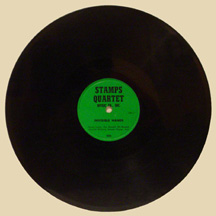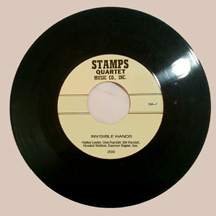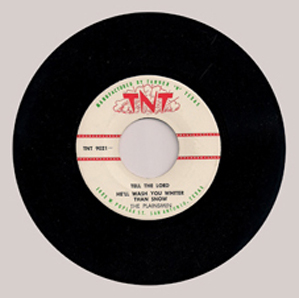| text
text |
|
NOTE: this site contains a large number of photos. For best viewing results allow a moment for the photos to fully open before scrolling down the page |
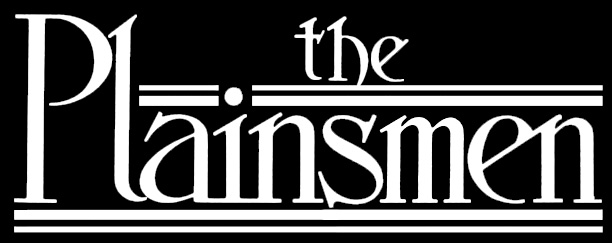
|
a history compiled by
Ernie Couch & Jason Couch |
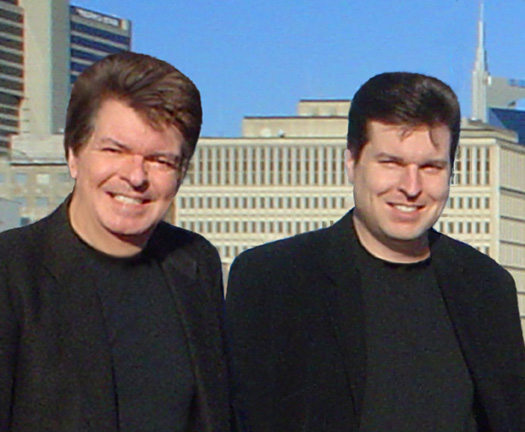
|
Ernie Couch • Jason Couch
You may learn more about Ernie and Jason at... www.erniecouchandrevival.comu |
| INTRODUCTION |
|
XXXXMusic history, like all history, becomes lost history unless chronicled and preserved in some manner. Having both been a part of the Plainsmen, Jason and I determined a need to create an in-depth look at one of the great gospel quartets of the twentieth century. This telling is sprinkled with our personal reminiscing, anecdotes, and observations, along with materials gleaned from numerous interviews with former group members, their families, friends and fans. The visual elements contain herein have been drawn from a wealth of sources, with much having come from Jason’s own extensive collection of gospel music memorabilia. All such elements are presented under the fair use clause of the copyright codes for educational purposes only. In addition, we have compiled the most comprehensive discography ever assembled with regard to the recordings of the group. Our thanks to the many who have contributed their time, and memories, to this retrospective of the Plainsmen.
|
| BEGINNINGS |
|
XXXX The Plainsmen Quartet did not just miraculously spring out of the sod of central Texas. As with all things, there was a process, a heritage, a collection of events from which the group came into existence. In 1902 the principal of the public school in the small community of Elkmont Springs, Tennessee resigned his position, loaded up his wife and two young children, and moved to Lawrenceburg, Tennessee, seat of the adjoining county. There he open the self-named, James D. Vaughan Publishing Company, to pursue his longtime dream of being able to publish gospel music songbooks. Little did he know the impact that his entrepreneurial leap of faith would have on the creation of a major music genre. Throughout his life, this devout christian man would remain a wellspring of creativity and innovative ideas in the promotion of the Gospel through music.
XXXX In 1910, with the publishing company seeing moderate success, James David Vaughan, hit on an idea that within one year would double his songbook sales. His new marketing plan was built around putting together a male quartet, the first commercial gospel quartet, and using it as a promotional vehicle for his products. He reasoned that people would hear the songs, like the songs, and therefore buy the songs, and he was correct. The era of gospel quartets was born. XXXX People who can not read, do not buy books. It was only logical that having more people who were able to read music would directly translate into more songbook sales. Based on that premise, in 1911 the Vaughan School of Music was formed and was soon sending instructors throughout the region to conduct singing schools. |
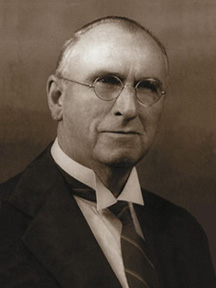
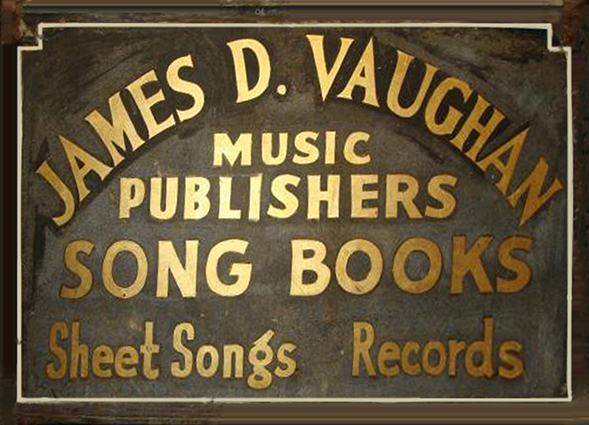
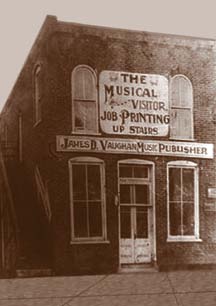
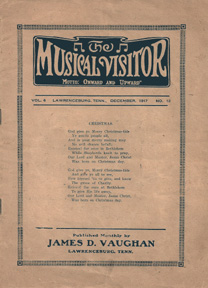
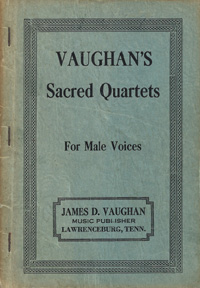
|
James D. Vaughan • Vaughan music sign • The Vaughan headquarters - c.1912-14 • The Musical Visitor, Dec. 1917 • Vaughan songbook - mid-1930s
|
|
XXXX1912 the Vaughan company began publication of a magazine, The Musical Visitor, that within a couple of years was renamed The Vaughan Family Visitor. The popular monthly touted the positive benefits of gospel music, christian values, and strong family ties. 1921 brought the formation of Vaughan Phonograph Records featuring the Vaughan Quartet, and making the group the first gospel quartet to be commercially recorded and marketed. Within the next five years the Vaughan organization would have sixteen salaried quartets on the road promoting the company’s products.
XXXXAlways the innovator and consummate promoter, James D. Vaughan became interested in a new communication system that was coming to national attention. In the late fall of 1922 Vaughan went on the airwaves with WOAN, the first radio station in Tennessee. With each component complementing the other, the Vaughan company had become a marketing phenomenon. |
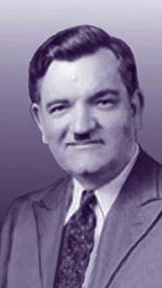
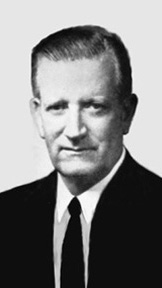
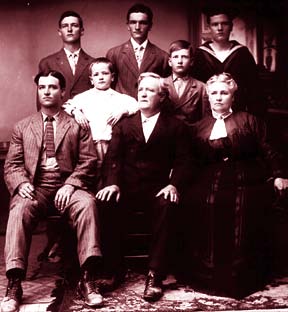
|
Virgil Oliver Stamps • Frank Howard Stamps • Stamps family portrait - V.O. (upper right) Frank (right center)
|
|
XXXXIn the mid-teens two brothers, Virgil Oliver Stamps and Frank Howard Stamps from East Texas, came to Lawrenceburg, Tennessee to attend the Vaughan School of Music, or the Vaughan Conservatory as it had become known. The brothers were from a family of six boys. Like V.O. and Frank, a younger brother, Fred, had shown an interest in music, but had felt a calling into a solo singing career, working in churches as a music evangelist. It was told that at his first church concert the preacher absconded with all of the money. In good Texas style, Fred hunted down the scoundrel and gave him a proper thrashing. Apparently the Stamps boys were not to be trifled with.
XXXXV.O. Stamps was a big Texan standing six foot, four inches, and weighing-in at two hundred and fifty pounds, with an outgoing personality to match his size, but at times he could be a bit fiery. Frank Stamps was tall and lanky, but with a quieter disposition, who had aspirations of pursuing a vocation as a lawyer. V.O. soon became an integral part of the he Vaughan organization. With the rapid growth of the company, branch offices were opened in South Carolina, Arkansas, Mississippi and Texas. V.O. Stamps was put in charge of the Jacksonville, Texas office, and Frank became manager of the two Texas based Vaughan company quartets, and served as bass singer with one of the groups. |

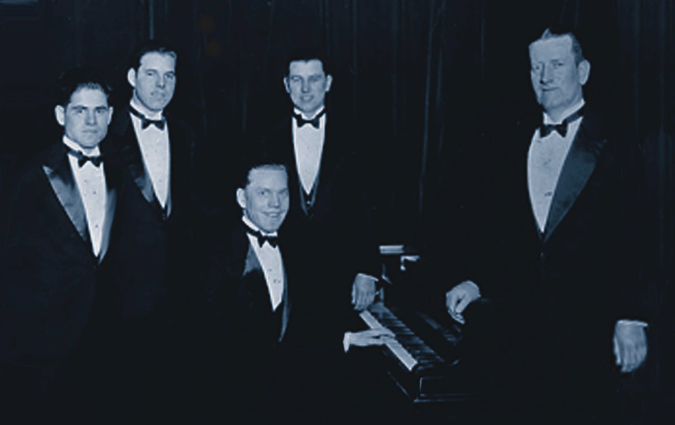
|
V.O. Stamps Music Company's first songbook, published in Jacksonville, TX in 1925, featuring the Stamps Quartet's signature theme song, "Give The World A Smile Each Day," and J. (Johnny) B.F. Wright's now classic, "Precious Memories." • Frank Stamps Quartet in 1927 (standing l to r) Palmer Wheeler - Roy Wheeler - Odis Echols - Frank Stamps (seated at piano) Dwight Brock
|
|
XXXXThe Stamps brothers split with the Vaughan company in 1924 with the opening of the V.O. Stamps Music Company in Jacksonville, Texas, with Frank Stamps drawing off Vaughan singers to form the first Stamps Quartet. V.O. Stamps’ new music company suffering from under capitalizaton, and with the Stamps Quartet having disbanded, took in Jesse Randall “J.R.” Baxter, Jr., as a partner in 1926. J. R. Baxter had been managing a branch office in Texarkana, Texas for another music publisher, the A. J. Showalter Company of Dalton, Georgia. Among his many compositions, A. J. Showalter wrote the music to the familiar hymn, "Leaning On The Everlasting Arms." The infusion of working capital, in the form of a one thousand dollar investment loan, in exchange for company stock, brought about a rapid reversal of fortune to V.O. Stamps' struggling business. Soon the renamed, Stamps-Baxter Music Company was financially solvent, and the reformed Stamps Quartet, under Frank Stamps’ management, was back on the road. By 1929 the publishing company had relocated its main headquarters to Dallas, Texas, with J. R. Baxter, Jr. overseeing a branch office in Chattanooga, Tennessee. In 1930, Luther G. Presley joined the Stamps-Baxter organization, and opened an additional branch office in his home in Pangburn, Arkansas. Luther had work with other music publishers, and was a prolific song writer. Before the decade was finished, he and V.O. Stamps would collaborate to create the classic song, "When The Saints Go Marching In." Around 1931, then thirty-four year old Frank met, and soon married, seventeen year old Naomi Marks, who has been described as possessing a “movie star beauty.” This would be Frank's second marriage. Naomi was a gifted piano player and composer. Frank decided that Naomi needed a proper stage name, and dubbed her, Sally. For a time Frank and his new bride, Sally, oversaw the company’s printing in the Dallas suburb of Oak Cliff. The couple would soon relocate to New Mexico and later spend six years in North Carolina.
|
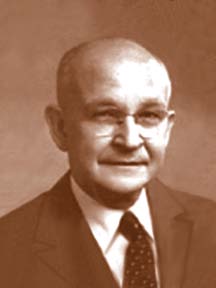
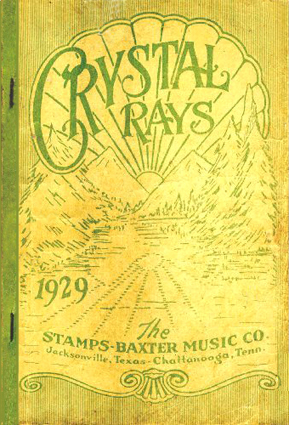
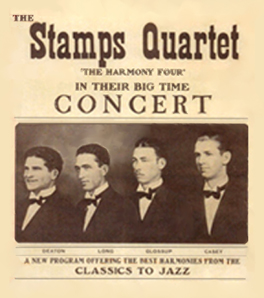
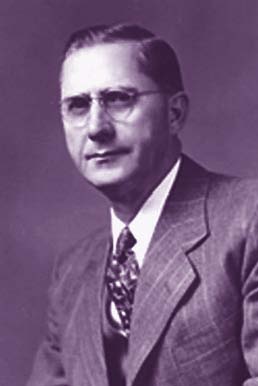
|
J. R. Baxter, Jr. • Stamps-Baxter songbook from 1929 • One of several Stamps Quartet configurations to take the stage in the last half of the 1920s - (l to r) Otis Deaton, who wrote the lyrics to, "Give The World A Smile Each Day," Henry Long, Edgar Dillard Glosup, a.k.a. Eddie Dean, singing cowboy in B-westerns of the 1940s, and Theo Casey • Luther G. Presley
|
|
XXXXIn spite of the Great Depression, during the early 1930s the Stamps-Baxter company saw much success, based on the business system pioneered by James D. Vaughan, and taken to new heights by V.O. Stamps’ promotional skills and J. R. Baxter, Jr’s business savvy. The two men were a classic example of, “opposites attract.” V.O. was one of those in your face, high energy individuals who loved doing the grip and grin, and who loved making projects happen. Mr. Baxter, on the other hand, did not like quartets, nor care for any of the publicity that greased the industry. He was quite content to sit behind his desk and compose songs, when not supervising the day-to-day office tasks.
XXXX1936 brought a move for the Stamps-Baxter company to larger facilities, including a greatly expanded, combination printing and binding plant. During the same year, the company began a long-running relationship with the Dallas radio station KRLD, that introduced the company’s products, and quartets, to an even greater audience. Soon V.O. Stamps signed an agreement with the Mexican “border-blaster” radio station XERA, and suddenly, via the air waves, gospel music was blanketing most of North America. It should be noted that XERA was controlled, through a Mexican broadcasting company, by the famous, or infamous, Dr. John R. Binkley, who became internationally known for his dubious “goat gland” implantation procedures of the 1920s and 1930s. XERA was a re-licensing of Binkley’s XER, with studios, transmitter, and broadcasting towers in Villa Acuna, now Ciudad Acuna, across the border from Del Rio, Texas. At its peak the station boasted a one-million-watt transmiter,and a directional antenna that saturated the air waves of all points north. It billed itself as, “the most powerful broadcasting station in the world,” and it was said that when atmospheric conditions were just right the station could be picked-up as far away as Finland. The station not only presented Dr. Brinkley’s medical flimflam to the world, but also introduced much of the planet to early country, western, hillbilly, and gospel music. |
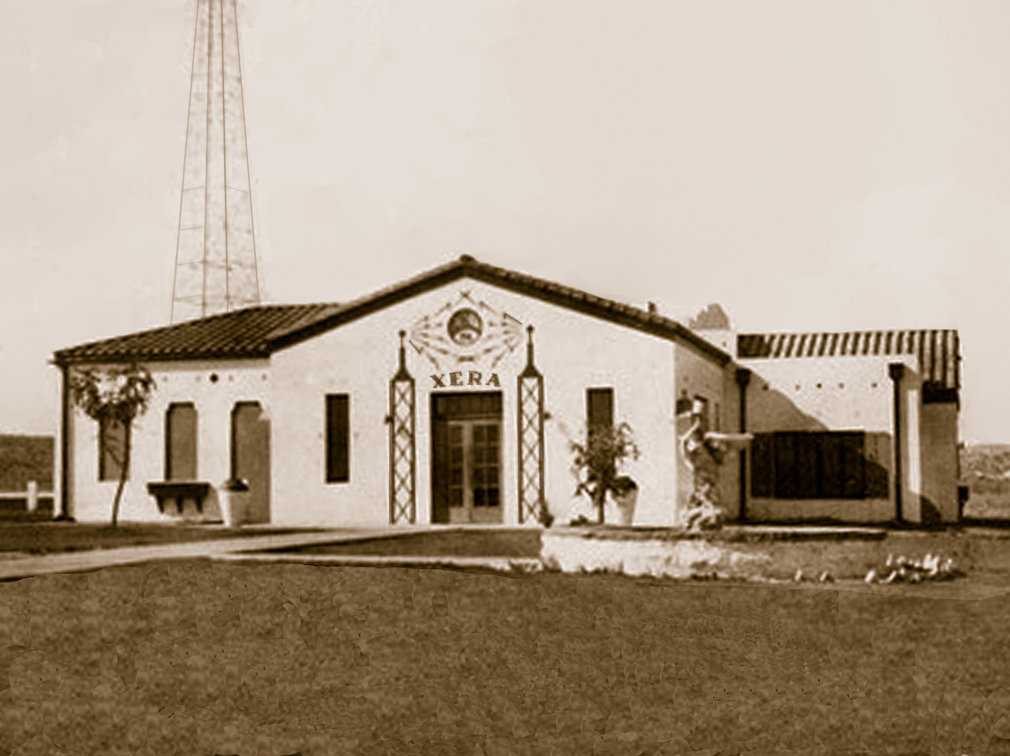
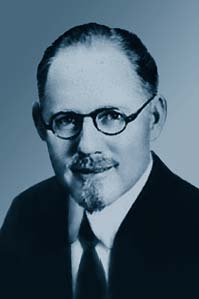
|
XERA radio station in Mexico, across the border from Del Rio, Texas • Dr. John Romulus Binkley
|
|
XXXXAs had been the case with the Vaughan company fielding numerous promotional quartets, likewise, many groups would bear the Stamps name as part of their moniker. There was a great deal of sibling rivalry between the two Stamps brothers, that eventually led to litigations over who owned the rights to the Stamps name for commerical ventures. For over two decades, the on-going rivalry would directly and indirectly contributed to the naming and re-naming of “Stamps” quartets. Through the years groups with such names as Stamps Quartet, Frank Stamps’ Quartet, V.O. Stamps’ Quartet, Stamps-Ozark Quartet, Frank Stamps’ All-Star Quartet, Stamps Harmony Boys Quartet, Harley Lester-Stamps Quartet, Smile-A-While Stamps Quartet, The Original Stamps Quartet, Stamps True Tone Quartet, Stamps Friendly Five, plus several groups bearing Stamps-Baxter as part of their title, would all take the stage.
XXXXWith the sudden death of V.O. Stamps, at age forty-eight in 1940, Frank Stamps returned to Dallas. He entered into a partnership with J.R. Baxter, Jr., and assumed his brothers company duties. At the same time Frank left his All-Star Quartet to become a part of the group V.O. had been working with called, The Old Original Stamps Quartet. With the coming of World War II, many of the Stamps-Baxter related quartets were disbanded with members being drawn into the military and into defense work. With the end of the war, also came the end of Frank Stamps’ and J.R. Baxter, Jr.’s partnership. Frank opened his own music publishing enterprise, the Stamps Quartet Music Company, as a major competitor to, and within a block of, the Stamps-Baxter organization. Following the time-proven business models of Vaughn and Stamps-Baxter, Frank Stamps built his new publishing company on promotional singing schools, and quartets, including his new company Stamps Quartet. |
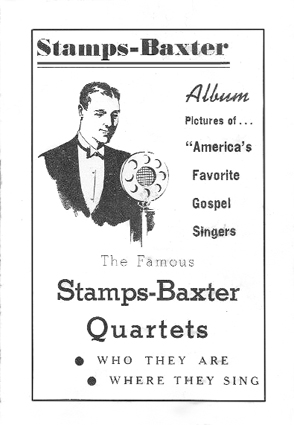
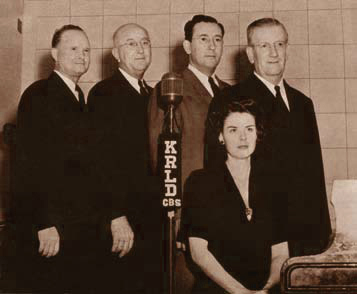
|
Cover of 1940 Stamps-Baxter promotional piece that showed the various company affilated quartets • A version of the Stamps Quartet from c. 1945. Photo taken at the KRLD studios in Dallas, Texas (r to l) Walter Rippetoe, Bob Bacon, Wilkin Bacon, Frank Stamps, with Sally Stamps seated at the piano.
|
|
XXXXFrank Stamps left the Stamps Quartet as a singing member in 1950, but continued for a short time to serve as emcee, and manager of the group. Soon, Harley Lester, who had holdings in the Stamps Quarter Music Company, stepped-in as an active group member, and as manager. This version of the Stamps Quartet was billed as, and shown on recordings as, the Harley Lester Stamps Quartet.
XXXXIn 1952, a twenty-one-year-old redheaded Okie piano player, named Easmon Napier, joined the Stamps organization in Dallas, Texas to work with the Harley Lester Stamps Quartet. Easmon Lloyd Napier had been born on June 29, 1931 in Tuskohoma, Oklahoma. At a very early age, Easmon had shown interest in the piano. When he was age ten, Easmon’s parents, Lonnie and Vallie Napier, sent him to the Hartford Normal School of Music, in Hot Springs, Arkansas. The Hartford Music Company headquartered in Little Rock, Arkansas, was a competitor of Vaughan and Stamp-Baxter publishing enterprises. The company had evolved out of the Central Music Company of Hartford, Arkansas in 1918 and was headed by Eugene Monroe “E.M.” Bartlett, who is best remembered for his classic gospel composition, “Victory In Jesus.” By age fourteen Easmon was teaching for the Hartford organization. |

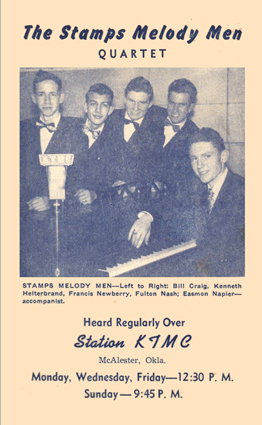

|
Teenager, Easmon Napier, at the piano in the KNED radio station studio in McAlester, OK, with the McDonald Brothers Quartet • Promotional piece for the Stamps Melody Men on KTMC in McAlester,OK (l to r) Bill Craig, Kenneth Helterbrand, Francis Newberry, Fulton Nash, Easmon Napier • All-American Quartet (top l to r) Don Randall, lead - Gordon Hill, bass, - R.C. Melton, baritone & group owner (bottom l to r) Easmon Napier, pianist - Vernon Bright, tenor - early 1952
|
|
XXXXEasmon was a great teller of stories. Through the years his dry wit endeared him to audiences across the country. On the subject of his growing up in the Kiamici Mountains of southeast Oklahoma, Easmon said the boys he ran with often got around via horse back. One day it was decided that they would swim their horses across the Kiamici River. For the most part, horses are pretty good swimmers, it seems to be a natural survival trait. The riders turned their mounts into the river and as the water rose to the horses’ flanks and then to their backs Easmon discovered his nag was, as he put it, “a bottom-walker.” He said that while the other boys’ ponies went into a natural horse-paddle, transporting both themselves and their passengers across the river, his horse chose to take in a giant gulp of air, go to the bottom, and walk across the river bed. When the horse would run out of air, it would surface, gulp in another giant breath of air, dive back to the bottom, and continue its journey. Easmon said that the horse’s gulp, dive, walk, gulp, dive, walk antics seemed to work just fine for the pony, but as the rider, he was almost drowned.
XXXXEasmon continued his music training during his teen years by attending the Stamps-Baxter School of Music, and working out of McAlester, Oklahoma with such groups as the McDonald Brothers Quartet, and the Stamps Melody Men. Both groups had programs on local radio stations. In early 1952, Easmon joined the newly relocated All-American Quartet working out of Decatur, Illinois, replacing Elmer Childress who had served as the group's pianist in 1948-49 and again in 1950-51. Elmer had left the All-American Quartet to play for the Stamps Quartet in Dallas. In additon to Easmon Napier, the All-American Quartet was sporting a new tenor, Bill Shaw, who within months would be called on to become a member of the Blackwood Brothers Quartet, a relationship that would last for many years. XXXXKeeping a group going can be challenging, and the All-American Quartet was no exception. Easmon said the quartet was down on its luck. Bookings were nearly non-existent and the group was just about to starve-out. Finally, after a three-month dry spell, they received a call to play a municipal auditorium in a fair sized city for a decent flat. Needless to say, the group was ecstatic. Things were looking up. Filled with exuberance they decided to roll into town a little early on the afternoon of the scheduled evening concert to check out the facility. He said the group rounded the corner of the downtown block that contained the auditorium only to find their way barred by fire trucks. The auditorium had burned down. Before 1952 passed, Easmon received and accepted an offer to become a member of the Harley Lester Stamps Quartet, in Dallas, Texas, replacing Elmer Childress on piano. |
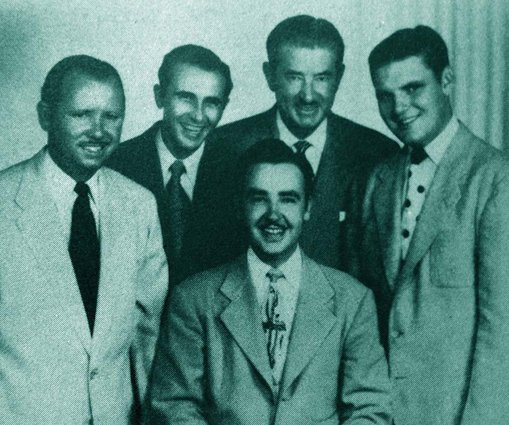
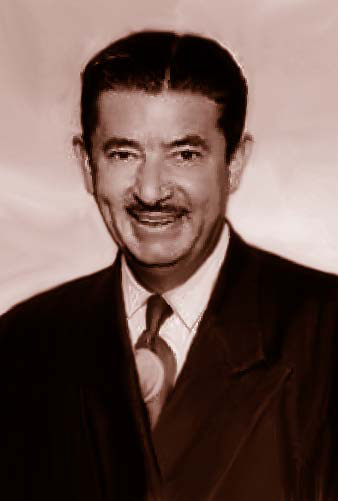
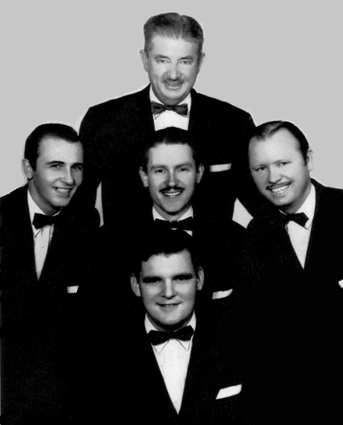
|
The Harley Lester Stamps Quartet in 1951 with piano player Elmer Childress (seated) and new group member, Howard Welborn (standing second from left) • Harley Lester, bass singer and part-owner in the Stamps Quartet Music Company • One of the 1952 line-ups of the Harley Lester Stamps Quartet (standing) Harley Lester (middle row l to r) Howard Welborn - Easmon Napier - James Barnett (bottom) Bennie Dugger
|
|
XXXXBy 1954, the Stamps Quartet, still recording under the Harley Lester Stamps Quartet name, consisted of, Easmon Napier on piano, Don Randall, lead; Howard Welborn, tenor; Harley Lester, bass / manager; and Bill Randall, baritone. William Thomas “Bill” Randall had been born in Grover, North Carolina on March 23, 1925. After having served four years in the Army during World War II, Bill had attended the Stamps-Baxter School of Music in Dallas, under the G.I. Bill. In 1949 he became a member of the Stamps All-Star Quartet where he remained until 1951 when he moved to the Imperial Quartet, not to be confussed with the Imperials, Jake Hess, formed in the early 1960s. In 1954, Bill joined the Harley Lester Stamps Quartet / Stamps Quartet. Along with Easmon Napier, and Howard Welborn, Bill would be one of the group’s members to make the transition to the Plainsmen. In later years Bill worked with the Bibletones in Gulfport, Mississippi. It should be noted that during the early 1950s, the Harley Lester Stamps Quartet had James Barnett, and Bennie Dugger as members of the group. James Barnett appeared on some the group's recordings .
XXXXHoward Welborn was born in Gainesville, Georgia on March 16, 1929. Some of his early music education had been under the tutelage of the great LeRoy Abernathy. Howard sang with his two sisters as the Welborn trio, but in 1951 he relocated to Texas to become a part of the Stamps All-Star Quartet and then worked with the Harley Lester Stamps Quartet / Stamps Quartet. XXXXThe music publishing industry was changing. Convention style songbook sales were declining as record and sheet music sales were increasing. Aware of the winds of change, Frank Stamps started evaluating the direction he wanted to point the company. 1955 marked more change in the Stamps Quartet. Harley Lester leaves the group, and is replaced by Don Taylor singing bass. Don Taylor's stay is brief and is soon replaced by Joe B. Davis. Don Randall also leaves the group and is replaced by Jack Mainord. By the fall of '55 the new lineup was comprised of Easmon Napier, on piano, and serving as emcee; Howard Welborn, tenor; Jack Mainord, lead; Bill Randall, baritone; and Joe B. Davis, bass. |
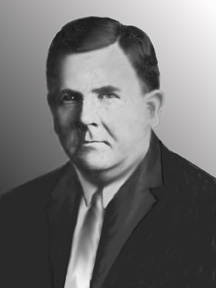
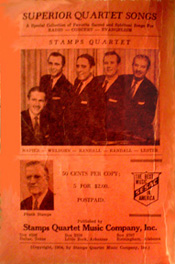
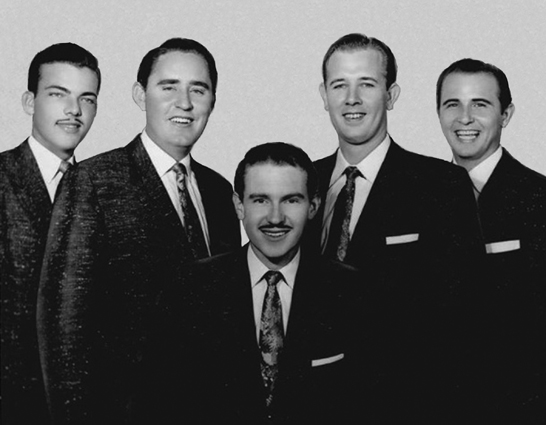
|
Eugene Monroe Bartlett • Inside front cover of 1954 Stamps Quartet Music Co. songbook showing Stamps Quartet line-up (l to r) Easmon Napier - Howard Welborn - Bill Randall - Don Randall - Harley Lester • Personnel of the Stamps Quartet with Don Taylor on bass, following Harley Lester's leaving. - c. early 1955 (l to r) Don Taylor - Bill Randall - Easmon Napier - Don Randall - Howard Welborn
|
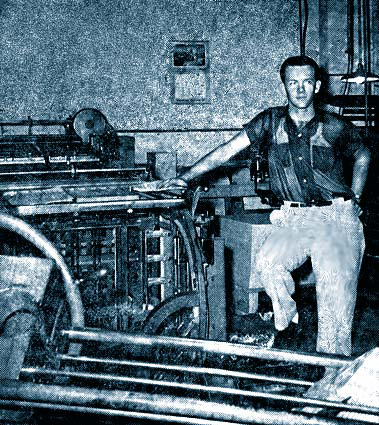
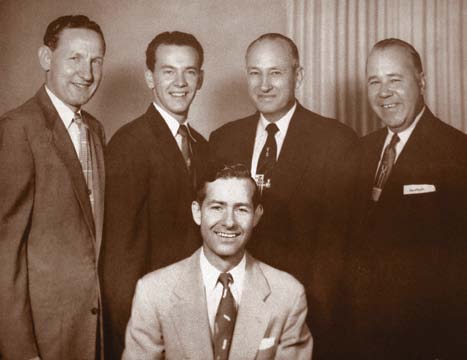
|
Jack Mainord working in the bindery at Stamps Quartet Music Company in Dallas, TX, 1955 • Jack Mainord during his brief stay with the Stamps Harmony Five in late summer, 1955 (standing l to r) Loy Hooker - Jack Mainord - Romy Grissom - Jimmie Grisham, (seated) Harvey Shelton
|
|
XXXXCordell Jack Lee Mainord was born to Riley and Pearl Mainord in Marshall, Arkansas on March 27, 1935. He was given the “Cordell” portion of his name in honor of Cordell Hull who was the U.S. secretary of state at the time of Jack’s birth. Secretary Hull who later was awarded a Nobel peace prize, and recognized as the father of the United Nations, was kin on Jack’s, mama’s side of the family. Jack came from a musically inclined family, his father having taught music and singing schools throughout the state of Arkansas. In the summer of 1955, Jack went to Dallas, Texas to attend the Stamps Quartet School of Music. Jack’s son, Mark, shared with me a postcard, postmarked July 13th, 1955, that his father sent to his parents back in Marshall, Arkansas. The note on the back of the card read, “Dear Folks, I am feeling fine and made the trip O.K. I am talking voice, harmony, composition, rudiments, etc. But I tried to tell you that I didn’t get enough money - please send me forty dollars quick - I will pay you back. I will write again - bye Jack.” Ah, the realities of big city life. Following the school term, Jack stayed in Texas, taking a job in the facility where the Stamps songbooks were being printed and bound. It may have had something to do with paying back the forty dollars. During that time, Jack briefly sang lead with the Stamps Harmony Five, but with the coming of fall also came a call to fill the lead position with the Stamps Quartet left by the leaving of Don Randall.
|

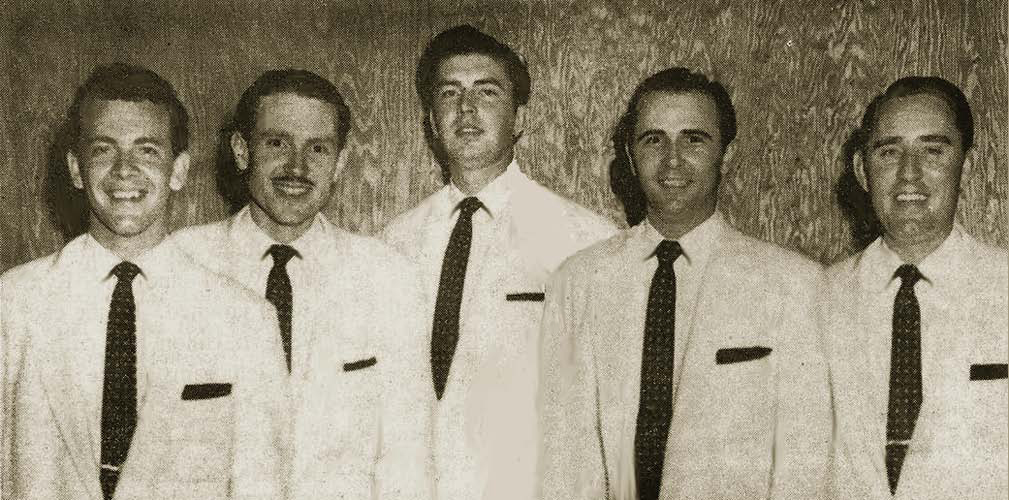
|
The Stamps Quartet after the arrival of Joe B. Davis who replaced Don Taylor (l to r back row) Don Randall - Howard Welborn (l to r front row) Easmon Napier - Bill Randall - Joe B. Davis • The Stamps Quartet personnel that would make the transition to the Plainsmen (l to r) Jack Mainord - Easmon Napier - Joe B. Davis - Howard Welborn - Bill Randall
|
|
XXXXAs for Joe B. Davis, he came to the Stamps Quartet a few months prior to Jack Mainord. Joe was born Joe Bob Davis in Pike County, Alabama on November 4, 1934. He studied music and voice under Mallory Chandler. At age sixteen Joe started working with the Harmony Boys and later the Gospel Travelers, and was considered by many to be the best young bass singer of the day.
|
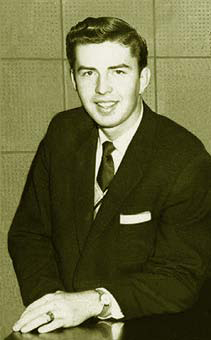
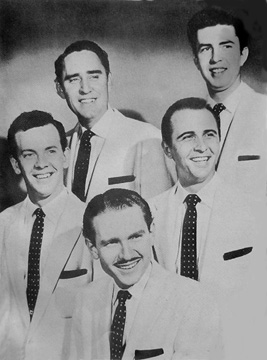
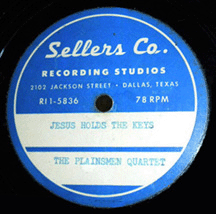
|
A youthful Joe B. Davis • The original Plainsmen Quartet line-up from 1956 (top l to r) Bill Randall - Joe B. Davis - (middle l to r) Jack Mainord - Howard Welborn - (front ctr) Easmon Napier • Label on rare, early Plainsmen acetete demo record
|
|
XXXXIn 1956, Frank Stamps decided that the Stamps Quartet would only sing songs in their concerts that were in the Stamps Quartet Music Company’s catalog. This declaration was met with great resistance by the group members. On Frank’s side of the coin, he was the boss, and the group had been created solely to promote his company’s works. Singing other publisher’s songs did nothing to strengthen his share in a declining songbook market. On the other side of the coin, the quartet members felt the ultimatum would be devastating to the group. The members were all in their early twenties, popular, with a rapidly growing fan base, and wanting to spread their creative wings, not diminish their repertoire of songs. Two different objectives existed that would never find common ground. The final outcome of the impasse was the letting go of the quartet personnel. The suddenly groupless group members had but three choices as to their future. They could opt to leave the music business, and pursue some other career; as individuals, seek openings in other groups; or they could stick together, and continue on singing under a new name. The path of sticking together was chosen, and in August of 1956 the Plainsmen Quartet officially came into existence.
XXXIt should be noted that the Stamps Quartet did not cease to exist. Frank soon put together an in-house group, the Stamps Office Quartet, drawn from the publishing company’s staff to scratch the itch of performing. This group continue doing limited engagements, and did a number of recordings in 1957. During the next five years there were starts, stops, and restarts, a return to the mainstream Stamps Quartet name, and several personnel changes, just all the resplendent joys of keeping a group together! One of the group configurations from 1961 included piano player, Charles Cruce, who would work with the Plainsmen later in the decade. During the same time frame, Frank Stamps had some off-and-on health problems and began looking toward possible retirement, or at least of devesting himself of the publishing company. He approached the Blackwood Brothers, a deal was struck and sometime in the last half of 1962 James Blackwood, and J.D. Sumner became the proud owners of the Stamps Quartet Music Company. In the transaction the Stamps Quartet name was also acquired by the new management, and yet another line-up of group members was announced that consisted of Terry Blackwood, Jerry Redd, Roger McDuff, "Big" John Hall, and "Smiling" Joe Roper. This "new" Stamps Quartet released its first album in January, 1963 on the Skylite label . In 1965, J.D. Sumner and James Blackwood reached an agreement whereby J.D. took control of the Stamps Quartet, and the group went on to international visibility. |
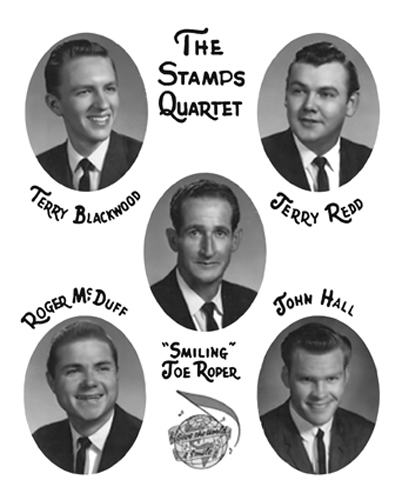
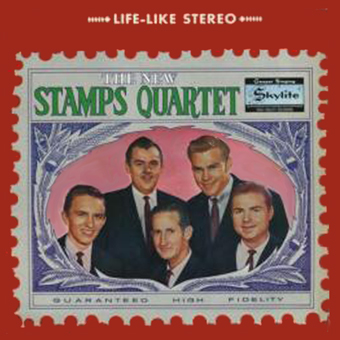
|
The 1962 "new" Stamps Quartet, under the management of the Blackwood organization, with Jerry Redd who would later work with the Plainsmen • First album of the "new" Stamps Quartet from January, 1963
|
|
XXXXI am glad that as a teenager I had the privilege of meeting Frank Stamps. It was at a singing convention a year or so before his death on April 12, 1965. He was definitely an icon within the industry and I am thankful for those of his generation who created a music style that continues in the twenty-first century.
XXXXI inquired of Easmon Napier as to the origin of the Plainsmen name, and he said that it was taken from a local, defunct Forth Worth, Texas group. The word “plainsmen” has historically been a part of several musical groups’ names, some dating back to the start of the 20th century, and covering such genres as gospel, country, alternative, folk, traditional rock, western, cowboy, hillbilly, grunge, generation X, and barbershop, in not only the United States, but also in Canada, New Zealand, Ireland, and England. |
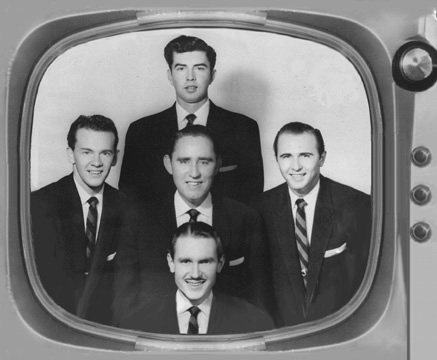
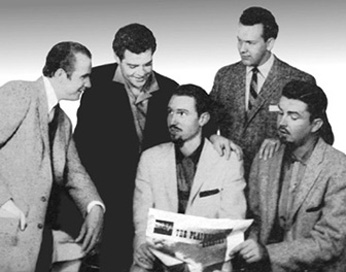
|
Early promotional picture of the original Plainsmen from the group's television program - c. early 1957 - (top) Joe B. Davis - (middle row l to r) Jack Mainord - Bill Randall - Howard Welborn - (bottom) Easmon Napier • First promotional picture of the Plainsmen line-up following the December, 1957 addition of Charles "Rusty" Goodman (standing 2nd from left) - note Easmon Napier and Joe B. Davis sporting "chin hair."
|
|
XXXXThe newly-named Plainsmen Quartet was off and running. During the group’s first month a tour across the southeast was undertaken. No details exist as to who arranged this kick-off tour, or as to whether or not the schedule had been worked out prior to the name change. It has been reported that the tour went as far east as Florida with the group playing to packed houses. It was said that at the Charlotte, North Carolina concert there was standing room only, and that in Knoxville, Tennessee many would-be concert goers were turned away due to a lack of seating.
XXXXTo provide the group with product to sell at their concerts, and to be able to provide radio stations with their music, the Plainsmen soon began recording and releasing a series of custom pressings in 78 rpm and 45 rpm verisions consisting of two songs per record. After the turn of the new year the group released their first complete 33 1/3 rpm, long-play album, The Plainsmen Quartet, on the WORD label. WORD Records was headquartered in Waco, Texas. The label was founded by Jerrell F. McCracken in 1951, with Marvin Norcross becoming a partner in the company the following year. Marvin Norcross would forge the label into one of the largest Christian music conglomerates of all-time. XXXXJoe B. Davis’ sister-in-law, Margie Davis, shared with us her observations concerning the energy of the young Plainsmen, and how animated they were in concert. She said, “The quartet was fun to watch and often had the audiences on their feet, clapping, singing, and stamping their feet!” She told of an incident during a concert at an auditorium in Tyler, Texas, when Howard Welborn took the lead on, “Up Above My Head, There’s Music In The Air.” She said, “Howard got carried away and decided to jump onto the floor in front of the audience, only he failed to notice there was an orchestra pit. So, when he grabbed the mic and jumped off the stage, he nearly broke his leg. But, being the natural showman that he was, he never missed a beat and went on with the show as though it was a perfectly normal occurrence.” Margie added, “Easmon Napier was so much fun to watch, especially when they would get going on a fast moving song. He would throw his right hand up above his head and his left foot would be stomping the floor in time to the rhythm. His arms and hands would be all up and down the 88s, sometimes so fast you couldn’t see his fingers.” |
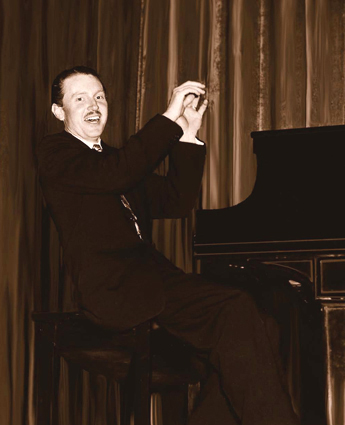
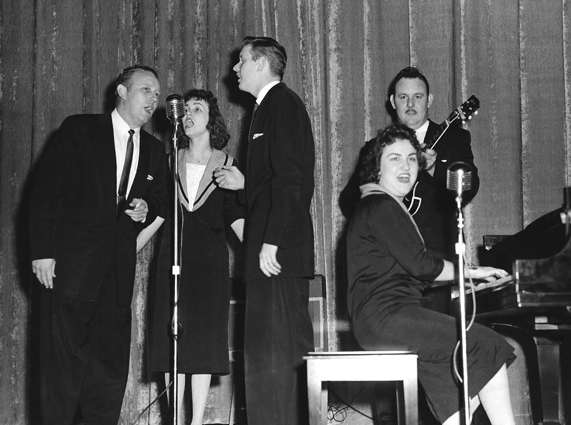
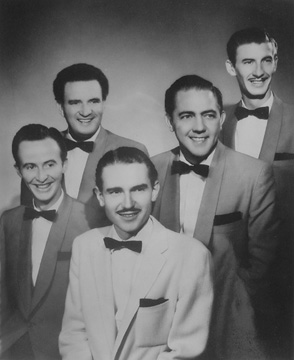
|
Easmon Napier doing his thing at an early Plainsmen concert • The Wills Family who were in concert with the Plainsmen the night Easmon resigned (l to r) Calvin, Norma Jo, Bob, Bill on guitar with Betty seated at the piano • Easmon Napier (center front) during his brief sojourn to the Rebels Quartet - June, 1957
|
|
XXXXChange seems inevitable in groups, and after just ten months of existence the Plainsmen experienced their first personnel change. Bob Wills, who as a member of the Wills Family in Arlington, Texas, often worked with the Plainsmen, told Jason and me that he recalled quite clearly being in concert with the quartet in San Antonio, Texas, on June 14th, 1957, when Easmon Napier walked on stage and announced to the audience that he would be leaving the group to join the Rebels Quartet in Tampa, Florida. Bob said that everyone was somewhat taken back by the announcement. Easmon told the concert goers that it was one of the hardest decisions he had ever made, but that he had to take his family into consideration with regard to the offer put forth by the Rebels. Jack Mainord said the other group members felt that Easmon would not last long with the Rebels, not due to a lack of talent, but due a differences in personalities. However, Jack Taylor, who had worked with the Lone Star Quartet, Stamps All-Star Quartet, Blue Ridge Quartet, and others, was enlisted to fill some pressing dates. In addition, Emil “Buddy” Hinkley, a young student at Lee College in Cleveland, Tennessee, was contacted about becoming the permanent piano player for the Plainsmen, if Easmon did not return to Texas within thirty days. Buddy accepted the offer, but after two weeks Easmon was back with the Plainsmen.
|
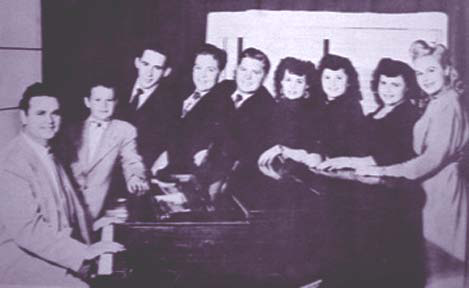
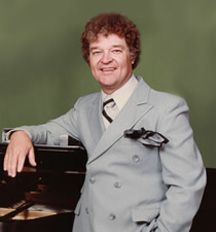
|
Rusty Goodman (4th from left) in pre-Plainsmen days while singing with his family group • Rusty Goodman in the 1990s
|
|
XXXXThe next change came in December of 1957, with Rusty Goodman joining the group, replacing Bill Randall on baritone. It is said that Rusty asked for, and received, a five-year contract with the Plainsmen. Charles “Rusty” Goodman was born in Cullman County, Alabama on September 2, 1933. He began his music career singing tenor with his family’s group, the Happy Goodman Family. When his voice changed, Rusty found himself blessed with a rich, smooth baritone voice. Rusty remained with his family group until he was drafted into the military in 1954, for a two year hitch. Between getting out of the military and joining the Plainsmen, Rusty worked for a short time with country performer, Martha Carson.
|
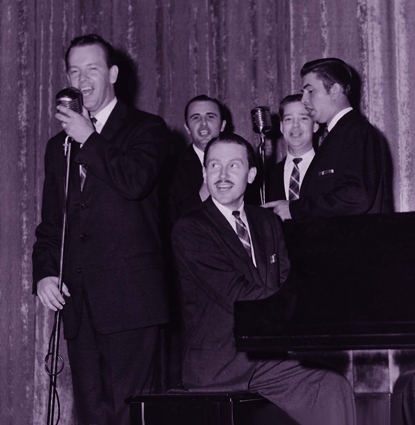
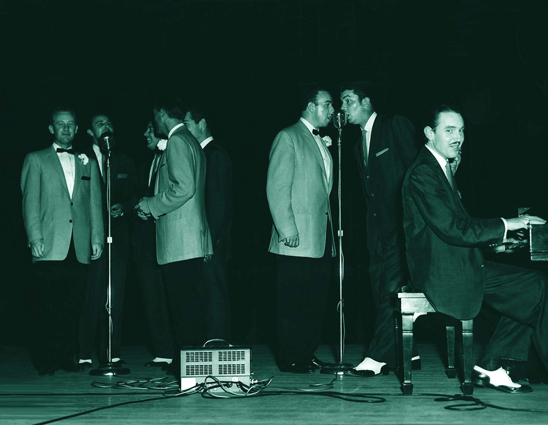
|
Jack Mainord leaning into a song (standing l to r) Jack Mainord, lead - Howard Welborn, tenor - Rusty Goodman, baritone - Joe B. Davis, bass - with Easmon Napier at the piano • The Plainsmen doing the "grand finale" at a concert with the Blue Ridge Quartet at the San Pedro Playhouse in San Antonio, Texas - c. Spring, 1958 (l to r) James "Ed" Sprouse - Howard Welborn - Jack Mainord - Elmo Fagg - Rusty Goodman - George Younce - Joe B. Davis - Easmon Napier with Kenny Gates seated on the bench behind Easmon
|
|
XXXXWhile on the subject of Rusty, I recall a story that both Easmon Napier and later Jack Mainord shared with me. I never checked with Rusty, or his wife Billie, as to the irrefutably of the story, but it makes for a tale worth telling. According to both Easmon and Jack, following the exchanging of wedding vows between Rusty and Billie there came a deluge. The old vacuum windshield wipers were not functioning on Rusty’s vehicle, presenting a major problem in view of the weather conditions. Necessity, being the mother of invention, a creative solution had to be thought of to meet the needs of the moment. Shoelaces were tied together, attached to the windshield wipers, and threaded through the side wing vent windows. With Rusty behind the steering wheel, and his new bride systematically pulling the shoestrings back and forth to operate the wipers, the young and innovative couple drove off on their honeymoon.
XXXXThe Plainsmen were receiving high visibility, not only at concert venues, but also on radio and television. The Plainsmen were being heard regularly on KRLD and WFAA in the Dallas / Ft. Worth market. KRLD had been an innovator in Texas broadcasting, bringing live entertainment events to the airwaves. The station’s programming ranged from sporting events to the popular Big-D Jamboree country music show. The group soon had a regularly scheduled television program in Tyler, Texas, and was making guest appearances on “The Louisiana Hayride,” that originated in Shreveport, Louisiana and on the nationally televised “The Ozark Jubilee” hosted by Red Foley out of Springfield, Missouri. It should be noted that during the mid to late 1950s, Springfield had became an important recording and broadcasting center in the world of country music, and came very close to establishing itself as “Music City U.S.A.” rather than Nashville, Tennessee. Records of guests on “The Ozark Jubilee” indicate that the Plainsmen made appearances on the program in 1956, ‘57 and ‘59. The Plainsmen were quickly coming to national attention. |
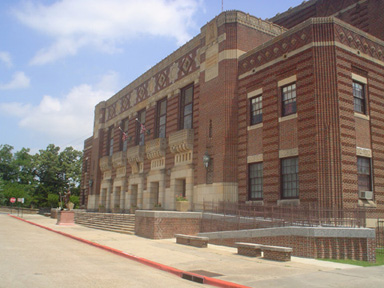
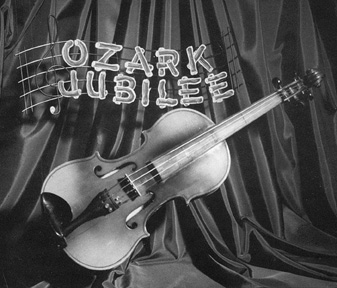
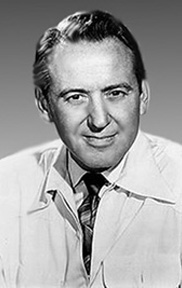
|
The Shreveport Municiple Auditorium that served as the long-time home of the "Louisiana Hayride" • Opening show frame for the nationally televised "Ozark Jubilee" out of Springfield, MO • Red Foley, host of the "Ozark Jubilee"
|
|
XXXXEasmon told me of the group’s first appearance at the National Quartet Convention. The convention founded by J.D. Sumner, along with Cecil Blackwood and James Blackwood, was in its first or second year, 1957 or 1958, and was being held at Ellis Auditorium in Memphis, Tennessee. The group was riding high and the guys were filled with lots of spunk and youthful indiscretion. Easmon said it had become a ritual for someone to do or say something funny just as the group was taking the stage to insure everyone was loosened up and wearing big smiles for the audiance. He said they were pumped that night, adrenaline was running high. Wanting to make a big impression, they were even sporting matching white suits for the occasion. While waiting in the wings for their introduction, Easmon had been trying to think of something that would loosen up the guys as they took the stage. It had to be memorable, something special for an extra special event. Just as the emcee belted out, “Now make welcome the Plainsmen Quartet,” and as the applause erupted, Easmon noisily broke wind. The calculated result was, the guys hit the stage with big toothy grins. The uncalculated result was, Easmon had seriously soiled himself, and all he had to look forward to was setting on the piano bench. The chain of events was not good for the white pants he was wearing, as was evident to the rest of the guys standing behind him when he had to arise from the bench and awkwardly shuffle back and forth to the microphone at center stage to make introductions. He said between the outbreaks of muffled laughter from the rest of the guys, and his own discomfort, it was one of the most challenging sets he ever had to work through. Experience is a great teacher, and Easmon learned to pursue other forms of comic relief.
|
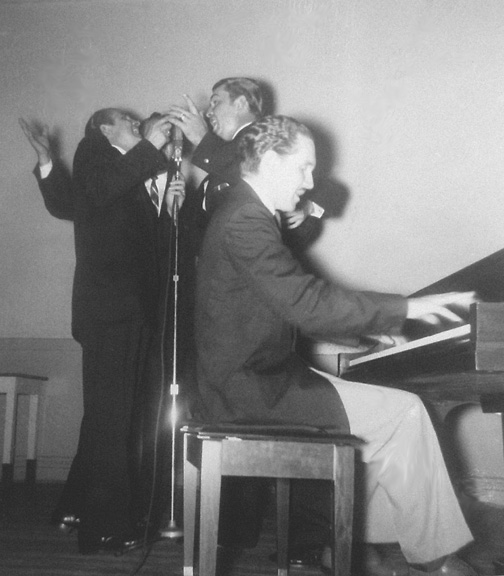
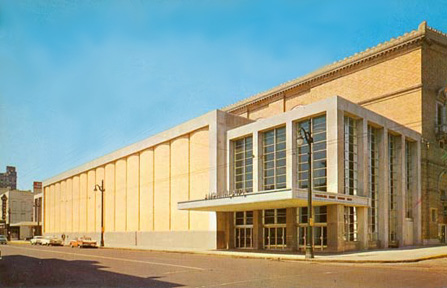

|
Easmon Napier at the piano. Photo taken by a fan at 1958 concert in Charlotte, NC • Ellis Auditorium in Memphis, TN, the first home of the National Quartet Convention. The facility was constructed in 1924, remodeled and added to in the late 1950s and early 1960s, and demolished in 1997 • Picture taken just prior to Joe B. Davis leaving the Plainsmen (l to r) Howard Welborn, tenor - Jack Mainord, lead - Rusty Goodman, baritone - Easmon Napier, piano - Joe B. Davis, bass
|
|
XXXXIn early 1958 a second album, also called The Plainsmen Quartet, was completed and released on the WORD label. Not long after the release of the second album Joe B. Davis left the group due somewhat to health problems, but also to pursue a non-music related career. He possessed great talent, and there has been speculation as to the ranking, and recognition he may have attained in quartet music had he continued in the industry. Around the same time, Howard Welborn took a sabbatical from the group to work with the Chuck Wagon Gang, Seemingly, he soon began entertaining thoughts of pulling the Stamps Quartet back together with Frank Stamps singing bass in the re-formed group. According to Charles Yates, Howard contacted him, and others, about the purposed new group, and all seemed to be falling into place until health problems precluded Frank Stamps from participating in the new Stamps Quartet configuration. Plans changed. A new bass was called-in, and the group started working under the name of the Lone Star Quartet, a name Frank Stamps had rights to from an earlier group of the 1940s. The new group consisted of Don Randall, Howard Welborn, Charles Yates, Jim Boatman, and future Plainsmen member, Charles Cruceon piano. Howard Welborn left the Lone Star Quartet in 1959 to return to the Plainsmen. The total duration of the group was about a year and a half. The group only recorded four songs during its existence, one of which, “Will The Lord Be With Me,” was later recorded by and become a hit for the Plainsmen. Howard never told Jason or me the exact details of why he decided to leave the Plainsmen and move to the Chuck Wagon Gang, but it was at this time the vocally sky-high twin brothers, Erman and Thurman Bunch, joined the Plainsmen, and Rusty Goodman was shifted to bass.
|
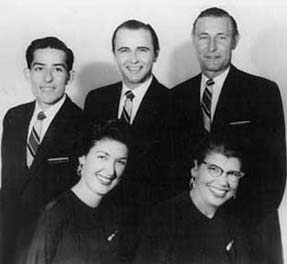
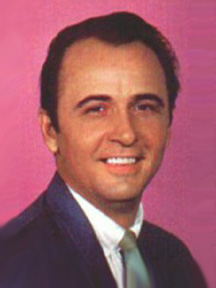
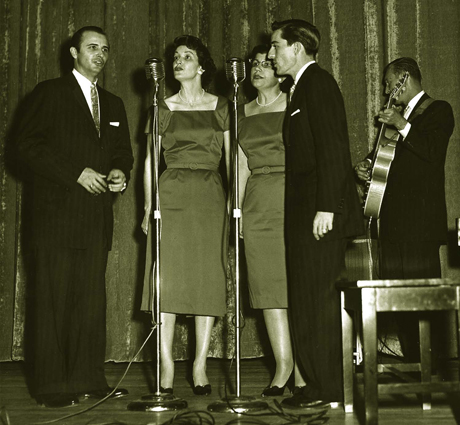
|
Howard Welborn (top center) during his time with the Chuck Wagon Gang • Howard Welborn - c. mid-1960s • Howard Welborn singing with the Chuch Wagon Gang - c. mid-1958 (l to r) Howard Welborn - Anna Carter-Gordon - Rose Carter-Karnes -Ron Crittenden - Howard Gordon on guitar
|
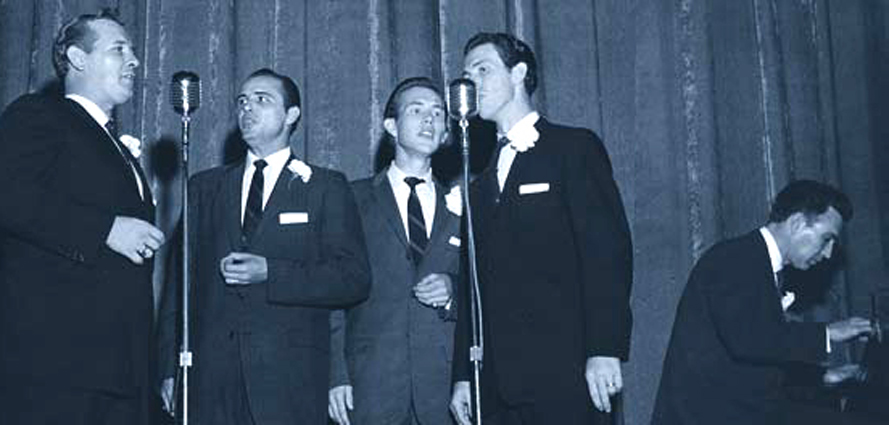
|
The Lone Star Quartet (l to r) Don Randall, Howard Welborn, Charles Yates, Jim Boatman, Charles Cruce
|
|
XXXXJust prior to the Bunch brothers joining the Plainsmen, a young man by the name of Newman Miller filled-in a few dates with the group, for Easmon Napier. In talking with Newman he did not recall the exact circumstances, whether Easmon was sick or had some pressing personal business to attend to, but none the less, he was called on as a fill-in on piano. Newman, would thirty years later become re-involved with the Plainsmen. At the time, Newman was living in McAlister, Oklahoma where earlier he had taken piano lessons from Easmon. In his pre-Plainsmen days, Easmon had taught piano on the side, when not selling shoes at a local store in McAlister. In 1953, while still in high school, Newman played for a short time with the Stamps-Baxter Quartet. Over the next five years he worked with several groups including the McDonald Brothers, Tulsa Trumpeters, the Gospelaires, Melody Men, Foggy River Boys, Weatherfords, and the Jubilaires. While Newman was with the Foggy River Boys the group was a regular on Red Foley's "Ozark Jubilee," and toured with Foley's traveling show. When Newman joined the Jubilaires the group included in the its roster Erman and Thurman Bunch. Newman had come to the Jubilaires to fill the opening left by Wally Varner’s departure to the Blackwood Brothers. Newman said that after being with the Jubilaires, he and the Bunch twins attempted to form a trio. The new group never really got off the ground, and soon after, Erman and Thurman both became official members of the Plainsmen.
|

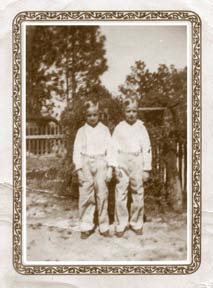
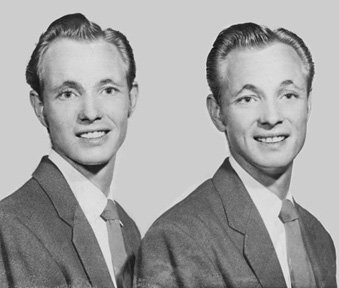
|
Newman Miller c.1955 • The Bunch twins in 1942 • Erman Bunch and Thurman Bunch in the late 1950s
|
|
XXXXWhen the Bunch brothers joined the Plainsmen, they brought with them innovative harmony structures that several post-WWII groups had been experimenting with. This new approach to harmony had been labeled “modern harmony,” and it would become a hallmark of the Plainsmen sound. The identical Bunch twins were born in Clara, Mississippi on May 26, 1934. Both brothers possessed ultra-high ranges and developed incredible ears for hamony. Their father, H.H. Bunch, who had studied with the Stamps-Baxter organization, became a music teacher and conducted numerous singing schools in the costal counties of Mississippi and Alabama. Apparently Mr. Bunch had two ways for his students to learn music, his way, and his way. He was known as a stickler for singing by the note, with proper phonetics and enunciation. Leaning to sing was a given in the Bunch family. This near taskmaster approach to learning music paid off in creating two of the best tenors in southern gospel music.
|
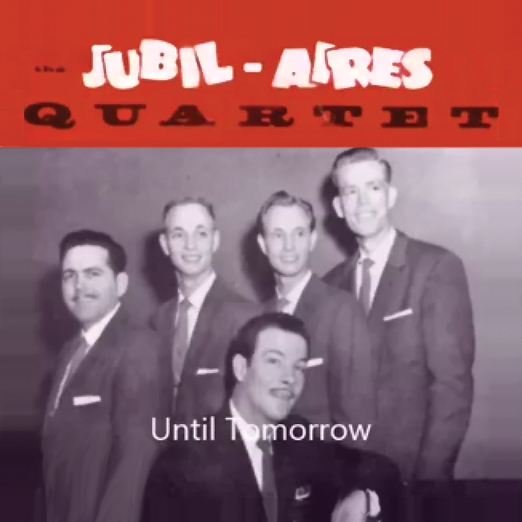
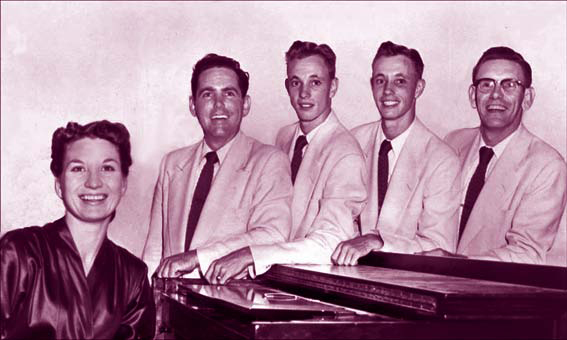
|
The Bunch twins on the cover of a Jubilaires record prior to coming with the Plainsmen - 1957 • The Bunch twins in another versions of the Jubilaires - First (l to r) Melda Bigham - Hal Tomlinson - Thurman Bunch - Erman Bunch - Bert Gibson
|
|
XXXXDoris Bunch Gunter, Erman and Thurman’s younger sister, told us of her father acquiring a guitar, and learning to play the instrument when she was quite small. She said the greatly prized guitar accompanied many family singing sessions. It seems that the instrument eventually attained a near sacred heirloom status in the Bunch family. Doris told of how the twins formed their first quartet with two classmates about the time they started high school. She said the group held together over the next four years. Doris shared that sometime, not long after graduation, the Bunch family was invited to share a Sunday meal with a family who were members of the congregation where her father was pastoring in a small community near Mobile, Alabama. After the meal Erman and Thurman wanted to take the family car and drive into Mobile to visit some friends before coming back to pick up the other Bunch family members and returning home. She said the weather had been very stormy, with heavy downpours and gusty winds. The twins left in the family car, but in just a few minutes they saw Erman and Thurman trudging back up the long drive, through the pounding rain. In the fury of the storm, they had wrecked and totaled the car. Fortunately, Erman and Thurman were uninjured, but there had been one fatality. As Doris put it, her father’s prized guitar “died” in the crash.
|
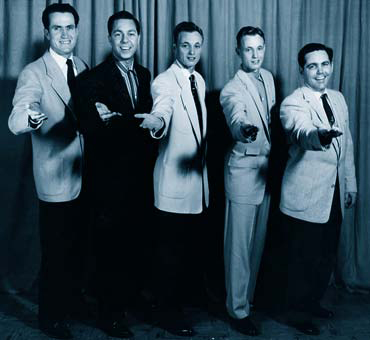

|
Aah yes, the Bunch twins in yet another Jubilaires line-up (l to r) Fulton Nash - David Ingles - Thurman Bunch - Erman Bunch - Hal Tomlinson • High-fashion Plainsmen members showing off their flashy two-tone shoes! (l to r) Thurman Bunch - Rusty Goodman - Easmon Napier (clean shaven version) - Jack Mainord - Erman Bunch
|
|
XXXXThe twins were drafted into military service, and spent four years in the Air Force. Ironically, for the duration of their duty, Erman and Thurman were stationed at various locations in Texas. At Shepherd Air Force Base in Wichita Falls, Texas they formed a quartet to sing locally. In 1957, they were transferred to Houston, where they came in contact with Hal Tomlinson and became members of his group, the Jubilaires.
XXXXThere have been studies done with regard to the mental bonds between twins, and the Bunch brothers seemed to have manifested some common telepathic traits. Reports from different individuals who worked with Erman and Thurman stated that when riding down the highway the twins would often simultaneously point to something along the road and use identical words to describe the object. Other group members found the twin’s nack for synchronized outbursts uncanny. XXXXErman’s stay with the Plainsmen was of relatively short duration. His sister, Doris, indicated that Erman’s wife was not overly keen about him being away from home, and soon Howard Welborn was back onboard with the group. |
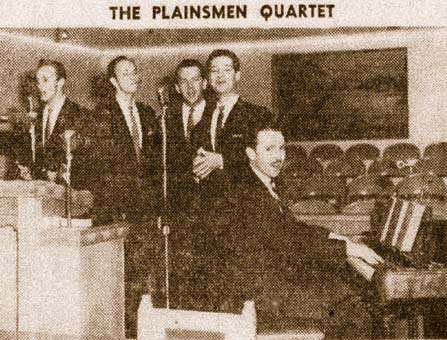

|
Newspaper clipping of the Plainsmen in concert (l to r) Erman Bunch - Thurman Bunch - Jack Mainord - Rusty Goodman - Eason Napier - c. 1958 • 1959 Plainsmen with the Bunch twins (l to r) Rusty Goodman - Thurman Bunch - Easmon Napier - Erman Bunch - Jack Mainord
|
|
XXXXJack Mainord told us a great story of the group’s transportation during those early years. He said they had an old bus that had seen too many miles. The frame was so badly rusted that the bus had bowed down in the middle. Jack said that when you headed to the back of the vehicle you walked downhill the first half of the journey and uphill the second half. Eventually the bus gave up the ghost somewhere in the boonies of Louisiana. They managed to ease the dead relic over onto the shoulder of the road, unloaded their stuff, flagged down a passing flatbed farm truck, piled their clothes, product, equipment and themselves on the truck and never looked back.
|
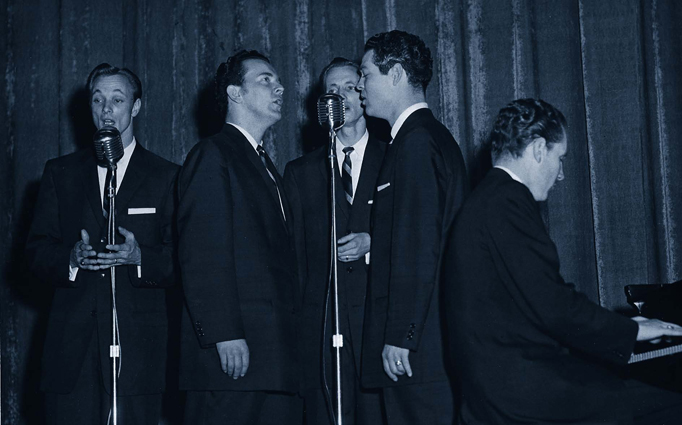

|
Thurman Bunch taking a lead • Easmon Napier singing and Rusty Goodman playing the piano... talk about a switch up!
|
|
XXXXAlso from those early years, Easmon, told of the group being invited to a black gospel talent contest. The Plainsmen were not there to compete, but only to make a guest appearance. He said there was a great turn-out of both contestants and each group’s entourage of well-wishers. Participating groups paid a small fee to enter the contest, aspiring to win the grand prize of a large country ham. Easmon said that all was going well until about mid-show when someone suddenly burst through the curtain at the back of the stage and yelled, “Somebody’s stole the damn ham!” He said pandemonium broke loose, a near riot, bringing an abrupt end to the competition. Easmon said the Plainsmen ate ham sandwiches for a week! Naw, I just made that up. He never indicated whether or not the perpetrator was ever apprehended and the ham recovered.
|
| DALLAS TO BATON ROUGE |
|
XXXXWith continued growing national visibility, the Plainsmen entered into a new phase of their career when they became a part of Jimmie Davis’ gubernatorial campaign. James “Jimmie” Houston Davis had already enjoyed a long political, and successful music career when in 1959 he hit the campaign trail in Louisiana for a second time. Jimmie Davis had served as Governor of Louisiana from 1944 to 1948, and prior to entering into politics had established himself as a popular country/western artist and songwriter. His hit song, “You Are My Sunshine,” brought him great visibility. Some researchers are of the opinion that the song was not an original work created by Jimmie Davis, but rather penned by and purchased from a fellow performer named, Paul Rice. Irregardless of the song’s origin, it greatly helped put Jimmie Davis on the national map as an entertainer. His self-penned “Suppertime,” also became a popular song that endeared many fans to Jimmie. In 1948 the story of his phenomenal success was made into a motion picture, “Louisiana.” Jimmie knew the draw music could have on winning over a crowd, and securing the vote each person represented. Having already worked on programs with the Plainsmen, Jimmie Davis called on the group to become a part of his official campaign entourage and persuaded the guys to relocate to Baton Rouge.
XXXXJimmie Davis was the consummate performer. Quick of wit, fast with the retort and humor, Jimmie knew how to work an audience, whether selling his music or his politics. I love the great story that is told of Jimmie being constantly harangued by his opponent during the election campaign to enter into a formal public debate over issues. Jimmie kept resisting the challenges to debate, and finally laid the subject to rest when he good-humoredly stated that no matter how much debating took place, he was still going to vote for Jimmie Davis! XXXXIt is common knowledge that Louisiana possesses a colorful political history. Easmon Napier said that the group often found themselves in interesting situations during the campaign. He said that folks in some of the small back bayou communities took their politics extremely serious. So serious, that it was not unusual to see men representing both candidates showing up at campaign rallies openly armed, with guns in hand. He indicated that at times discussion would become heated, and that there was always a concern of someone getting trigger-happy. XXXXEasmon also mentioned that Jimmie Davis had an unusual habit of always carrying a small container of goat milk with him on the campaign trail. According to Easmon, this bovid nectar was a daily indulgence. Apparently, Jimmie thought goat milk to be of benefit to his stamina and over-all health. Who is to argue? Jimmie Davis lived to the ripe old age of 101! |
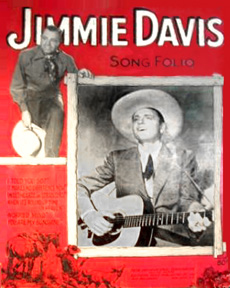
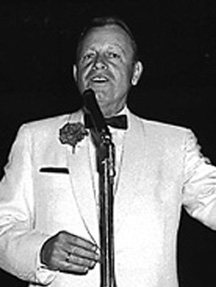
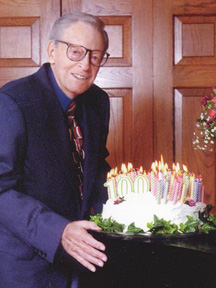
|
Jimmie Davis songbook - 1942 • Gov. Jimmy Davis - 1960 • Jimmy Davis celebrating his 100th birthday - 1999
|
|
XXXXIn late 1959 to early 1960, the Plainsmen recorded and released an album entitled Songs and Hymns by the Plainsmen. The record is better known as the “red album,” in that it was pressed in red transparent vinyl. The project is considered by many gospel music oficionados as one of the greatest gospel albums ever recorded. Due to the scarcity of the record, collectors sometimes refer to the project as the “holy grail” of gospel albums. The project was released on the Inspiration Records label, a division of TNT (Tanner ‘n’ Texas) Records of San Antonio, Texas. During the pressing and manufacturing of the album, the label went out of business. Fortunately the Plainsmen were able to aquired most of their order, but many of the records lacked printed jackets, and were sold at concerts in their white paper inner sleeves. In addition to vocals by Jack Mainord, Erman Bunch, Thurman Bunch, and Rusty Goodman, with Easmon Napier on piano, a member of the Jimmie Davis’ band, Johnny Patterson, played guitar on the session.
XXXXOn April 19, 1960, Jimmie Davis became Governor of the State of Louisiana for the second time. According to Easmon Napier, upon completion of the successful campaign and in appreciation for their service to the cause, each of the group members received a thousand dollar bill from the Governor and were placed on the “deadhead payroll.” Not only the Plainsmen were placed on the special payroll, but also the members of the Jimmie Davis Sunshine Band. Being placed on the “deadhead payroll" meant that the individual received an in-name-only position within the State government that entailed a proper State government title, complete with a regular paycheck, but no official State related work. I remember Easmon showing me the thousand dollar bill that he was still carrying in his wallet, and if I recall correctly, the official State title he was assigned had something to do with the Department of Agriculture. He said that during that period they drew their checks and spent most of their time fishing, singing, and fishing some more. |
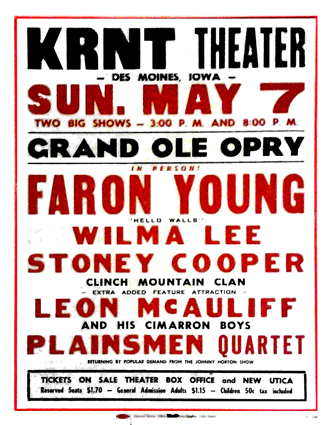
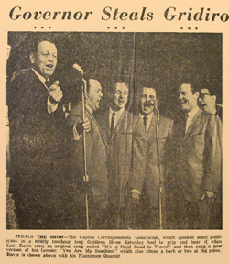
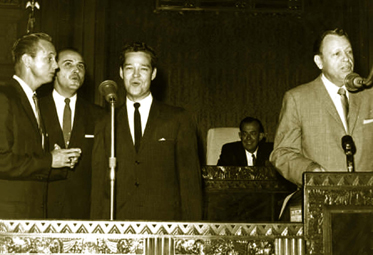
|
The Plainsmen included on an Opry package show poster from 1960 • Newspaper clipping of the Plainsmen performing with Gov. Jimmie Davis - c. 1961-63 • The Plainsmen appearing with Gov. Jimmy Davis in a mini concert before the Louisiana State Legislature (l to r) Thurman Bunch - Howard Welborn - Rusty Goodman - Speaker of the House, J. Thomas Jewell - Gov. Jimmy Davis
|
|
XXXXJimmy Davis held a “lifetime” contract with Decca Records and the Plainsmen backed him up on at least one project. Technically, the group was with Decca as indicated on one of the group’s promotional pictures of that era, but in reality no stand-alone projects of the Plainsmen were recorded and released on the label. However, due to the group’s affiliation with Gov. Davis and their national press, they were signed to the Mercury Records’ label for three albums; Someone’s Watching Over You, The Worlds Greatest Gospel Songs, and Gospel Songs for Country Folks.
XXXXIn addition to the gubernatorial campaign and Jimmie Davis’ election, other exciting events were shaping the career of the Plainsmen. Continued guest appearances on the “Louisiana Hayride” in Shreveport, Louisiana, and appearances in package shows with various country artist brought the group into association with Johnny Horton. John Gale “Johnny” Horton, also had a regularly scheduled program at the same television station in Tyler, Texas where the Plainmen had previously broadcasted. In the fall of 1960, with Horton riding a string of crossover hits, the Plainsmen were contacted to sing back-up on a new single he was recording. “North to Alaska,” the theme song for the soon-to-be-released John Wayne motion picture of the same title, would prove another hit for Johnny and bring more notoriety to the group. The movie debuted, and the song quickly started climbing the charts. There was a great deal of hoopla and hype. Easmon Napier told me that Horton had been scheduled to make an appearance on national television, with the Plainmen singing backup, when tragedy suddenly struck. In the wee hours of the morning on November, 5, 1960, while driving back to Shreveport, Louisiana, from a gig at the Skyline Club in Austin, Texas, Johnny was hit and killed by a drunk drive, near Milano, Texas. Horton was gone, but “North to Alaska,” went on to be a smash hit, and became one of the Plainsmen’s most requested songs. As a footnote to “North to Alaska,” Plainsmen mega-fan, Ben Pegues, mentioned that on numerous occasions, when introducing the song in concert, Easmon Napier would state from the stage that he and Rusty Goodman wrote the song and gave it to Johnny. When the song released, the writers on the label were listed as Franks (Tillman Franks, Johnny’s manager) and Horton. The BMI records show Tillman Ben Franks and Johnny Horton as the composers. The sheet music published in 1960 by Twentieth Century Music Corp., a division of Twentieth Century Fox Film Corporation, who released the original motion picture, shows Mike (Michael) Phillips as writer. At times, strange be the travels of a song. |
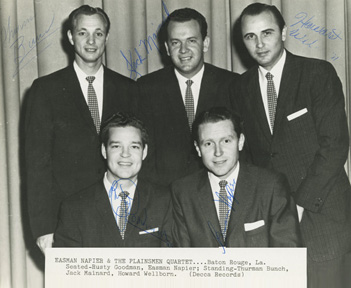
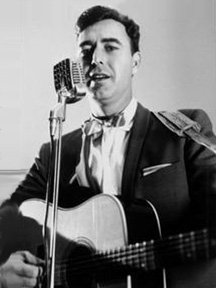
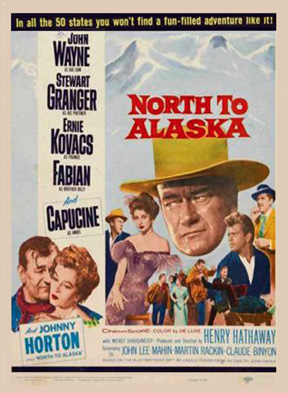
|
The Plainsmen in 1961, after relocation to Baton Rouge, LA • Johnny Horton - late 1950s • Poster from the 1960 motion picture, "North To Alaska"
|
|
XXXXOn the evening of November 26, 1960, the group was able to add “wedding singers” to its growing resume. The Plainsmen were a part of a Grand Ole Opry Show playing the Forum Auditorium in Wichita, Kansas. I still remember, as a kid, getting to sing a solo on the stage of the cavernous old building. At the time, the Forum was the main municiple auditorium in the city and was part of a block-long complex that included an exhibition hall, and the vaudeville-era Arcadia Theater that during the early 1960s became a regular stop on the Plainsmen’s touring schedule. In addition to the Plainsmen, the Opry show included such acts as, Woodward Maurice “Tex” Ritter, Carl Lee Perkins, Aubrey WIlson “Moon” Mullican, the LeGarde Twins from Australia, Gary Van and his Western Starlighters, Harold Franklin “Hawkshaw” Hawkins and Jean Shepard. They were all there to share their music with the crowd of 4,000 entergized fans. Following the closing curtain Mack Sander, owner of the local KSIR country radio station took the stage and announced an added attraction for those in attendance. He announced that Hawkshaw Hawkins and Jean Shephard were going to exchange wedding vowels on stage that evening. Jean entered from the rear of the auditorium, resplendent in her wedding gown. The Plainmen sang “True Love,” and “Her Hand In Mine. Ken Nelson of Capitol Records served as best man, and longtime Kansas promoter, Harry “Hap” Peebles gave the bride away. Following the ceremony, almost one thousand of the concert goers packed onto the stage to share in the congratulations and in the giant wedding cake.
|
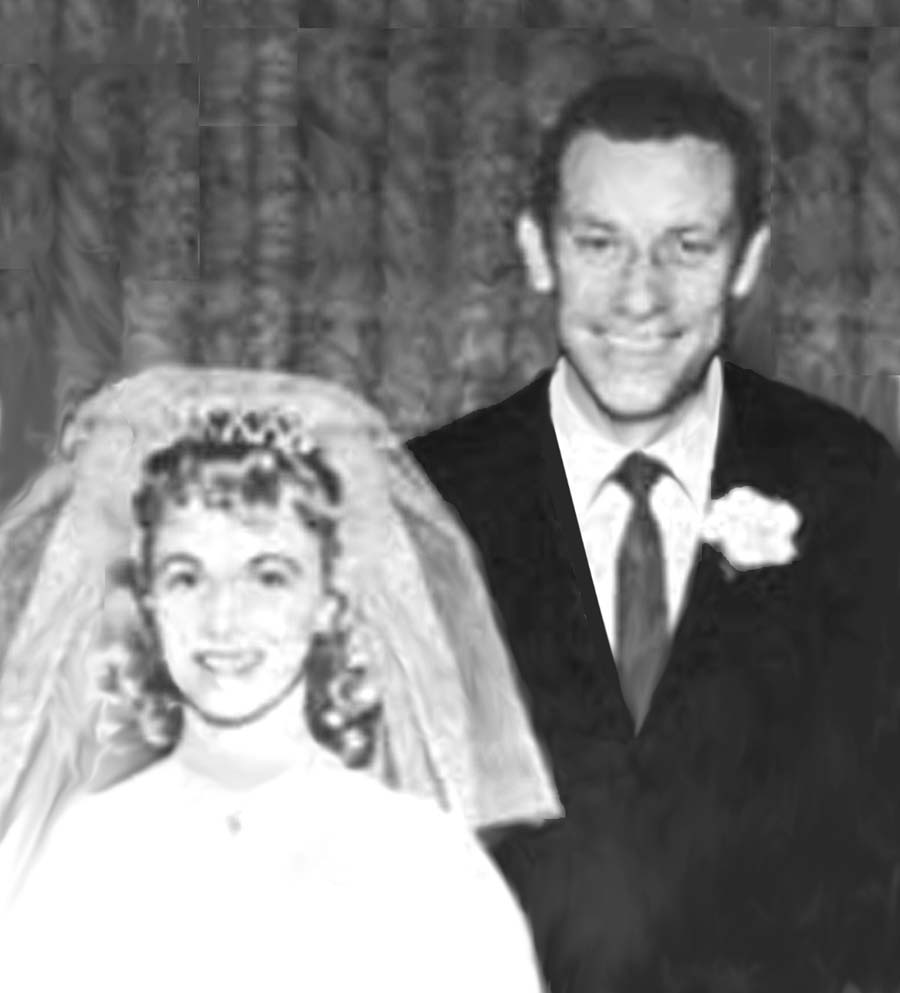
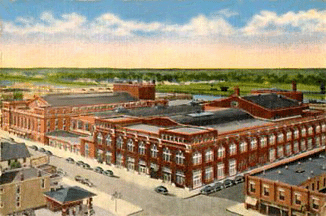
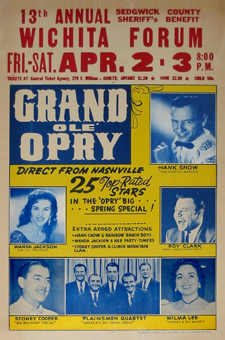
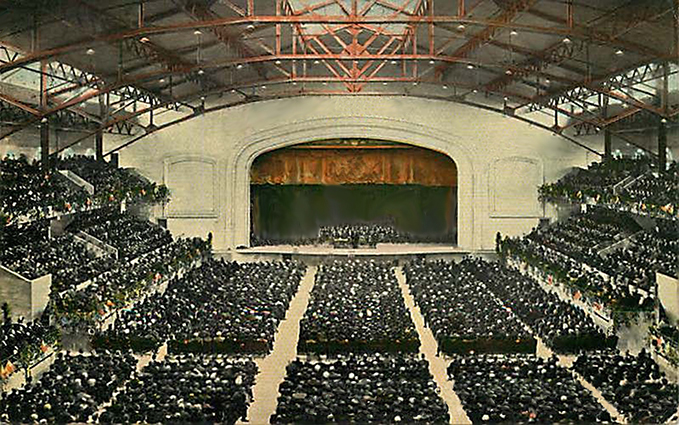
|
Wedding of Jean Shepard and Hawkshaw Hawkins - November 26th, 1960 • Located in Wichita, KS, The Forum (on the far left), and the Arcadia Theater (right center), were familiar venues for the Plainmen in the early 1960s. The complex was razed in 1965 • Poster promoting the Plainsmen's last two preformances at the Forum, April 2nd & 3rd, 1965 • Old picture postcard showing the interior seating and stage of the Forum
|
|
XXXXDuring the late 1950s and early 1960s, the Plainsmen had an official fan club. The membership fee to join was fifty cents, and the yearly dues came to one dollar. For their investment the fans were presented with proper membership cards, and periodically received the Plainsmen newsletter, consisting of multiple pages. In its day, the Plainmen fan club newsletter was said to be the best and most comprehensive in the industry.
|
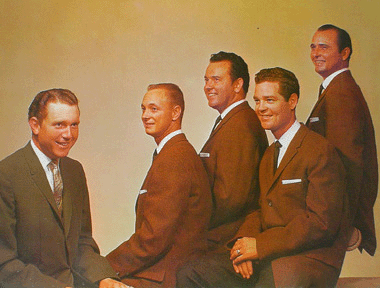
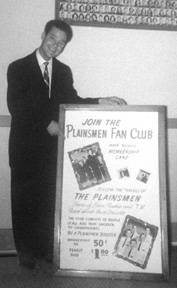
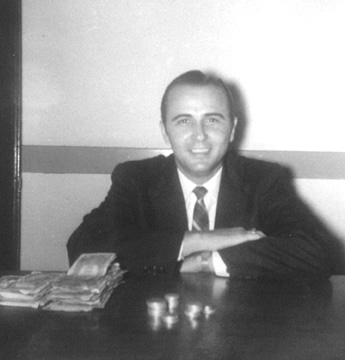
|
1962 Plainsmen just prior to Easmon Napier relocating to Wichita, KS - (l to r) Easmon Napier - Thurman Bunch - Jack Mainord - Rusty Goodman - Howard Welborn • Rusty Goodman pitching the Plainsmen Fan Club. Photo taken by a fan at a concert in Omaha, NE - 1962 • Howard Wilburn counting the sales take at Omaha concert - 1962
|
|
XXXXIn preparing this article I contacted Karen Weylene Coleman, Jack Mainord’s oldest daughter, and asked of her early memories of the Plainsmen. She started by saying that even her name had connections to the group. Karen said her middle name was a name-sake of Howard Welborn’s wife, Weylene. She also spoke of remembering Rusty Goodman being around the house, and of her spending quite a bit of time with Thurman Bunch’s wife, Boots. Having spent many years on the road, running back-and-forth across the county playing music, I understand far too well the sacrifices one makes with regard to family and friends. I was especially touched when Karen said that one of her fondest memories as a child, was of her father always making a point, when returning late at night from a concert, to stop by her room, gently wake her, and talk to her for a little while, just to let her know he was home, and that all was well. She said it gave her a deep sense of security and of knowing that she was loved.
|
| BATON ROUGE TO WICHITA |
|
XXXXThe early 60s continued to bring new opportunities for the Plainsmen. There were more package shows with varied artist. In 1962, Easmon Napier left the group and relocated to my childhood hometown of Wichita, Kansas where he entered into a partnership with a local businessman in a combination music store and teaching studio. Easmon’s partner in the venture was John Merrit, who apparently invested the most money because the store was called, Merrit Music. I do not recall much about Mr. Merrit other than his unusual talent was that of playing a musical saw. As a kid I found it fascinating that someone could drag a violin bow across a handsaw and create music. Come to think of it, I guess I still find such a feat fascinating.
XXXXMy first encounter with Easmon Napier came at a talent contest, being held at the local Eagle Lodge, in which I was a contestant. I can not say that our first meeting was positive for me. Easmon had recently relocated to Wichita and had been enlisted to judge the talent contest. I came in second place, and I was not used to being in second place. I left that day a disgruntled thirteen-year-old! However, I got over being miffed, and was soon taking piano lesson from Easmon. Our acquaintanceship would extend over the next eight years. XXXXAfter a relatively short period of time, Easmon’s partnership with Mr. Merrit ceased, and he opened his own self-named business, the Easmon Napier School of Music located on South Oliver in Wichita. I believe the long narrow building that housed his new enterprise had previously been used by a dry cleaning business or an appliance store, but that is now foggy in my brain. The front third of the building was devoted to the display and sales of new pianos and organs, along with a few electric guitars, and racks of gospel record albums and sheet music. The middle portion was divided into three or four rooms for private lessons, with the rear of the building used for repairs, restoration and used trade-ins. Easmon enlisted a fellow Okie from the Ada, Oklahoma area by the name of, Haskel Cooley, to help with teaching. After a stint in the military, Haskel joined the Weatherfords in 1972, and from spring of 1974 until spring, 1979, played piano for the Cathedral Quartet, eventually forming his own family group in Wichita. |
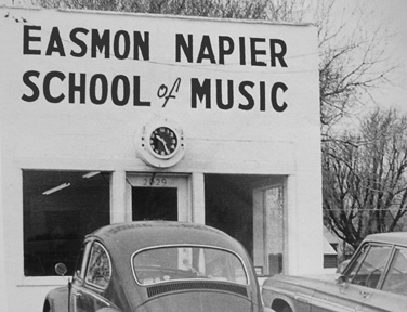
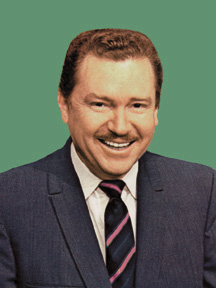
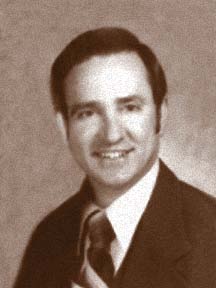
|
Easmon Napier School of Music, 2029 S. Oliver, Wichita, KS • Easmon Napier • Haskel Cooley
|
|
XXXXMeanwhile, in Baton Rouge the Plainsmen had filled the vacancy left by Easmon's leaving with, Larry Denim. Larry would be with the group for a couple of years. At some point during his time with the group the project entitled, The Plainsmen Quartet Sing Softly and Tenderly, was released on the Songs of Faith label, featuring nearly indistinguishable painted portraits of the group members on the album jacket. Late in 1962, Touch the Hand of the Lord was recorded and a limited number of albums released on a Century Records custom pressing.
XXXXBy early 1963 the Plainsmen were recording on the SIMS label. SIMS Records, had been founded by, Russell Sims, nine or ten years earlier. The label worked with a broad spectrum of pop, country, and gospel artists. Jason and I got acquainted with Russell some years back, and we asked him how the Plainmen came to be with SIMS Records. He said it was Hap Peebles that brought the group to him. In his day, Hap Peebles was one of the biggest, if not the biggest country music promoter in the nation. |
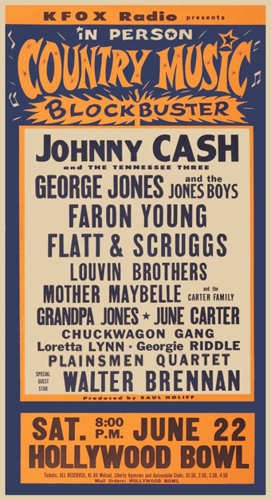
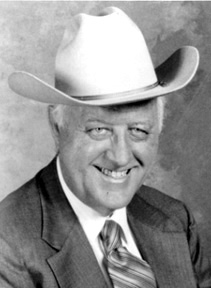

|
The Plainsmen were a part of the hugh country music concert at the Hollywood Bowl in Los Angeles on June 22, 1963 • Promoter Harry "Hap" Peebles, who was one of the founders of the Country Music Association (CMA), booked the Plainsmen extensively on country music package shows across the nation • Plainsmen with touring Opry cast members, during presentation to Hap Peebles - 1964
|
|
XXXXThe initial SIMS album, Lonely Street, was the group’s first all-country / pop album. The project was recorded in April of 1963 at the Columbia Recording Studio, in Nashville. The previous year Columbia had purchased the studio facility on Music Row from Nashville recording pioneer, Owen Bradley. Russell said for the second SIMS record he re-released the Touch the Hand of the Lord project, giving it a new cover design that became know as the “sweater album.” In the cover shot all of the group members were wearing sweaters, hence the nickname. According to Russell, he produced a third album, Birmingham Jail, based on the hit single from their Lonely Street project. However, a copy of the album has yet to surface. Russell did not have the finished album in his files, the session masters, nor a project song list. He stated that the cover art consisted of the same group photo found on the reverse side of the second SIMS album, but in color. The search continues for this purported work.
|
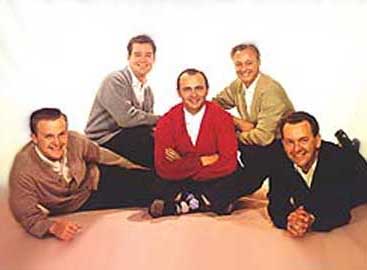
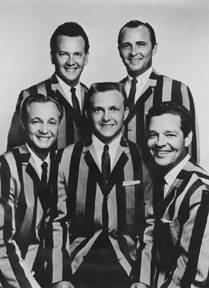
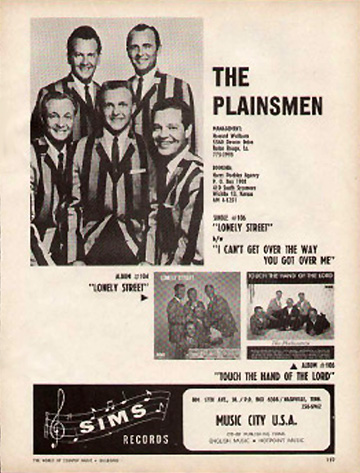
|
Larry Dennim (far left) becomes new piano player. Photo taken late 1962 to early 1963 • The Plainsmen - 1963 - (top l to r) Jack Mainord - Howard Welborn - (bottom l to r) Thurman Bunch - Larry Dennim - Rusty Goodman • Plainsmen / SIMS Records "Billboard" magazine ad - 1963
|
|
XXXXFollowing the SIMS projects, Rusty left the Plainsmen to work once again with his family. Many years later he confided that although he thoroughly loved his family, and working with them, the years he spent with the Plainsmen were the most enjoyable of his career. In October, 1963 the first Happy Goodman Family project, I’m Too Near Home, was released on the SIMS label, and Seals “Low Note” Hilton was called to fill Rusty’s vacancy with the Plainsmen.
XXXXSeals Hilton shared with me that he was born near Cedartown, Georgia in 1925, but while he was still small his parents relocated to the Gadston, Alabama area. At age seventeen he became bass for the Sand Mountain Quartet. He also spent time with the Rhythm Masters, the Ray Wyatt Quartet, and the All-American Quartet. Seals said that in 1947 he joined the Harmoneers where he stayed for the next fifteen years. His time with the Plainsmen spanned a relatively short period from late summer or early fall of 1963 to sometime during the first quarter of 1964. He sang on the group’s first project on the Heart Warming label entitled The Plainsmen Go Heart Warming. At that time Heart Warming was the flagship gospel music record label for the John T. Benson Music Publishing Company in Nashville. When Seals left the group he was replaced with North Carolinian, Jobe William "Jay" Simmons. |
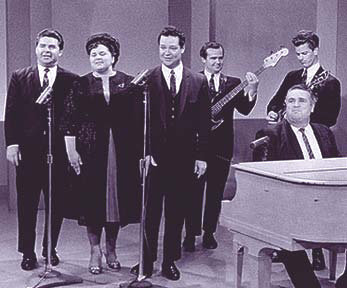
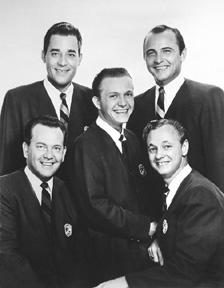

|
Rusty Goodman (3rd from left) after leaving the Plainsmen, and returning to the Happy Goodman Family • Seals "Low Note" Hilton (top left) took Rusty Goodman's place as bass singer with the Plainsmen in late summer to early fall of 1963 • Seals Hilton (upper right) in his pre-Plainsmen days with the Harmoneers. Photo said to be from 1959
|
|
XXXXI always liked Jay Simmons, and his easy demeanor. He told me that when he was fifteen he attended a Stamps-Baxter music school held in Chattanooga, Tennessee. He said that he didn’t learn much music during the sessions, because he became infatuated with the girl who lived in the house behind the building where the school was being held. For some reason he found the young lady’s shape to be of more interest to him than the shaped notes he was supposed to be studying. Jay’s first quartet experience was in a group called the Friendly Four comprised of himself, two of his brothers, along with an non-family member on tenor and a fourth brother on piano. Doing the math it would seem they should have called the group the Friendly Five. The group worked out of Harrisburg, Virginia, and in time changed its name to a more logical choice, the Simmons Brothers. Prior to joining the Plainsmen, Jay also worked with such noted groups as the Harvesters, Rangers, and Prophets. While with the Prophets Quartet, Jay was a regular on the Gospel Singing Caravan, a syndicated weekly television program that aired on forty station.
|

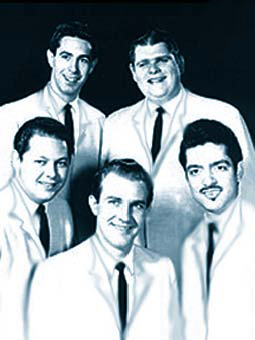
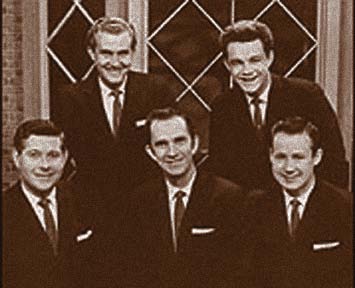
|
Simmons Brothers • Jay Simmons (bottom center) with the Prophets - 1962 • Jay Simmons (top left) with the Harvesters
|
|
XXXXNot long before Seals Hilton’s departure from the Plainsmen , Larry Denim left due to health problems. David Reece was call in to play piano for the group. David was born August 28th, 1928 in Jonesville, North Carolina. In 1953, at the age of twenty-five, he became a founding member of the Harvesters Quartet. David was always known for his comedic personality. Through the years he played with numerous groups including the Rangers Quartet, Blue Ridge Quartet, Imperial Sugar Quartet, Deep South Quartet and the Stamps Ozark Quartet, but his stay with the Plainsmen was of short duration, lasting only two or three months. A contemporary newspaper ad indicated that David and Seals were both still with the group in February of 1964. During David’s brief time with the group a second project was recorded for Heart Warming, Plainsmen Quartet New and Old Gospel Songs. David played on the session but his replacement, Eddie Crook, appears on the released album cover, and this was Jay Simmon's first recorded project with the group.
|
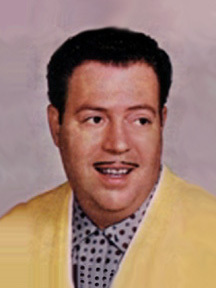
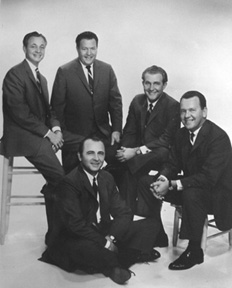
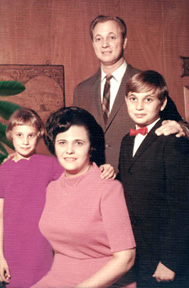
|
David Reece who played piano briefly with the Plainsmen • Plainsmen line-up during David Reece's brief time with the group - (l to r) Thurman Bunch - David Reece - Jay Simmons - Jack Mainord - (seated on the floor) Howard Welborn • Thurman Bunch and family in the 1960s
|
|
XXXXEddie Crook started his gospel music career playing piano with the Tennesseans in 1961. During the 70s he worked with the Happy Goodman Family, the Sego Brothers and Naomi, and Marty Robbins. Howard Welborn said one of the things he remembered about Eddie during his time with the Plainsmen was his frugality. As Howard good humoredly put it, “Eddie could squeeze the buffalo off a nickel!” That frugality and a propensity to taking care of business proved to be a winning combination for Eddie. In 1977 he founded the Eddie Crook Company that led to Eddie becoming recognized as one of the leading producers and label heads in gospel music. I asked Eddie about some highlights of the time he spent with the Plainsmen. He said that several things stood out in his mind, but probably getting to play the Houston Livestock Show and Rodeo at the Astrodome was among the top of his memories. Eddie also mentioned the group working with Billy James Hargis on some of his crusades. Billy was high visibility evangelist of the 1950s and 1960s who headed the Christian Crusade ministry in Tulsa, Oklahoma. At his peak, Billy was heard on over five hundred radio stations across the nation, and was on some two hundred and fifty televisions stations. He wrote the backliner notes on one of the Plainsmen projects.
|
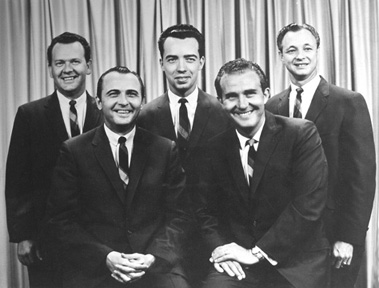
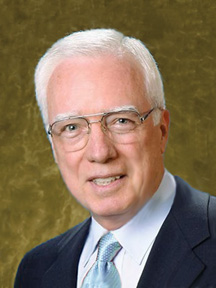
|
Eddie Crook (top center) with the Plainsmen - c. 1965 • Eddie Crook c. 2010
|
|
XXXXThere came a re-issuing of the Century Records / SIMS Touch the Hand of the Lord project on Hilltop Gospel Records. The album was released minus the original title song, and given the new title, The Plainsmen - When I Stand With God. This third release of the earlier recordings was pressed and later re-pressed with yet a fourth jacket design. Confused? Two additional projects on the Heart Warming label, The Plainsmen Sing Songs of Inspiration, and Wonderful Time Up There - The Plainsmen, were completed, before the next personnel change took place.
|
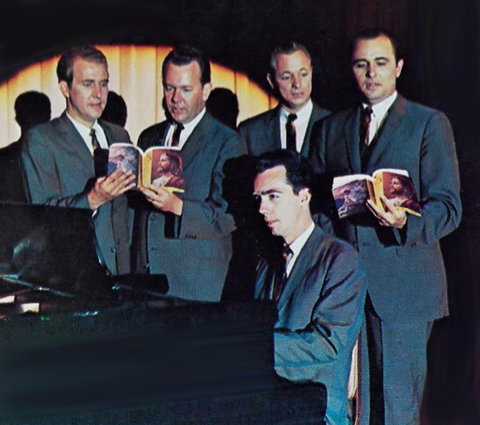
|
Picture from a Plainsmen photo shoot for a Heart Warming label album cover with Eddie Crook at the piano - c. 1965
|
|
XXXXThurman Bunch left the group and was replaced by Jerry Dean Redd on tenor. Jerry was born in Gadsden, Alabama, in 1936. At seventeen he joined his first group, the Campmeeting Boys, which would be just one of more than twenty groups he would be associated with through his music career. In addition to his tenor vocals, Jerry could play piano and guitar. With Jerry’s addition to the group came a new project, The Plainmen Little Is Much, for Heart Warming. On the heels of the new release Jay Simmons left. Howard Welborn contacted Gerald Williams to come onboard as bass. Adding to the confusion of “who’s on the bus,” Jerry Redd left and Bobby Edwards stepped into the tenor position.
|
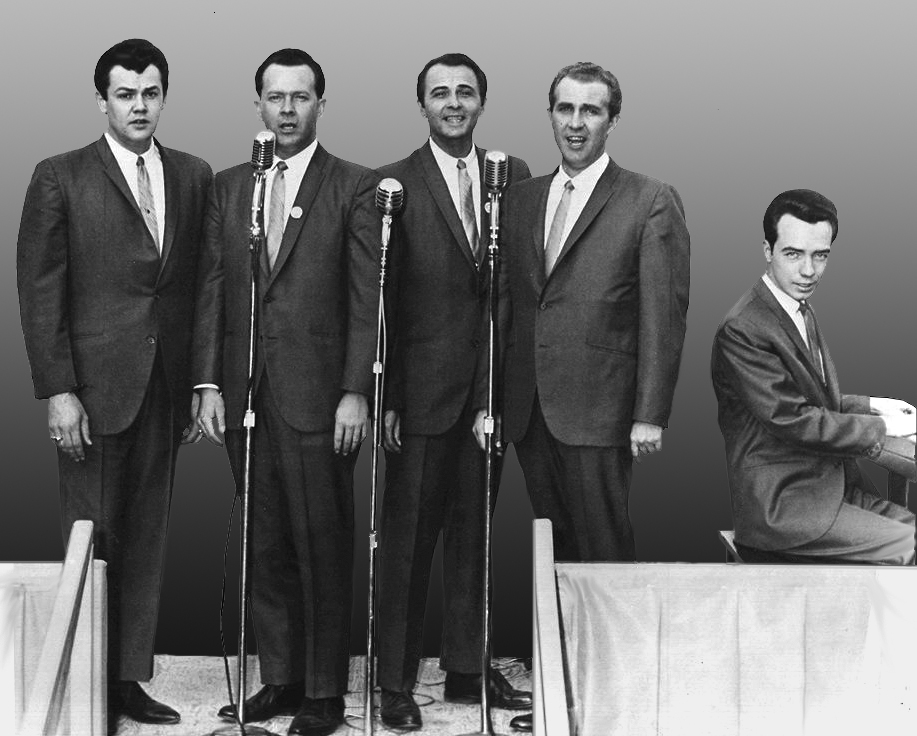
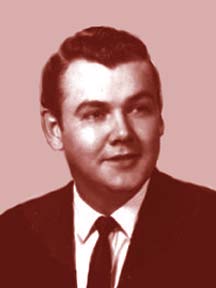
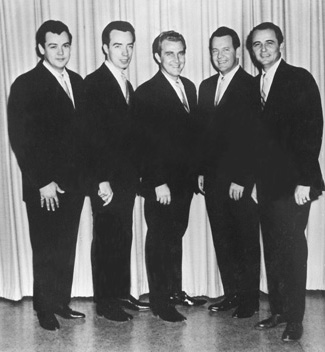
|
Plainmen in concert (l to r) Jerry Dean Redd - Jack Mainord - Howard Wilborn - Jay Simmons - Eddie Crook • Jerry Dean Redd • (l to r) Jerry Dean Redd - Eddie Crook - Jay Simmons - Jack Mainord - Howard Wilborn
|
|
XXXXGerald Don Williams was born October 7, 1933 at the community of Honey Hill near Searcy, Arkansas. At age twelve he attended his first singing school and shorty thereafter became a member of the Searcy Valley Trio. The group also included his future bride-to-be, Martha Bevill and her sister Irene. At fifteen, Gerald was joined by three other boys to form the Herchel Foshee’s Junior Quartet. In 1949 he became bass for Smilin’ Joe Roper and the Melody Boys of Little Rock, Arkansas, a group that had evolved from the Herchel Foshee’s Stamp-Baxter Melody Boys. A position with the Lindsey Brothers Quartet followed, and in 1958, Jerry Venable contacted Gerald about joining him in a new group he was putting together under the name of the Venable Quartet. Jerry and Gerald had worked together with Smilin’ Joe Roper and the Melody Boys, with Jerry having joined the group in 1952.
|
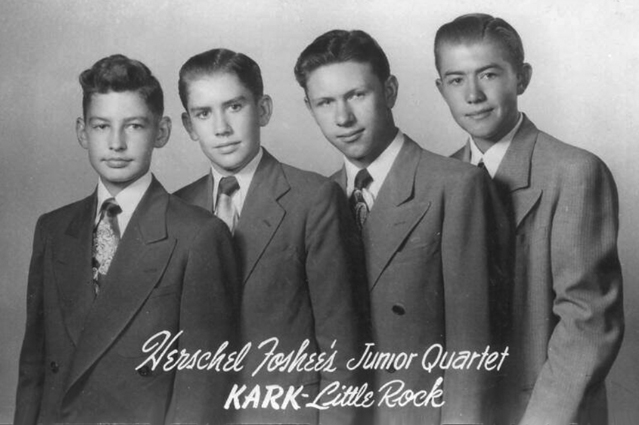
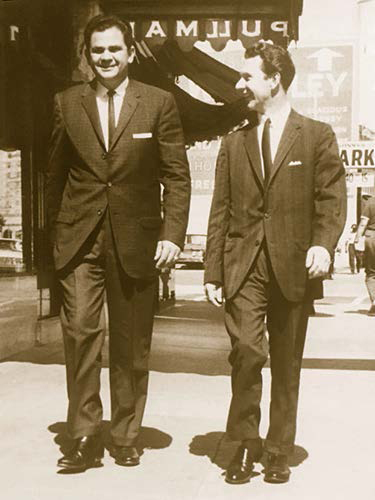
|
Promotional picture of the Herchel Foshee's Junior Quartet, with Gerald Williams (third from left) • Candid shot of Jerry Venable and Gerald Williams c. early 1960s
|
|
XXXXBobby Edwards was a founding member of the Trav’lers that had formed in 1961. An album, The Plainsmen Singing Fresh and New, was produced reflecting the new configuration but the new line-up lasted a brief seven months before Gerald left the group and returned to Little Rock, Arkansas. Tommy Randall took the bass position and a new album entitled The Plainsmen - Will the Circle be Unbroken, was recorded and released on the Concert label a subsidiary of Heart Warming.
|
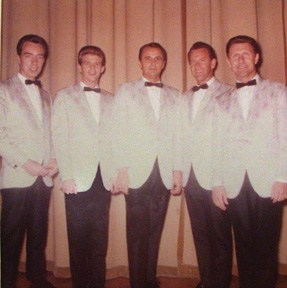
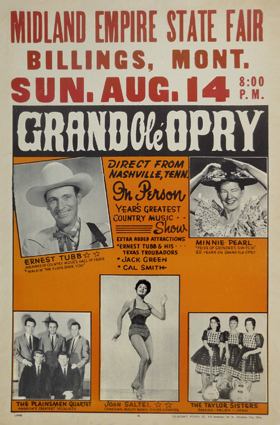
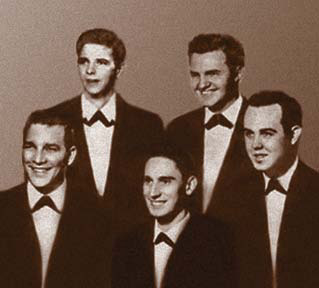
|
Eddie Crook - Bobby Edwards - Howard Welborn - Jack Mainord - Gerald Williams • Grand Ole Opry tour poster with the Plainsmen on the line-up from the time of Bobby Edwards being with the group - August 14, 1965 • An early picture of Bobby Edwards (top left) while with the Trav'lers - c. 1961-62
|
|
XXXXTommy Randall’s son, Alan, shared with Jason and me that his father was born in Gulfport, Mississippi, January 27th, 1934. Alan said that his father never received any professional vocal training, but was just naturally blessed with a smooth bass voice. Tommy started his quartet career in the early 1960s, singing with the Tall Men Quartet. Following his time with the Plainsmen, Tommy left the quartet circuit, until the early 1980s when he became a member of the Bibletones.
During the same basic time period, two compilation albums of previously released Plainsmen material was issued by Canaan Records, the primary gospel label that Marvin Norcross had created at WORD in competition with Heart Warming Records. The projects were self-titled, The Plainsmen Quartet - Volume One and Volume Two. XXXXChange had been in the air for some time, but the catalyst for major change had been the relocation of Easmon Napier to Wichita, Kansas. During the short four year span between Easmon’s move in 1962 and the coming of Tommy Randell to the Plainsmen in 1966, there were ten group member changes. Another factor was the completion of Jimmie Davis’ term in office. Even though the group continued to work out of Baton Rouge, Louisiana, the die had been cast and soon a new chapter of the Plainsmen story would open. XXXXEasmon had established himself with his teaching studio and music store, and had also strengthened ties with the local radio entrepreneur, Mack Sanders, with whom the Plainmen had previously crossed paths. Easmon began hosting a live, monthly, two-hour, Sunday afternoon program on Mack’s local KSIR station. The program was called, “The Singing Convention of the Air,” and featured gospel music preformed before a live audiance by local and regional talent. Occasionally Easmon would pull-in some nationally traveled groups as they were passing through the area. XXXXMack Sanders, whose birth-name was, John Bozeman, started his radio and country music career in Birmingham, Alabama during the late 1930s. During the mid-1940s he relocated to Shenanoah, Iowa, which had become a destination for broadcasters and musicians from around the country. In the 1920s two competing nurserymen / seed salesmen open high-powered radio stations in Shenanoah, Earl May with KMA and Henry A. Field with KFNF. Both stations were heard over vast areas of the nation, and both offered agricultural related programing, country entertainment, and hillbilly music. It was at Shenanoah that the Blackwood Brothers and the Everly Brothers came to national attention. By 1951 Mack was with KFH in Wichita, Kansas and formed a band he named the Ranch Boys. Soon he and the Ranch Boys were doing a noon-show on KFBI. Just as a note of interest, KFBI was a Kansas pioneer radio station going on air in Wichita in 1922 as a non-commercial station under the call letters of WAAP. Three years later the station was moved to Milford, Kansas as KFKB under the control of the highly controversial, Dr. John R. Brinkley. From 1936 to 1939, Paul Harvey, the long-time radio commentator, served as the station manager for KFBI. In 1955 Mack started hosting a program on KTVH-TV introducing western movies. About the same time he began working in conjunction with Hap Peebles, booking fairs, club dates, stage shows and dances. In 1958 he bought his first radio station, KSIR, in Wichita. His business partner in the venture was country music artist, Webb Pierce. KSIR was the first all-country music station in the Wichita market. |
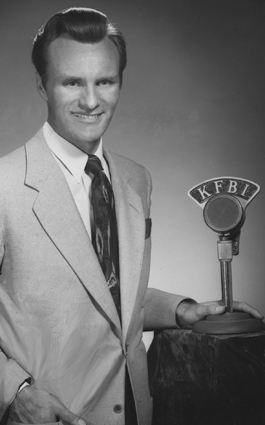
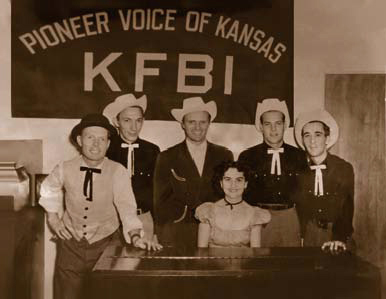
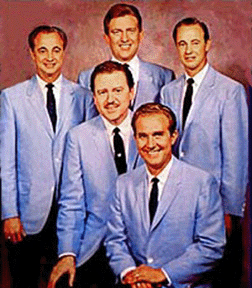
|
Early promo shot of Mack Sanders at radio station KFBI in Wichita, KS • Mack Sanders (center) and the Ranch Boys, with Mack's wife, Jeannie Pierson seated at the piano - early 1950s • The Marksmen - (top l to r) Thurman Bunch - Jerry Minshall - Erman Bunch - (center seated) Easmon Napier - (seated in front) Jay Simmons - 1966
|
|
XXXXMack Sanders was very aware of how well the Plainsmen drew on the country package show circuit, often proving more popular with the concert goers than the featured headliner. Mack was an individual who thought on a grand scale and was at one point interested in aquiring a theater in Wichita, so that in conjunction with his radio empire, he might create a “Grand Ole Opry”-type venue. He wanted the Plainsmen, or similar style group, to work in conjunction with his radio station promotions and his country music package shows. It seems that the Plainsmen may have been contacted with the idea of the group relocating to Wichita, but without the results for which Mack had hoped. At that point it was decided that a new quartet would be created, under the name of The Marksmen.
XXXXJerry Minshall told me that work on pulling together the Marksmen started in ernest in the fall of 1965. Easmon contacted Jay Simmons and Mack flew Jay to Wichita to discuss plans for the new group. Jay signed-on and Thurman Bunch was next to commit. By spring 1966 the Marksmen lineup had firmed up, with Easmon Napier on piano serving as emcee, Jay Simmons bass, Jerry Minchall baritone and Thurman Bunch tenor. Jerry said that a gentleman from Oklahoma by the name of Lanny Watson or Watkins was selected to sing lead. However, Lanny had a personal situation arise shorty after the group’s first few appearances and Jerry Venable was brought in, somewhat spur-of-the-moment, to fill the opening. Jerry Venable stayed long enough to record the group’s debut project, The Marksmen - Cowboy Camp Meeting In The Sky. The project was recorded at the Columbia Studio in Nashville, and released on the Jubilee Records label in New York. Upon completion of the session, Jerry returned to Little Rock and his replacement, Erman Bunch, appeared on the cover shot of the album. XXXXJerry Minshall was born near Kirksville, Missouri. At an early age Jerry became interested in country and gospel music and, radio. At age fifteen he began his broadcasting career working on-air at his hometown station, KIRX. After earning a teaching degree in music, he sought a position in the school system in Nashville, Tennessee, but found nothing open. He briefly worked with Ron Blackwood’s group in Memphis, Tennesse, but said things just didn’t mesh. He found a teacher opening near Wichita, Kansas, in the outlying community of Bently. Jerry said that he was aware of the music and broadcasting that was going on in the Wichta area, and that the city was a regular stop for the Plainsmen, whom he had booked into Kirksville. He approached Mack Sanders about working at KSIR but nothing came of the interview. Eventually, Jerry returned to Kirksville to work at the local radio station. In an odd twist of events, Mack Sanders was piloting his airplane over north-central Missouri, and picked-up a local radio station, liked the on-air personality, and recognized him to be the same young man who sometime before had come to KSIR seeking a job. Soon, Jerry was back in Wichita. He joined a local quartet, the Ambassadors, and recorded one album with the group. Then Jerry became a part of the Easmon Napier Trio, a group created to be regulars on Easmon’s program and to preform at other KSIR related functions. In addition to Jerry, the trio consisted of the station’s bookkeeper, Maxine Harper, and a local singer, Loretta Wohlschlegel, with Easmon providing accompaniment at the piano. Not long after the formation of the trio, Mack, enlisted Jerry to become a part of the Marksmen. |

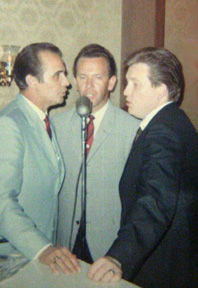

|
Album with Jerry Minshall (second from left) recorded while he was working with the Ambassadors Quartet in Wichita • Trioing (l to r) Howard Welborn - Jack Mainord - Jerry Minshall - June, 1967 • The Marksmen in a television studio (standing l to r) Thurman Bunch - Erman Bunch - Jerry Minshall - Jay Simmons, (seated) Easmon Napier
|
|
XXXXWith four former Plainsmen in the group’s lineup many listeners thought the Markmen sounded more like the Plainsmen, than the Plainsmen! They were hot, and they were good. Easmon Napier was back in his element, pounding the ivories, and telling stories to the delight of the audiences. He one-time confided in me, that he did not feel he was a very good piano player, he felt there were others within the quartet circuit, that could out play him. That may or may not have been the case, but where Easmon excelled was in his showmanship. He knew how to sell himself to an audience, and the folks in the seats loved him. Ben Pegues said he overheard Marvin Norcross, of WORD records, declare that Easmon Napier was, “The greatest entertainer in the history of gospel music!” That was a bold, and personally opinionated statement, but coming from someone who during his career had heard the best of the best, it was definitely a compliment.
XXXXSoon a second project was recorded at Columbia Studio in Nashville, The Marksmen - Gospel Today, and released on Jubilee. The group was working a busy schedule that included Mack Sanders radio promotions, regular appearances on television programs such as the nationally syndicated “Cudahey Bar-S-Jamboree” and Mack’s own “Country Music Jamboree” that aired weekly in several major markets. Additionally, there were numerous package show tours with major country artist. Jerry Minshall recalled in particular a ten-day tour with Jimmy Dean. Jimmy was riding high with his own weekly, country-based variety show on national television. In the life of a group, busy is good. XXXXOnce again, Mack Sanders, started negotiating with Jack Mainord to come to Wichita, Kansas. Mack wanted to reunite the Marksmen members and Jack back under the Plainsmen name. An agreement was eventually reached between Mack, Jack, and the Marksmen, whereby Jack assigned the Plainsmen name to Mack and agreed to the merger. Under the proposed agreement, each Plainsmen member would hold shares in the group, but Mack would hold the controlling interest. In early April, 1967, Jack, and his wife, Melba, moved from Baton Rouge to Wichita. The Plainsmen had officially become a part of Mack’s radio empire, but the exact lineup of the Plainsmen in Wichta was still somewhat up in the air. Some of the Louisiana Plainsmen, including Eddie Crook, were not interested in making the relocation to Wichita. There were questions as to whether or not longtime Plainsmen, Howard Welborn, was going to be in the new lineup. On the Marksmen side, Erman Bunch headed back to his old stomping grounds, and Mack had radio station related plans for Jerry Minshall’s near future. Initially, it seemed a tentative merged lineup would be comprised of Jack Mainord - lead, Thurman Bunch - tenor, Jay Simons - bass, Easmon Napier - emcee and piano, with a new member, Dwight Hicks - baritone. Dwight was a quiet, unimposing Texan, who always did a good job singing his part, and of taking care of his personal life. He and his wife, Anna, were very involved in the activities of their church. Earlier in his music career, Dwight had sang tenor with the Songfellows in California and worked with Charles Cruce in the Travelers Quartet. Dwight also possessed the skill of piano tuning, and did tuning work at Easmon’s music store. He was just an all-round, nice guy. As for the proposed lineup, it was not to be, at least not at that time. |
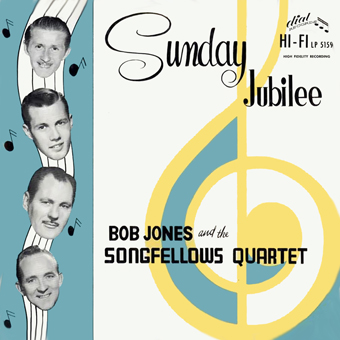
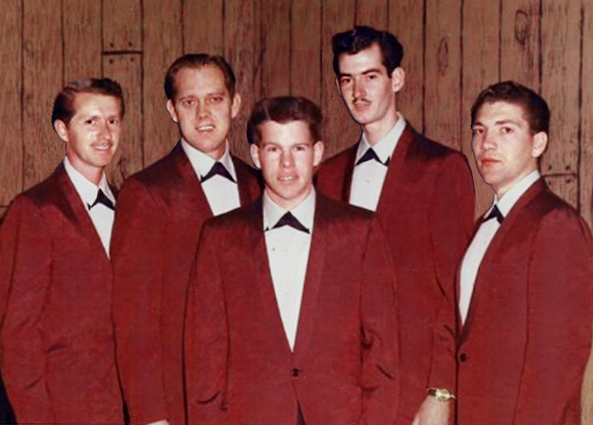
|
Dwight Hicks (top left) on the cover of the Songfellows first long-play album that was recorded at Dial Records in Hollywood, California, and said to have released in 1958 • Dwight Hicks (far left) and Charles Cruce (far right) while with the Travelers Quartet
|
|
XXXXMack Sanders was also in a period of transition. He had aquired a new station, KFRM, that had a much larger footprint than KSIR. This new station, with its transmiter in Salina, Kansas, and studios in Wichita, was going to give Mack access to listeners and potential advertisers over all of Kansas, the eastern half of Colorado, two thirds of Nebraska, most of Oklahoma, the western edge of Missouri, much of the Texas panhandle, even the northeast corner of New Mexico. This newly aquired station also held great potential for the Plainsmen. However, due in part to Mack’s focus on working out operations of the new station, firming up of the group took second place, and confusion over the group’s new lineup continued. Soon, Easmon Napier and Thurman Bunch were out of the picture as potential Plainsmen members. Easmon continued his program at the radio station, but Thurman head back South. By late summer the Plainsmen lineup had momentarily locked-in with Jack Mainod, Howard Welborn, Jay Simmons, and Jay’s nephew, Leon "Lee" Simmons doing double duty, singing and playing piano. The group was working in conjunction with station promotions, and in September, was featured at the Kansas State Fair, but operational problems of the group lingered. The continued turmoil prompted Jack Mainord and his wife, Melba, to return to Baton Rouge in the fall of 1967, for some six to eight months. Melba told me that during the return time to Baton Rouge, Jack did not sing with anyone. In Wichita the Plainsmen continued plodding along with shifting configurations of personnel. Jerry Minshall, Dwight Hicks, and Jerry Venable, who became a reoccurring member, and probably a half a dozen others were pulled together in varying lineups to fill dates.
|


|
Sherrill "Shaun" Nielsen (far right) with the Marksmen of Clarksville, TN • Sherrill Nielsen's first album
|
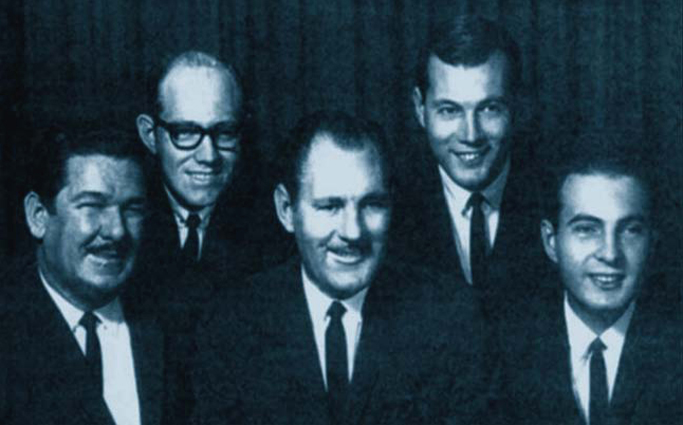
|
Sherrill with the Songfellows Quartet based in California
|
|
XXXXOne of the Plainsmen group members during that era of relocation and change was the gifted tenor, Sherrill Nielsen. Born on September 10, 1942 in Montgomery, Alabama, Charles Sherrill Whitaker grew up to have a long, varied, and successful music career. Sherrill was adopted and raised by his maternal grandparents bringing about the change of his last name to, Nielsen. He became active in music during his childhood, and by the age of fifteen had recorded his first full-length record album. Sherrill relocated to Nashville, TN to attend Trevecca Nazarene College (now Trevecca Nazarene University). During this time he began singing with, and playing piano for, a group that was headquartered about forty-five miles northwest of Nashville in Clarksville,Tennessee, ironically named the Marksmen. While attending Travecca, Sherrill was drafted into the United States Air Force where he sang with U.S.A.F. Strategic Air Command Band. In 1960, following his time in the military, he headed to California to work with the Songfellows Quartet. He had been recommended to the group by, Jake Hess, who was at the time working with the Statesmen Quartet. Jake had heard Sherrill sing at one of Walley Fowler's "All-Night" singings in Nashville. Jake was impressed and had hung on to Sherrill's contact information. By 1961, Sherrill had returned back east to join the Speer Family. G.T. "Dad" Speer had suffered a heart attack and Sherrill had been called to fill the vacancy in the group. In 1963, Sherrill met and married, Brenda Hall. Just as a human interest footnote, Sherrill and Brenda went their separate ways in 1967, only to be re-married almost four decades later in 2005! 1966 found Sherrill back in California, once again working with the Songfellows Quartet.
|


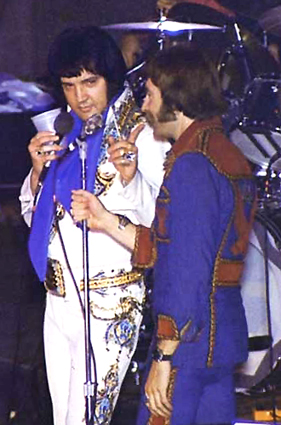
|
Sherrill Nielson with Speer Family (top row, l to r) Ben Speer - Sherril Nielson - Brock Speer (bottom row, l to r) Ann Downing - Faye Speer • Sherrill Nielson with the Statesmen Quartet (standing, l to r) James "Big Chief" Wetherington - Doy Ott - Jim Hill - Sherrill Nielson (seated) Hovie Lister • Sherril Nielson on stage with Elvis Presley
|
|
XXXXAccording to information supplied by Sherrill's wife, it was Howard Welborn who contacted Sherrill about singing with the Plainsmen. She said that in December of 1966, or January of 1967, Sherrill joined the group in Baton Rouge, LA, and was among the members who relocated to Wichita, KS. In Wichita he was caught in the everchanging Plainsmen personnel line-ups, at times performing with the group and at other times pursuing a solo career. During his time in Wichita, Sherrill released a great cover single on RCA Records of "Funny How Time Slips Away," and organized his own group, Sean Nielsen and the Good Ole Boys. It should be noted that through the years Sherrill performed and recorded under several name spellings including Sean Neal, Shaun Nielsen, Sean Nielsen and Sherrill Nielsen. After his stay in Kansas he moved to Atlanta, GA to work with Hovie Lister and the Statesmen Quartet. In 1973, Sherrill, returned to Nashville where he formed a group called Angel Band, that became the Tennesse Rangers, and was later be renamed, Voice, by Elvis Presley. Sherrill, and his group, soon joined the Elvis organization where he remained until Elvis' death in 1977. He returned to a solo career before joining the Masters V in 1983. The same year Sherrill was ordained in the American Episcopal Church. He eventually moved to Denmark where he lived for over a decade, before before moving back to the United States in 2004.
|
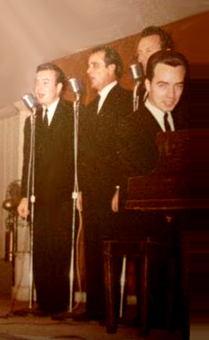
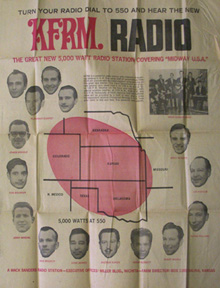
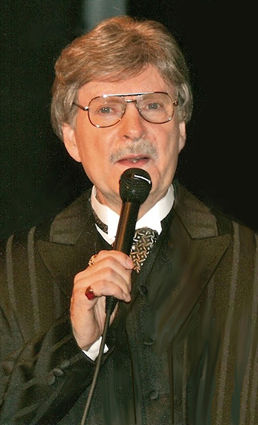
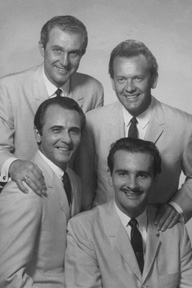
|
Sherrill "Shaun" Nielsen with the Plainsmen in early 1967, prior to the relocation of the group to Wichita, KS (l to r) Sherrill Nielsen - Jay Simmons - Jack Mainord - Eddie Crook (Note: from the photo it would seem that the group is in a trio "fill-the-date" mode, with Sherrill on tenor, Jay on lead, and Jack on baritone. Sometime you've gotta do, what you've gotta to do! Nothing like flexibility.) • KFRM full page newspaper ad from 1967 showing the on-air personnel. The Plainsmen are shown in a four member configuration. Jerry Minshall and Easmon Napier also appear in the ad) • Sherrill Nielsen in later years • Plainsmen promo picture from September, 1967 (top two, l to r) Jay Simmons - Jack Mainord - (bottom two, l to r) Howard Welborn - Jay's nephew, Leon "Lee" Simmons
|
|
XXXXMack Sanders re-contacted Jack Mainord admonishing him to end his self-imposed exile in Louisiana, and return to the Sunflower State. Mack painted a rosie picture, indicating that many of the earlier problems had been resolved, and that all was blue skies and sunshine. So, Jack returned to Wichita in mid-1968, but it would still be several months before the Plainsmen lineup stabilized. About this time the group consisted of Jack, Howard Welborn, Dwight Hicks, Jay Simmons, and Charles Harold Cruce on piano, whom Howard had briefly worked with a decade earlier in the Lone Star Quartet. Soon Howard Welborn was gone back to his home in Georgia and Jerry Venable once again begain filling dates with the group. As a footnote, Howard Welborn eventually formed his own Plainsmen group in Georgia consisting of himself on baritone, Roy McNeal - lead, Earl Black - bass, Jeff McNeal - tenor, and Charles Cruce - piano. This group produced one custom album, Plainsmen - When Morning Comes. There seems to have been a challenge over the use of the Plainsmen name, and the Georgia group evolved into the Ambassadors Quartet.
|
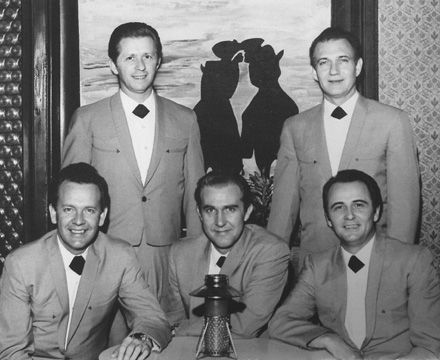
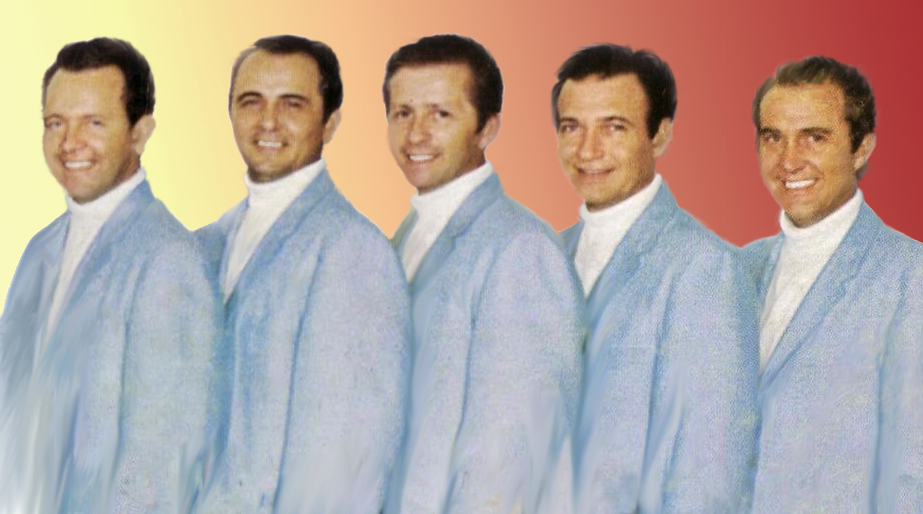
|
The Plainmen line-up in 1968 (top row, l to r) Dwight Hicks - Charles Cruce, piano player - (bottom row, 1 to r) Jack Mainord - Jay Simmons - Howard Welborn • The quickly passing turtle-neck shirt phase of the Plainsmen (top row, l to r) Jack Mainord - Howard Welborn - Dwight Hicks - Charles Cruce - Jay Simmons
|
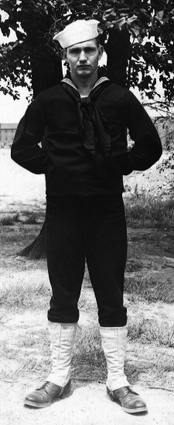
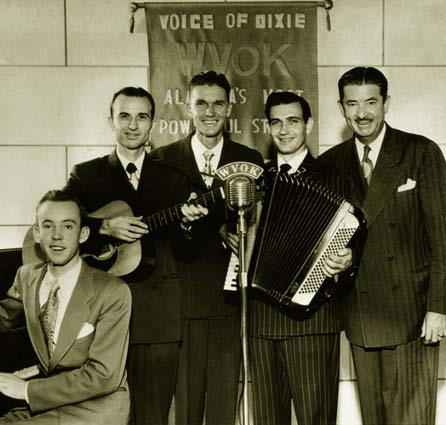
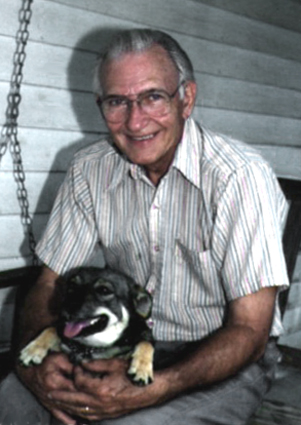
|
Charles Cruce while serving in the military • Charles Cruce playing accordian with the Harley Lester Quartet at radio station WVOK in Birmingham, Alabama - c. 1950 • Charles Cruce - c. 2000
|

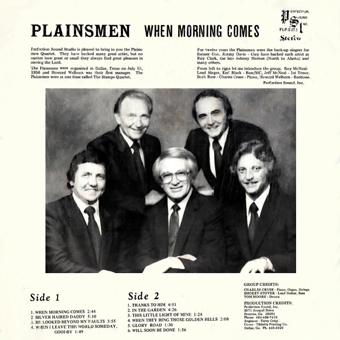
|
Cover of the project created by Howard Welborn's Georgia based Plainsmen • Backliner picture (top row, l to r) Charles Cruce, piano - Howard Welborn, bariton (bottom row, l to r) Roy McNeal, lead - Earl Black, bass - Jeff McNeal, tenor
|
|
XXXXSometime during the season of confusion, Mack relocated Jerry Minshall to Salina, for a while, to work more closely with the operations of KFRM. Salina sits about ninety miles north of Wichita. Jerry, his wife, Jan, and Maxine Harper formed the, Jerry Minshall Trio, and continue working the KFRM promotions. Eventually, some order reigned, and Easmon Napier, along with Thurman Bunch, were drawn back into the fold. The lineup reverted back to what seems to have been the original intent following the Marksmen shut-down, Thurman - tenor, Jack - lead, Dwight - baritone, Jay - bass, and Easmon as emcee and piano player. For product, reflecting this re-organized Plainsmen, a new album featuring the new group on the cover, but composed to a large extent of previously recorded Marksmen cuts, was released as a custom pressing under the title of, The Plainsmen - Just A Little Talk With Jesus. When listening to the project one can readily hear Jerry Minshall singing lead on several of the songs, but he does not appear on the album cover.
|
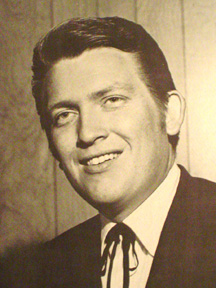
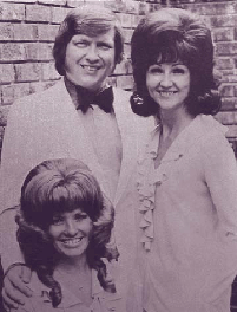
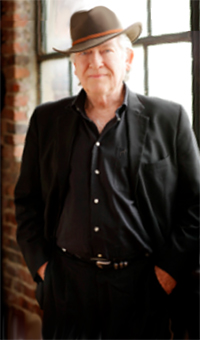
|
Jerry Minshall. photo from KFRM promotional materials - c. 1968 • Jerry Minshall Trio that formed after Jerry's time with the Marksmen - (top) Jerry Minshall - Maxine Harper - (bottom) Jerry's wife, Jan • Jerry Minshall - c. 2013
|
|
XXXXDuring the years leading to the creation of the Marksmen, and through the transition of the Plainmen to Wichita, Easmon kept his teaching studio and music store going with a half-a-dozen employees. Although I mention my somewhat rocky start with Easmon, he proved a great mentor. I learned much from Easmon and he was very helpful in developing my music career. Early on, he brought me, and my music to the attention of Marvin Norcross at WORD Records, and in the summer of 1963 arranged a meeting for me at Roy Acuff’s Hickory Records in Nashville. He was also instrumental in setting up one-on-one meetings with folks like the Goodmans to pitch my early music compositions. When Haskel Cooley left Easmon’s employment to enter the military, my future wife-to-be, Jill Seiler, who had taken piano lessons from both Haskel and Easmon, eventually took Haskel’s teaching position. Later, I too began teaching piano at the studio. As student, and later instructor, at the Easmon Napier School of Music, I appeared as a regular on Easmon’s radio program. Likewise, Jill often appeared on the program. We spent a lot of time with Easmon, and not all of that time was taken up with music. Some was more leisurely and social in nature. Easmon loved to fish, and we would accompany him on his angling outings. Most were successful, and we would find ourselves cleaning crappie and bass back at his house around midnight, frying up the catch-of-the-day and then devouring it with a simple fare of corn bread and green onions.
|
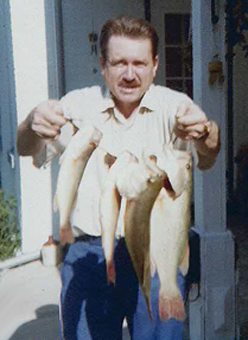
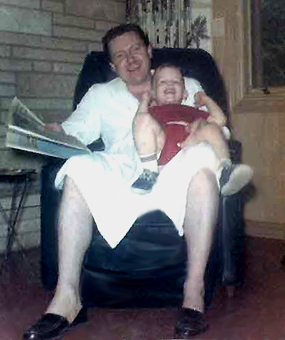

|
Easmon Napier with the catch of the day • Easmon Napier relaxing with his son, James Andrew Easmon Napier (what a moniker for a little kid... we just called him "Andy") • Easmon Napier at the wedding of his oldest daughter, Carrol
|

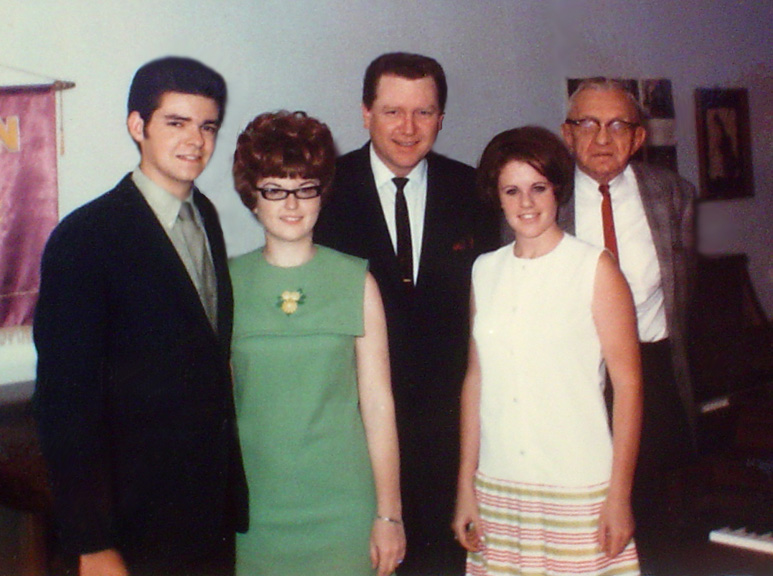
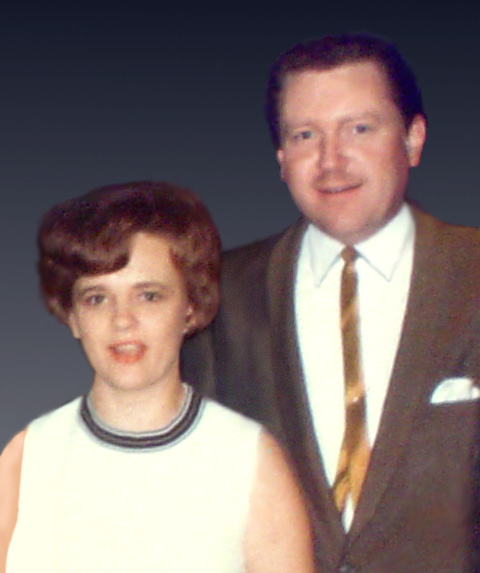
|
Easmon Napier, Christmas Eve, 1967 • Some of the Easmon Napier School of Music staff - Ernie Couch - Jill Seiler (Couch) - Easmon Napier - Lynn Gregory - Phil Allen - July 2nd, 1968 • Easmon Napier and wife Billie
|
|
XXXXThe summer of 1969 was a busy time for me. Jill and I got married in June with Jerry Minshall singing at our wedding. Of course Easmon and his wife Billie, were in attendance along with two hundred and fifty, piano students, friends and well-wishers. At the time I was working with a trio, and the day following the return from Jill's and my honeymoon, I was taken away from my new bride on a ten day-tour to the West Coast. Earlier in the month, while dealing with last minute wedding details, I recorded my first full-length solo album at Larry Benson’s studio in Oklahoma City. Easmon penned the backliner notes. A little later in the year, the Plainsmen recorded a new project, The Plainsmen Sing Inspirational Songs that released on Altair Records. The group recorded one of my early songs for the project, “He’ll Be There,” that featured Jack Mainord.
|
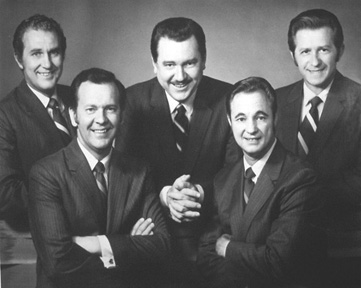
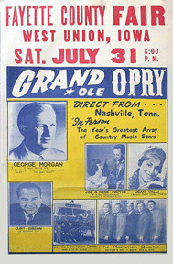
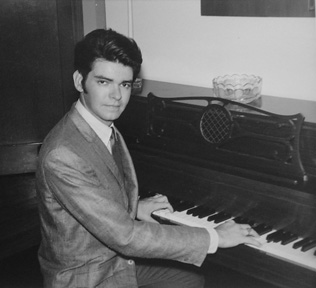
|
The Plainsmen in 1969 (l to r) Jay Simmons - Jack Mainord - Easmon Napier - Thurman Bunch - Dwight Hicks • Fair poster from summer, 1969. Plainsmen in lower right corner • Ernie Couch, fall 1969
|
|
XXXXMy mother had started me taking piano lesson when I was six. By nine I was singing at local churches, and I started accompanying myself, having found accompanists in short supply. At thirteen I became a regular on a weekly kiddies television program hosted by Hiram Higsby on KTVH-TV. I would play and sing between Mr. Magoo cartoons! KTVH was the station on which Mack Sanders had earlier hosted his program. Mack and Hiram had broadcasting ties and I seem to recall that Hiram did some work at Mack’s KSIR radio station. Hiram was a great guy who had started his career with a hillbilly band over Doc. Binkley’s station in Milford, Kansas, and as a comedian on Chicago’s WLS “Barn Dance.” He had hosted a long-running radio variety show the “Brush Creek Follies” in the Kansas City market during the 1940s and early 1950s, and later, a popular kiddies television show in Tulsa, OK. Toward the end of the run of the television show on KTVH I recorded my first record, a four cut project that was pressed on the Sword & Shield label ran by the Wills Family in Arlington, Texas. I soon joined my first quartet, the Capitolaires, later known as the Masters Quartet, and a couple of years later started working with the Cliff Lawson Ozark Gospel Trio followed by the Travelers who worked out of Tulsa.
|
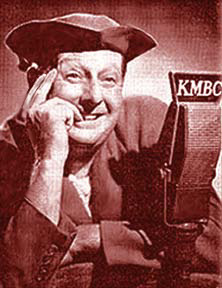
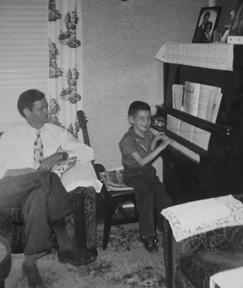
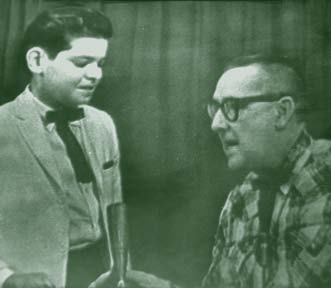
|
Hiram Higsby - early 1950s • Six-year-old Ernie Couch with his father, Berry Everett Couch, and his first piano • Ernie Couch and Hiram Higsby at KTVH-TV in Wichita, Kansas - early 1960s
|
|
XXXXLate in 1969 or very early in 1970, Thurman Bunch left the Plainsmen and Jerry Venable filled the opening. What a trooper. Jerry P. Venable was born in Arkansas, September 20, 1925, and as mentioned earlier, he had worked with the Melody Boys Quartet and for many years with his own group. Relocating to Wichita, Jerry became integrated into Mack Sander’s broadcasting empire, holding various positions with the company, for over three decades. Aside from having a good voice, Jerry brought a lot of fun to the Plainsmen. During warm-ups, or at half-time breaks in concerts, Jerry would do his “Old Timer” routine, a Charlie Weaver-type character. For the edification of the younger generations, Charlie Weaver was a popular character developed by performer, Cliff Arquette in 1959, whom often appeared on 1960s television variety shows, sit-coms, and game shows. Usually, Easmon or Jack, would play the straight man feeding Jerry a series of questions to which he who would supply the comedic replies.
|
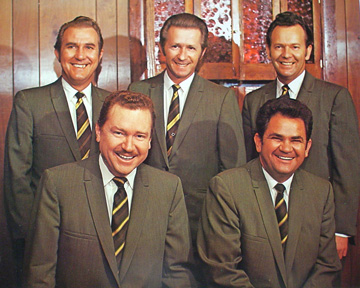
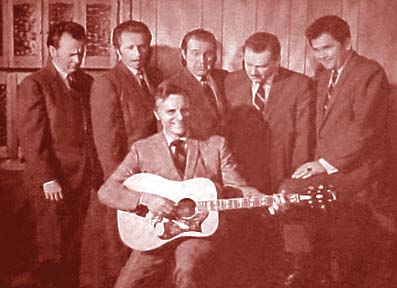
|
The Plainsmen in 1970 (top, l to r) Jay Simmons - Dwight Hicks - Jack Mainord - (bottom, l to r) Easmon Napier - Jerry Venable • The Plainsmen with Mack Sanders
|
|
XXXXComedy had always been a part of the Plainsmen concerts. Time-worn vaudevillian routines were repeated over-and-over to audiances who knew all the lines, but felt shorted if they were not subjected to another serving of the same old stitch. Three of the oft repeated routines were the “Right-toe,” “Seersucker,” and “Singer”. Whoever was serving as emcee, introducing the other group members, would single-out one of the guys and ask a series of questions. In reply to each question posed, the member being introduced would reply, “right-toe.” After about a dozen replies of, “Right-toe.” the emcee would stop and ask, “Why do you keep saying, right-toe?” The stock answer was always, “You’re standing on my right toe!” All pure corn. The audiance would chuckle, moan and groan. In the Seersucker routine the emcee would comment, during the introduction of a member, that he really liked his suit, and would inquiry as to what type of fabric the suit was made. The reply would be that the suit was seersucker, adding, “The suit was at Sears, and I’m the sucker who bought it.” More corn, piled a little higher. As a side note for those in the twenty-first century, who may not be familiar with seersucker, it is a light-weight all-cotton fabric that became popular for spring and summer clothing. According to Wikipedia, the word originated from the Persian “shir o shekar,” that means “milk and sugar,” probably due to the smooth and rough texture pattern of the fabric. Then there would be the Singer routine where the emcee would say that the member being introduced came from a long line of singers... his grandmothers were singers, his grandfathers were singers, his mother was a singer, his father was a singer, his brothers and sister were all singers... why even the family’s sewing machine was a Singer. Rim shot please! It was always the same old corn, time and time again, and amazingly, it always sold.
XXXXEasmon had a popular routine where he would tell the “Fight Yarn,” a droll recounting of his childhood encounter with a school-yard bully. He would tell of how he went about whipping-up on the bully by ramming his stomach into the bully’s head, punching his eye into his opponent’s fist, and by putting his nose between the bully’s teeth. There would be a lot of knee-slapping, spitting and sputtering, and gasping for air, and that was just from the audience! The story became so often requested, that Easmon finally put it on the group’s first LeeMac record, a combination country and gospel project, The Plainsmen Sing Your Requests. Easmon would also do a little slap-stick routine, where he would launch into a long two-handed arpeggio up the ivories, culminating with his hands flying off the end of the keyboard, and hurling himself off the piano bench onto the stage. The audiance would laugh and squeal. XXXXIn 1970, I had already taken several broadcasting courses at Wichita State University, and was doing some on-air work at KMUW-FM, the on-campus station. Mack Sanders got wind of my college studies and offered to send me to broadcasting school in Dallas, Texas, if I would come back and work for him. I was appreciative of his offer, and gave it due consideration, but I decided that I was more interested in making music, than in spinning other folks music on the radio. So, I chose to pass on his kind offer. XXXXThe same year, with the Plainsmen facing an ever increasing travel schedule, Jill and I took over the studio and music store from Easmon. We continued to sell pianos and organs, brought in a guitar teacher, an organ instructor, with Jill and I giving private lessons to eighty-five piano students each week, and Jerry Minshall giving voice lessons. These were college years, and both Jill and I were involved on the music staff of our local church. We soon learned that we were not cut-out to be proprietors. You are the first to arrive and the last to leave. Come to think of it, its like having your own group. Jason and I, with the other group members, are usually the first to arrive at a venue and the last to leave! After a couple of years Jill and I decided to merge with another music store and teaching studio in Wichita. In 1972, I graduated from WSU with a degree in Graphic Design, and went to work for an advertising / publishing company. In the fall of 1972, I spent a short time filling-in on piano with the Telestials, who were working out of the south Georgia town of Quitman. It was while I was with the Telestials I received a call from Jill that we were going to become parents, and on March 23, 1973, Jason appeared on the planet. In November of 1974 we piled our stuff into a U-Haul truck and headed to Nashville. XXXXAfter 1970, I had less contact with the Plainsmen. I attended an occasional concert, but lost all contact with Easmon and the guys when I relocated to Nashville. The group continued to preform and record. In late 1970 to early 1971, Plainsmen - He’s The Lily Of The Valley was then released on Wayne Raney’s Rimrock Records. At the time, Wayne had a recording studio in the north-central Arkansas town of Concord. Wayne, a harmonica player, song writer, and singer, was born in Wolf Bayou, a small community near Batesville, Arkansas, in 1921. He became popular in the 1940s with such recordings as “Harmonica Blues,” “Lost John Boogie,” and, “Jack and Jill Boogie.” |
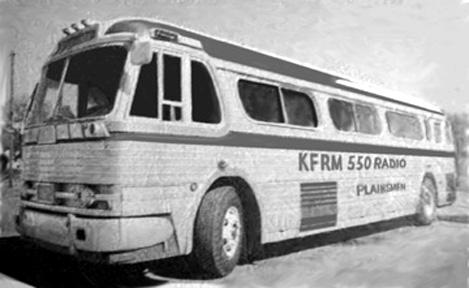
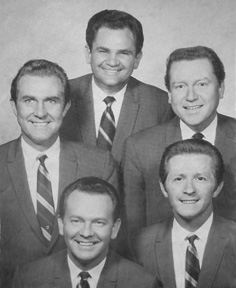
|
KFRM / Plainsmen bus - "the owl stopper" • The Plainsmen of 1971 with the same line-up as the previous year
|
|
XXXXMack Sanders decided to start his own record label and named it, LeeMac. The Lee portion for the company’s name came from his partner in the venture, Lee Nicols. During the 1950’s Lee had been a high-visibility radio personality in the Wichita market. I can remember as a little kid going with my parents to the old KWBB studios to watch Lee Nicols do his thing. He was one of the first DJs in Kansas to play rock ‘n’ roll music over the Kansas airwaves, and in 1956 he introduced Elvis Presley to 4,000 plus, screaming fans in Wichita. I guess all of his exposure to high-energy, hard-driving music was good for him. He lived to be ninety-nine. The second project released on the LeeMac label was the self-titled, The Plainsmen, with Jack Mainord, Jerry Venable, Dwight Hicks, Jay Simmons, and Easmon Napier pictured on the album cover.
XXXXIn the same time frame the Plainsmen cut a jingle for the Sandy’s hamburger franchise, touting the chain’s “Big Scott” hamburger. The jingle was a parody of Jimmie Dean’s 1961 mega hit, “Big Bad John” and featured the booming voice of Jay Simmons. The Sandy’s company had two hundred-forty locations across the midwest when they merged with Hardees in 1972. XXXXJack Mainord had a great story from the group’s travels during this time. He said they were in the KFRM bus, cutting across the Kansas prairie in the early hours of the the morning, heading back to Wichita from a concert. The bus was a General Motors model 4104. The vehicle had not been customized other than the back half of the original seating had been removed to create an open area where clothes could be changed, and to provide a place where one could stretch-out on the bus floor for a few minutes of sleep. There were no permanent partitions, just a straight shot, front to back. This model of bus featured a split windshield design. In the dark of the night the trajectory of the bus intersected with that of a large owl, resulting in the owl slamming through the passenger side of the the windshield. An explosion of glass and feathers filled the bus with the unfortunate nocturnal creature being stopped by slamming into the back wall of the bus. Jay Simmons told me that he had been napping on a mat on the floor in the back portion of the bus, when he was jarred back to consciousness by the loud commotion. He said he awakened to find himself, unexpectedly, eye-to-eye with a big bird. Jack did not say who was driving when the incident occurred, but only that they were able to get the bus stopped safely on the shoulder of the highway. After a quick check to insure everyone was okay, Jack made his way to the back of the bus where he found a startled Jay Simmons, and a badly disoriented owl staring at each other. Miraculously, the bird had survived both the windshield and back wall impacts, and showed no signs of broken limbs. Jack said he picked up the dazed creature, went to the front of the bus, open the door, and sat the bird on the bottom step in the doorwell. He said the owl shook himself a time or two, and then flapped silently off into the night, apparently none the worse for the ordeal. The rest of the half-windshield trip to Wichita was uneventful, but rather breezy. |
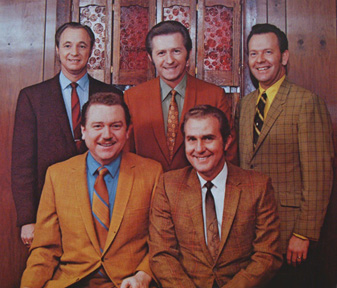
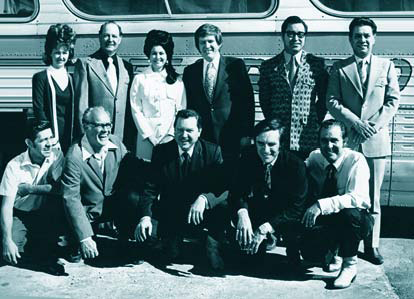
|
Return of Thurman Bunch (upper left) to the Plainsmen line-up - December, 1971 • Some of the KFRM crew (top row l to r) Maxine Harper - Lee Nichols - Jeanie Pierson - Jerry Minshall - Larry Steckline - Abram Burnett (bottom row l to r) unidentified - unidentified - Easmon Napier - Mack Sanders - Jay Simmons
|
|
XXXXMack Sander’s had made inroads with Hickory Records in Nashville, and soon had the Plainsmen a record deal with the label. Thurman Bunch returned to the tenor position, and in December, 1971, the group headed to Nashville, and recorded, The Plainsmen In Gospel Country, at the Acuff-Rose Sound Studio. The project released in early-1972. A second project, was recorded at the Acuff-Rose facility in Nashville, in early fall of 1973. The combination country and gospel project called, Both Sides Of The Plainsmen, was released on the Hickory label in early-1974, but was manufactured and distributed by MGM Records. Gerald Williams is shown on the album cover, but it was Jay Simmons who actually sang on the session. Gerald had returned to the group in October, 1973 to replace Jay.
|
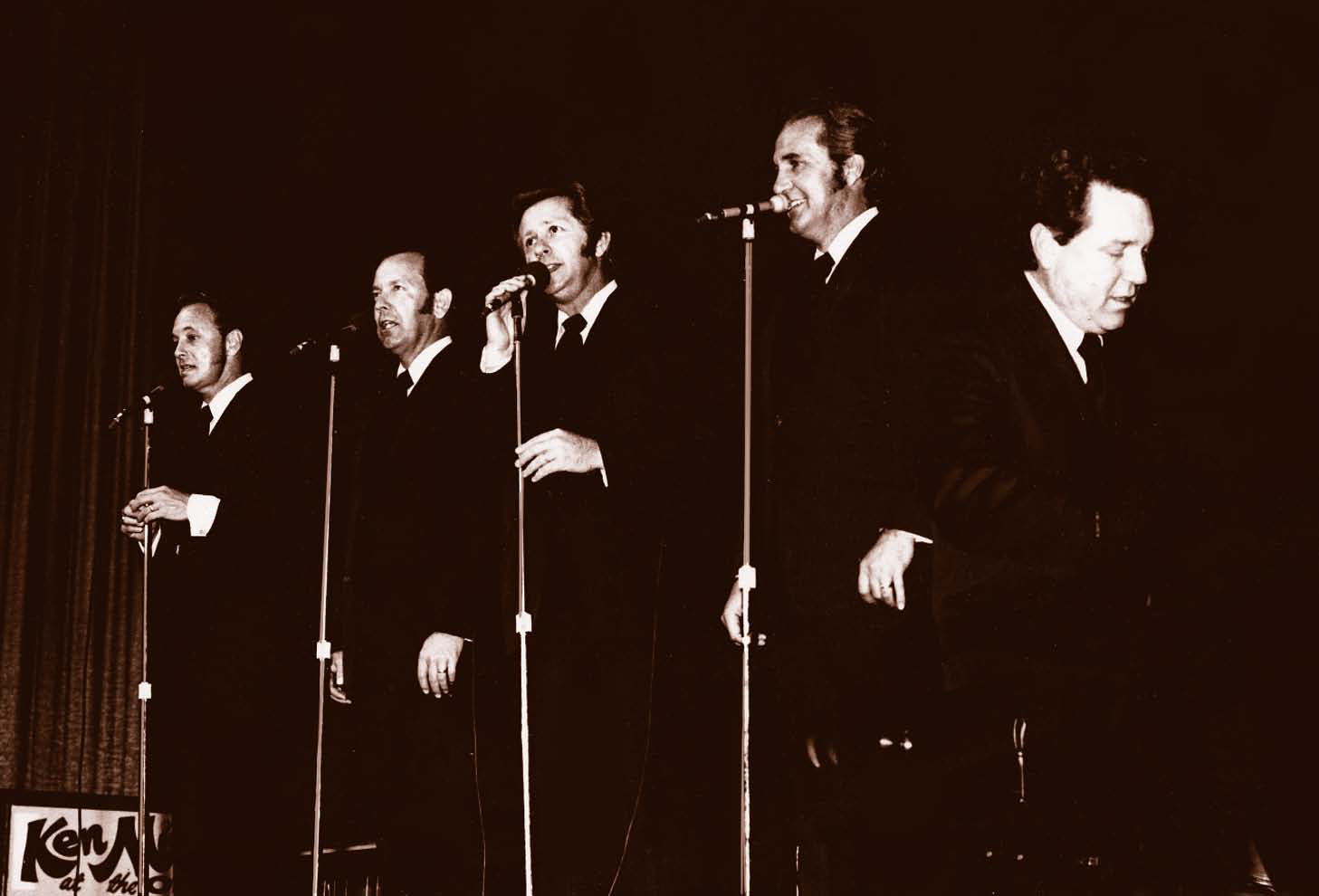
|
Plainsmen on stage (l to r) Thurman Bunch - Jack Mainord - Dwight Hicks - Jay Simmons - Easmon Napier • Gerald Williams (upper left) joins the Plainsmen replacing Jay Simmons - November, 1973
|
|
XXXXThe KFRM Proud Country Shows, and similiar package shows enabled the Plainsmen to work with such artists as Mel Tillis, Buck Owens, Grandpa Jones, Roy Clark, Tom T. Hall, Claude King, George Morgan, Jack Green, Donna Fargo, Minnie Pearl, Hank Thompson, Jimmy Dickens, Don Williams, Kitty Wells, Al Hirt, Porter Wagner, Jimmy Dean, Dolly Parton, LeRoy Van Dyke, Freddie Fender, and Loretta Lynn. No matter who was on the show bill, the Plainsmen were always well received. The system was working and the crowds continued to grow. Thousand of fans would turn-out to enjoy the Proud Country events. It was reported that in 1973 Mack held an event in Great Bend, Kansas billed as the KFRM Country Fair, with Roy Clark, Mack’s Ranch Boys, the Plainsmen and other KFRM personalities that sat, to that date, an all-time attendance record for a country music event in the state, with over seventy-thousand concert goers attending the three day event.
|
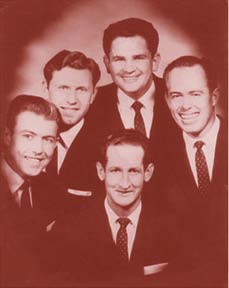
|
Gerald Williams and Jerry Venable with the Melody Boys Quartet - c. 1956 • Jerry Venable (far left) and Gerald Williams (2nd from left) in the Venable Quartet
|
|
XXXXMack Sanders released several records through LeeMac Records, but for the most part the record company remained an in-house label designed to create projects for artists within his organization. In addition to the earlier mentioned, self-titled, The Plainsmen, and Plainsmen Sing Your Request, and a few radio singles, there was a three-record boxed set of Plainsmen records released on the LeeMac label. The set was called, The Plainsmen Sing All-Time Hits, and consisted of an all country record, an all gospel record and an all hymns disc, all packaged in a plain corrugated box. This ultra-utilitarian set is rather rare, and is sought after by collectors.
|
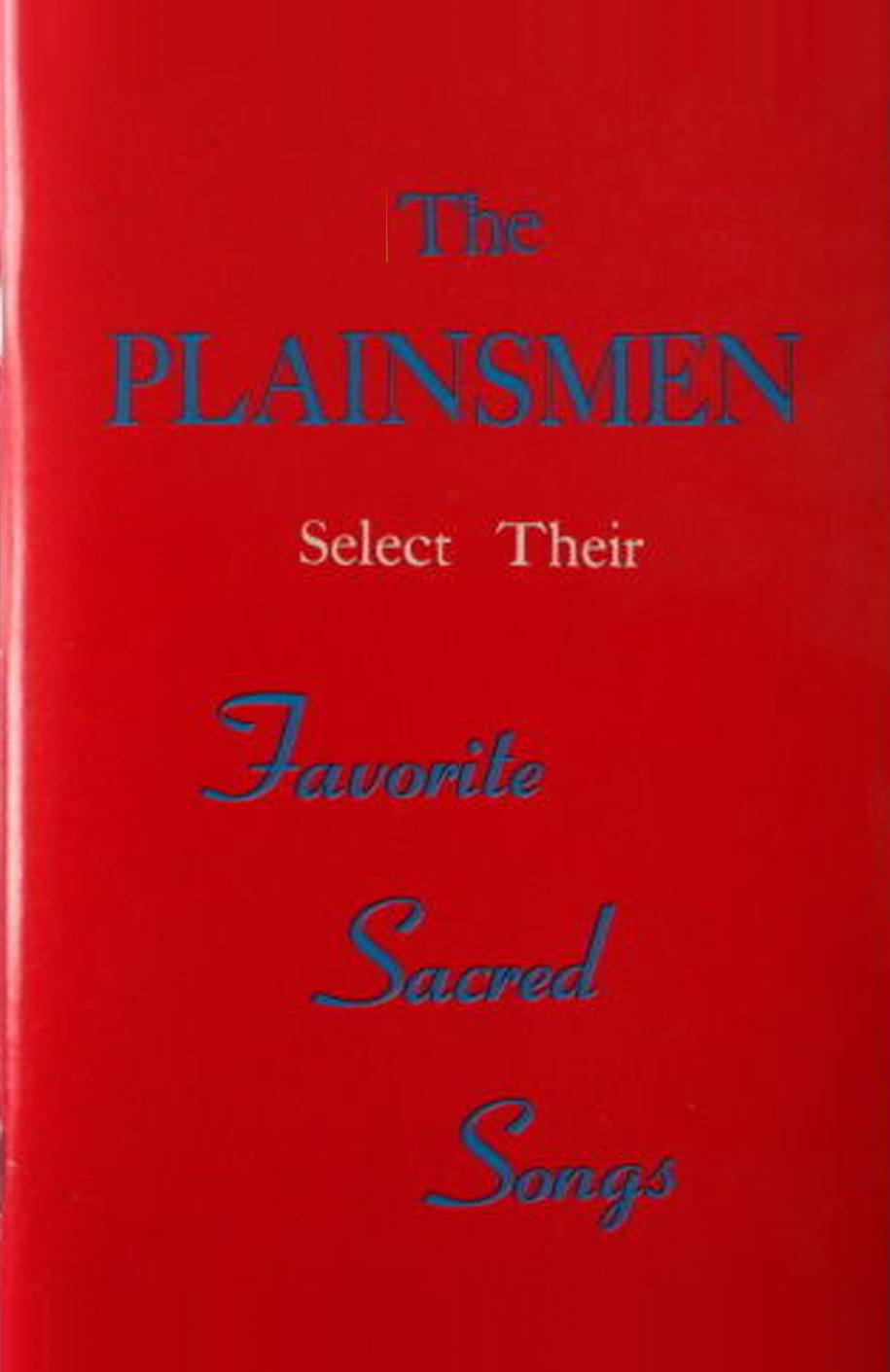
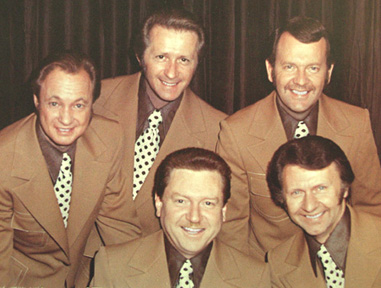
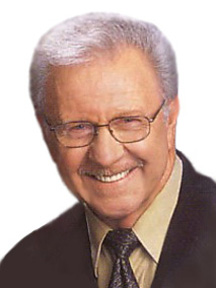
|
Table sales Plainsmen song book • The Plainsmen in 1974 (top row, l to r) Thurman Bunch - Dwight Hicks - Jack Mainord - (bottom row, l to r) Easmon Napier - Gerald Williams • Gerald Williams - c. 2009
|
|
XXXXThe Plainsmen’s continued interaction with nationally know country and pop stars eventually led them, in 1975, to extended engagements in Las Vegas. The group quickly hit its stride in the land of neon, and was soon setting attendance records at the Landmark. Opened in 1969, the Landmark, with its distinctive three-hundred-fifty-six foot tower, was the tallest structure on the Las Vegas skyline. Owned for nine years by Howard Huges, the Landmark hosted a great number of entertainers including
|
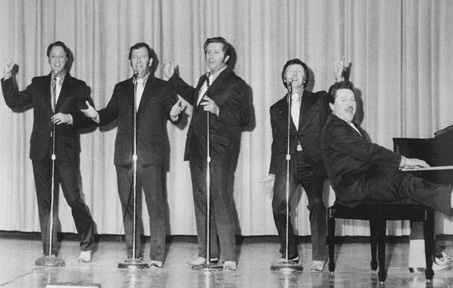
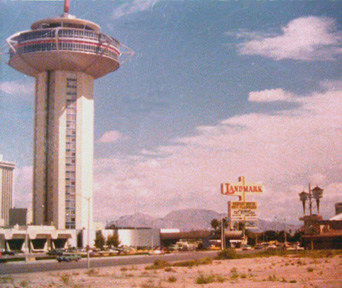
|
The Plainsmen on stage in Las Vegas - (l to r) Thurman Bunch - Jack Mainord - Dwight Hicks - Gerald Williams - Easmon Napier - c. 1975 • The Landmark Hotel and Casino where the Plainsmen played several extended engagements. The complex was demolished in 1995
|
|
Bobby Darin and even guest appearances by Frank Sinatra.The Plainsmen Landmark schedule consisted of two, ninety minute shows per night, one set at eight and the other a midnight. Their program material consisted of sixty percent gospel and forty percent country and pop songs. Over the next two years the group did four major Vegas stints. During the group’s fourth Vegas run, Thurman Bunch left the group and Jerry Venable was flown in to fill dates until Laddie Cain could be brought onboard. Laddie, a native of Houston, Texas, had served as tenor for the Florida Boys prior to joining the Plainsmen. Following his time with the Plainsmen he work for many years with the country group, the Four Guys. Thurman Bunch returned South, and within a short time, died in a highway accident.
|
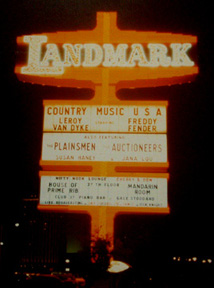
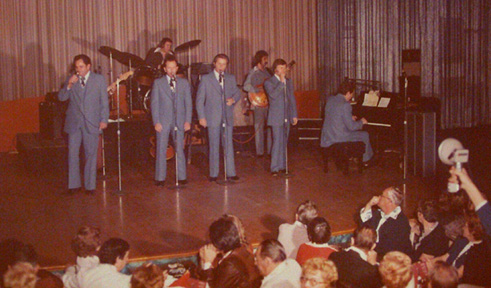
|
The Plainsmen posted on Landmark sign • The Plainsmen on stage at the Landmark - Jerry Venable (far left) filling-in after Thurman Bunch's departure from the group.
|
|
XXXXDuring the same Vegas engagement, Mack Sanders was convinced by a Vegas booking agent that quartet acts were on their way out, and that the Plainsmen should be trimmed-down to a trio. Oddly, within a few months the same promoter was said to have been booking the Oak Ridge Boys into Vegas venues. There is no record as to whether or not he also tried to encourage The Oaks to go trio. However, Mack was sold on the idea, and as Gerald Williams put it, baritone Dwight Hicks was “unceremoniously fired.” Easmon Napier, angered at the insensitive manner in which Dwight had been dumped, confronted Mack, loudly verbalized his views on the matter, and quit the group. Suddenly, much of the creative magic was gone, and sadly, this original Plainsmen would never again play for the group. Easmon headed back to the mid-West where he dealt with increasing health problems. Eventually he returned to the area of his childhood in Oklahoma, were he died in January,1980. Mack hired Jim Garstang from LeRoy Van Dykes band to fill Easmon’s position. Jim had worked with the Cathedral Quartet in 1972-73 and worked briefly with the Dixie Echoes. In 1979, he became a permanent fixture with the Mel Tillis Band. Both Jack and Gerald remained with the group. On arrangements where a bass lead was needed, Gerald would take the low part and Jim Garstang would sing the baritone. One custom project with the new lineup was produced with the self-title of, The Plainsmen.
|
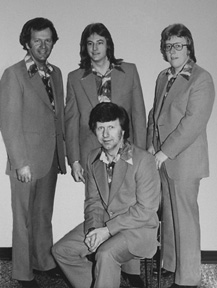
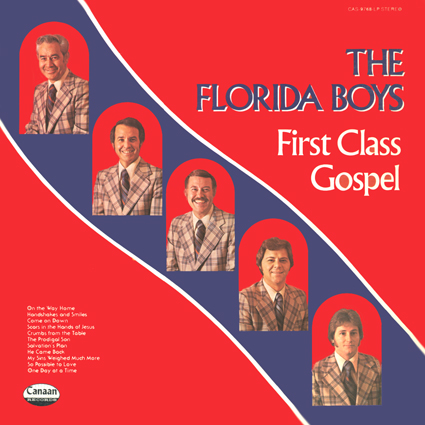
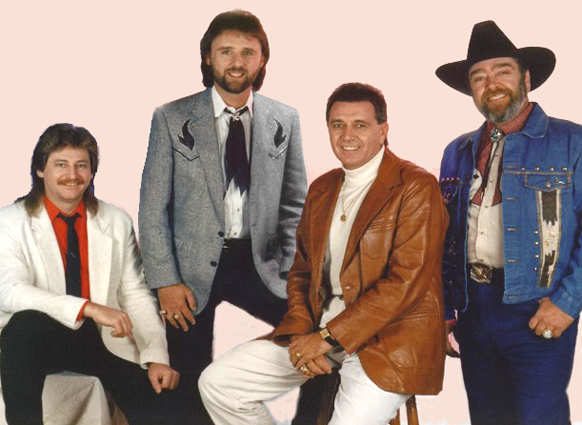
|
Last Vegas line-up of the Plainsmen (standing, l to r) Jack Mainord - Laddie Cain - Jim Garstang - (seated) Gerald Williams • Laddie Cain on Florida Boys album cover (lower right corner) from 1975 • Laddie Cain (far left) with the Four Guys - 1989
|
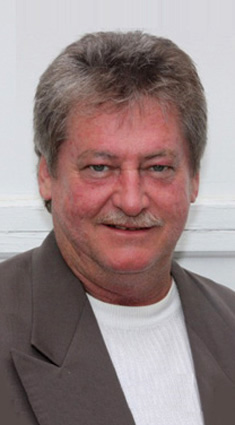
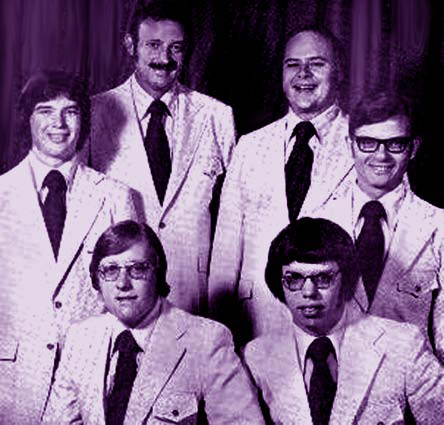
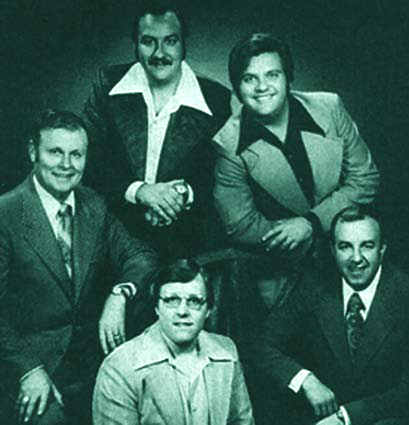
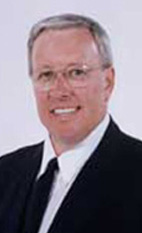
|
Laddie Cain - c. 2011 • Jim Garstang (bottom left) with the Dixie Echoes in 1971 • Jim Garstang (bottom center) while with the Cathedral Quartet in 1973 • Jim Garstang - c. 2009
|
|
XXXXIn 1977, Mack Sanders decided to move his center of operations, and the Plainsmen, to Nashville. Gerald Williams opted not to relocate to Nashville, and returned to Arkansas. Mack was in the process of selling his chain of Proud Country stations, a process that would be completed in 1978. Simultaneously he was involved in negotiations to acquire new stations in the South. His first station acquisition in the Nashville market was WENO that was licensed to the northern Nashville suburb of Madison, Tennessee. WENO had been launched in 1957 by Nashville radio entrepreneur, Cal Young, and 1962, it became the first all-country station in the Nashville market. The station’s studios were located on a five-acre plot in Madison, known as the “WENO Radio Ranch.” The station sponsored Nashville’s first theme park, Frontier Town, that featured live wild west enactments and special guests like actor Dan Blocker, who played “Hoss” on the popular “Bonanza” television series. Mack retained the Madison property but located his main offices and studios on Sixteenth Avenue, Nashville’s famous, Music Row.
|
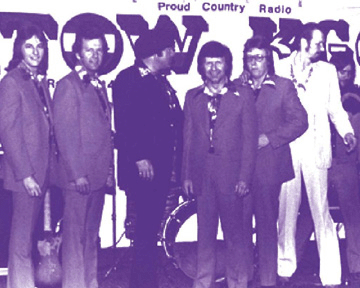
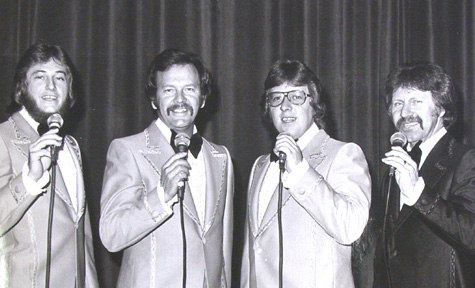
|
The Plainsmen at one of many Proud Country radio promotions - (l to r) Laddie Cain - Jack Mainord - Roy Clark - Gerald Williams - Jim Garstang - Hank Thompson - unidentified picker • Experimenting with "the look" in Vegas - Laddie Cain - Jack Mainord - Jim Garstang - Gerald Williams
|
|
XXXXWith a healthy financial war chest from the sale of his Proud Country stations, Mack was poised to take Music City by storm. He was, as Southern country folks used to say, “borin’ with a big auger.” He first moved into a house that had formerly belong to Ray Stevens, but soon purchased Hank Williams’ mansion on Franklin Pike, where he lived while building a new 8,000 square feet, fifteen room house southwest of Nashville, in the Liepers Fork community. Mack could often be seen traveling around town in his white Rolls Royce, and quickly every country artist in town knew him on a first name basis. He soon aquired a new Eagle bus for the Plainsmen, a vehicle that would later become the tour bus for the rock group Chicago. Even with all the cash and flash, Mack remained the “new kid in town,” and never was accepted into the inner circle of the “old establishment” of the industry. He was competition, and therefore never totally embraced by the “ol’ boys.”
XXXXAs for the Plainsmen, it was a time of re-adjustment, and once again personnel changes. Much time and attention was being invested in getting the station functioning and stabilized. The station had been assigned the new call letters of WJRB, the JRB from Mack’s real name initials. However, in the midst of all the wheeling and dealing a new Plainsmen trio album was released featuring Jack Mainord and two other members of Mack’s station entourage, Tank Tackett and Butch Sanders. The project was called, The Plainsmen - Good Ole Boys, and was released on the in-house Pilot Records label. The same trio would also release a second album entitled, The Plainsmen - Country Roads. Gayle “Tank” Tackett, was born in Cabin Creek, West Virginia. He developed a large following of listeners with his Sunday morning gospel program on WJRB. Through the years he sang with such groups as the Statesmen, Envoys, Rebels, and the Classic 4. Butch, who was born Centralia, Illinois, in 1947, sang bass with the Prophets in the early 1970s. Another perk came to the Plainsmen during this time when the well-known Nashville talent agency, Buddy Lee Attractions, started booking the group. During 1978 and 1979 different configurations of the group built around Jack, Tank, and Butch were pulled together. At times the ranks would swell to seven members with the addition of a fill-in vocal and pickers from Mack’s band to cover station related events. |
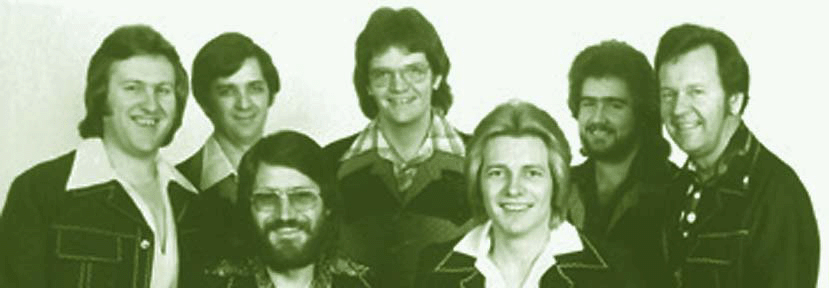
|
c. 1978-79 configuration of the Plainsmen - Tank Tackett (on the far left), Butch Sanders (seated by Tank), and Jack Mainord (far right) recorded and released the group's last two"vinyl" albums, Good Ole Boys and Country Roads
|
|
XXXXIn addition to Mack purchasing WENO in the Nashville market, he aquired the 50,000 watt WVOK-AM in Birmingham, Alabama. The station had been a strong presence in Alabama for many years, and had several well established, high visibility, on-air personalities. Among the most notable of the station’s personalities was the long-time DJ, Johnny Davis, with the real off-air name of Jim Romine. Jim Romine, a native of Sumiton, Alabama, served as WVOK’s general manager for Mack and would become a major figure in the future of the Plainsmen. Jim told me that his first encounter with the Plainsmen had been at one of their Las Vegas performances. At that time I’m sure he had no idea of the role he was to play in the group.
|

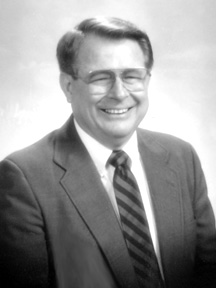
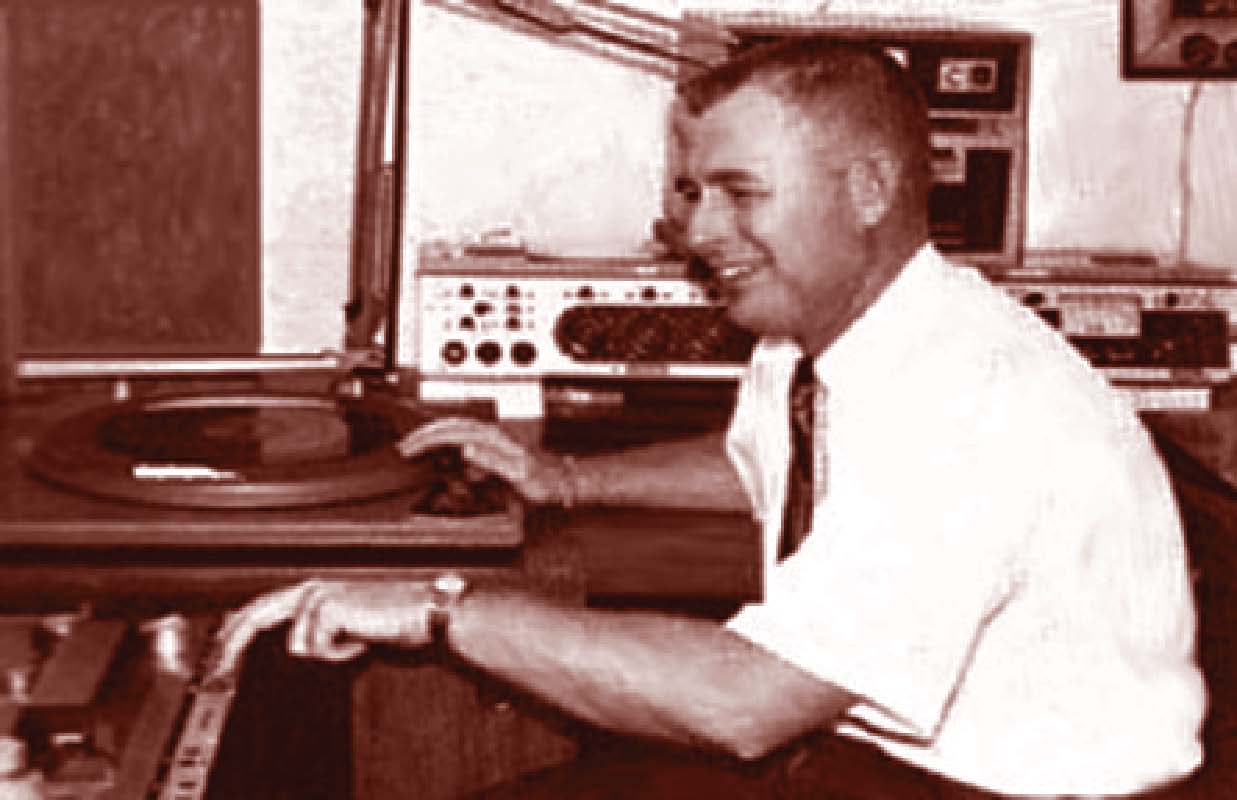
|
Butch Sanders - c. 2012 • Jim Romine - c. 1990 • Jim Romine, a.k.a. Johnny Davis, at radio station WVOK in Birmingham, Alabama, in the early 1960s
|
|
XXXXBy 1980, the Plainsmen were once again a quartet consisting of Tank Tackett - tenor, Jack Mainord - lead, Jon Briggs - baritone, and sometimes piano, Hovie Walker - bass, with Nick Bruno as regular pianist. Jon Briggs had been hired by Mack Sanders to work in sales at WJRB, where he had been approached by Jack about becoming a member of the group. Jon was a native Nashvillian, a rare commodity in Nashville, and had grown-up around gospel music. His father, Jerry Briggs had been the original piano player for the Revelaires Quartet of Macon, Georgia, and also served as the Tennesseans first piano player. Jon had been singing with a group called, Experience, when he became a part of the Plainsmen. Later Jon worked with the Music City Boys for a number of years, and the Mellow Tones. At the time, Hovie Walker was working at WJRB along side of Tank Tackett doing special events and promotions for the station. Early in his music career he had worked with the Singing Americans, and later with Willie Wynn & The Tennesseans, rocker, Leon Russell, the Thrasher Brothers, and one the the versions of the Imperials. Jon Briggs mentioned that Brad Harris, who would re-appear as a group member in the closing days of the Plainsmen, filled some dates during this time. Nick Bruno had previously played piano with such groups as the Rebels, the Stamps, and the Kingsmen, and went on to a successful career as a producer and arranger. It should be noted that 1980 saw the departure of Jerry Minshall from WJRB. He continued his broadcasting career at such prominent Nashville radio stations as WSIX, WLAC, WSM, WWTN-FM, and also worked with the Interstate Radio Network.
|
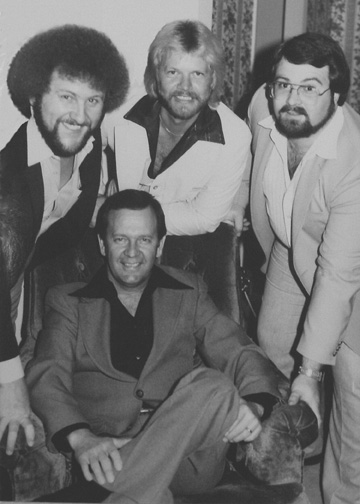

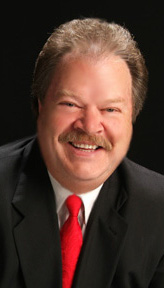
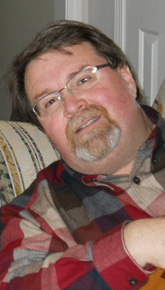
|
The Plainsmen in 1980 (top, l to r) Tank Tackett - Hovie Walker - Jon Briggs - (seated) Jack Mainord • Tank Tackett - Hovie Walker - Jon Briggs - c. 2010
|
|
XXXX1981 brought a new lineup with Mike LoPrinzi on tenor, Dewayne Wheaton doing double duty on baritone and piano, Jack still singing lead, and Butch Sanders returning to bass. Dewayne Wheaton was the husband of gospel singer, Karen Wheaton. Dewayne was a member of his wife’s touring band and later they became affiliated with various ministries including Jimmy Swaggart Ministries. Mike LoPrinzi, who was born in the community of South Branch, New Jersey, told me his first experience of singing with a group was in a trio at his home church called the Assemblymen. Through the years, Mike worked with other groups such as, the Gospel Harmony Boys, Toney Brothers and the Statesmen. Mike said that he had first had contact with the Plainsmen some three, or so, years earlier. Jay Simmons had heard him sing and in turn, had recommended him to Jack Mainord. Shortly after the Plainsmen’s relocation to Nashville, Jack called him to audition, Jack was impressed and offered Mike a position with the group, but Mike decided to declined the offer. Around 1981, Jim Romine started filling-in with the group on an “as needed” basis.
XXXXAn new dimension was added to the ever changing world of the Plainsmen when, in 1981, Howard Welborn decided to fire-up his own group in Georgia, also under the Plainsmen name. Apparently, Mack Sanders, due to his concentration on trying to manage his radio empire, or due to a lack of awareness as to Howard's formation of a group, seemingly did not send a formal cease and desist concerning the use of the Plainsmen name. Howard’s group consisted of himself, Roy McNeal, of Prophets, Stamps, and Statesmen fame, Roy’s nephew, Jeff McNeal, Earl Virgil “Blackie” Black, and Charles Cruse on piano. The group stayed together for a year or more, and recorded one album, When Morning Comes, that released on the Perfection label. |
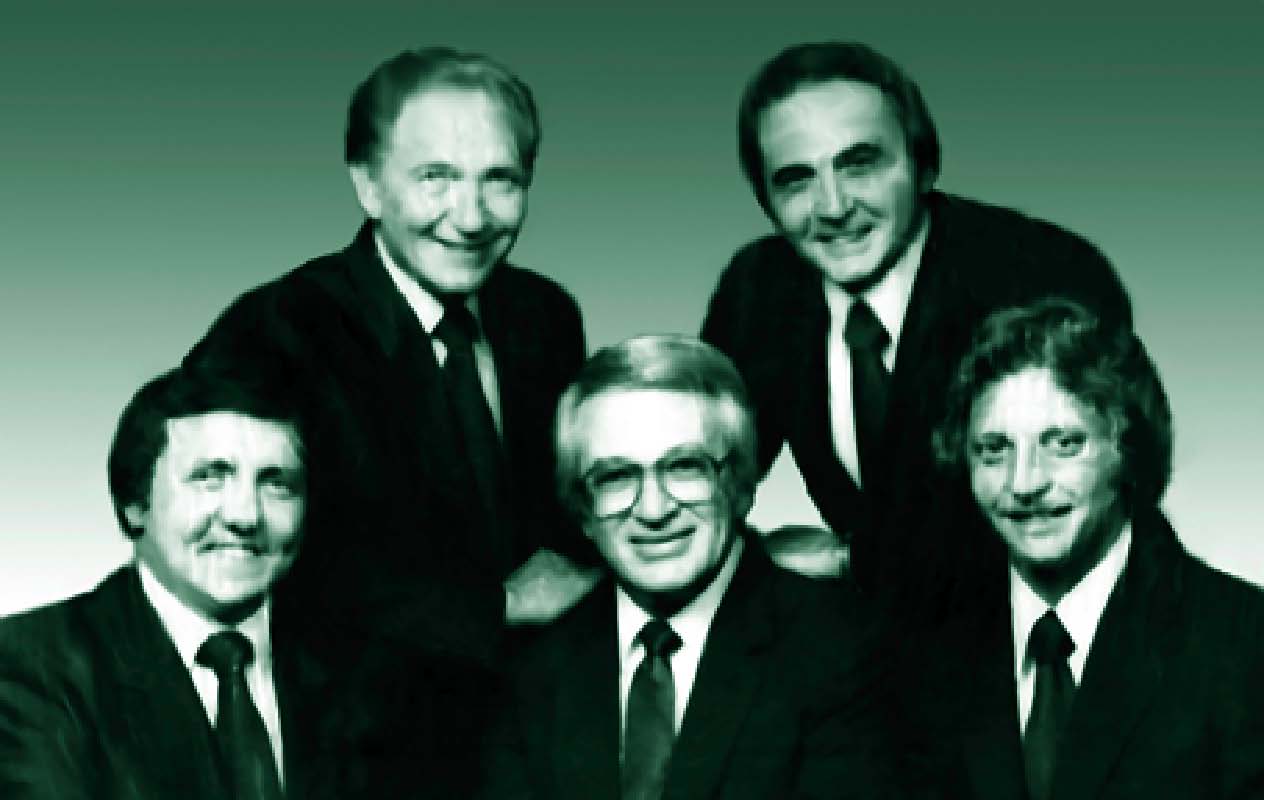
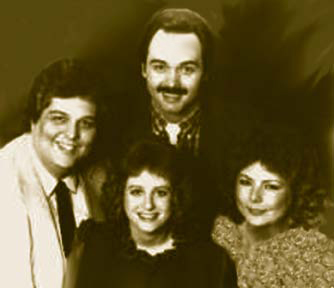
|
c. 1981, Howard Welborn (top left) with his Georgia-based group bearing the Plainsmen name • William Pippin as a founding member of Big Mo & Chosen in 1983
|
|
XXXXMack Sanders aquired WIZO in Franklin, TN, just south of Nashville. He retained the station’s FM portion, but in 1982, he assigned the AM portion over to Jim Romine to fulfill a previous financial agreement. Jack Mainord came onboard at WIZO-AM as general and sales manager. Soon he and Jim partnered in the Plainsmen enterprise. Much time and energy was channeled into trying to make the station successful, and as a result, the group slowed down for about a year-and-a-half, but did not go totally dormant. During these opening years of the 1980s, both Jerry Candler and William Pippin worked in the group. William, from Geneva, Alabama, was a songwriter who in addition to being a part of the Plainsmen, worked with such groups as, Jerry and the Singing Goffs, Namoi and the Segos, and Big Mo & Chosen. In this time frame the group preformed both in trio and quartet forms.
|
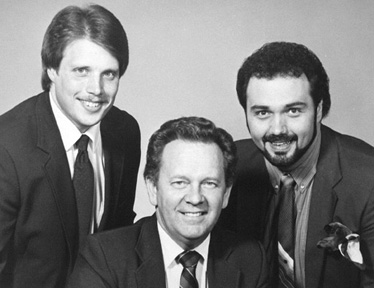
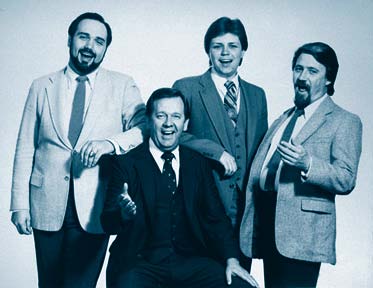
|
c. 1982-83 Plainsmen line-up - (l to r) Jerry Candler - Jack Mainord - William Pippin • Another c. 1982-83 Plainsmen configuration (l to r) William Pippin - Jack Mainord - and two unidentified members
|
|
XXXXSometime in 1984 Jack Mainord contacted me to see if I might be available to play piano for the Plainsmen. He indicated that he was going to reactivate the group to work on a more regular basis. With some adjustments, the personnel lineup came together with Jim Romine’s son, Phil Romine, tenor, - Jack, lead - James Jacobs, baritone - Ray Silver, bass, and myself on piano. Phil Romine had a great personality, and after his time with the Plainsmen he sang with a family group, the Kelleys. Later he went into full-time church work serving through the years as minister of music and worship leader at several churches in the southeastern states. I do not recall anything about James Jacobs background, but seems that he may have gone to the same church were Jack attended. Ray Silver, born in Rossville, Georgia, had worked as lead with the Rangers trio and in later years has worked in music ministries at various Nashville churches. A young man from Jack’s home church, whose last name was Wilson, played bass guitar. I can not recall the drummer’s name.
XXXXDuring this time, I designed a logo for the Plainsmen, I guess it was the only “official” logo the group ever had in its history. We used the logo on promotional materials and on baseball shirts that are now quite rare and hard to find. On the subject of promotional materials, I recall us going to a park in Nashville to shoot the first publicity picture of the group members. It was a bright sunny day. The photographer arrived, set up his equipment, and positioned everyone just so-so. Then everything started going dark. It was a solar eclipse! What are the odds? Eventually, the sunshine returned and the photo was taken. Over the next couple of years we worked a variety of venues, with such groups as Gold City, Charles Johnson and the Revivers, the Perrys, the Fox Brothers, Cedar Ridge, and others. We also did several corporate events in conjunction with WIZO advertisers. |
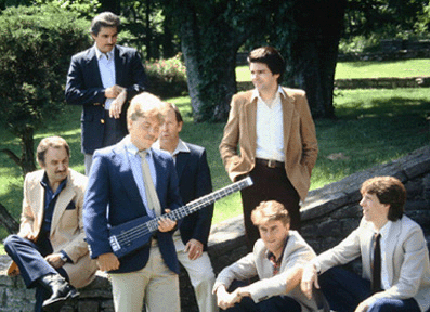
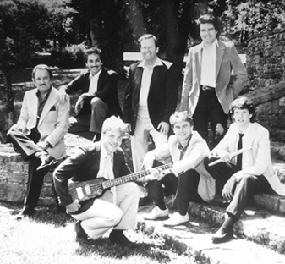
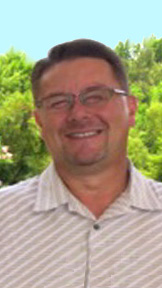
|
1985 photo shoot - waiting on solar eclipse to do its thing • 1985 Plainsmen promo shot - (back row, l to r) Ray Silver - James Jacobs - Jack Mainord - Ernie Couch - (front row) bass player, last name Wilson - Phil Romine - unknown drummer • Phil Romine - c. 2011
|
|
XXXXBack in the Jimmie Davis years of the group, there was a tune entitled,"You Can Have Him," published by Jimmie Davis’ Publishing Company that listed both Jack Mainord and Jimmie Davis as co-writers of the song. Jack eluded that Jimmie had nothing to do with the penning of the song, but as publisher, had included his name on the finished sheet music. At the time, the adding of names to compositions was not all that unusual of a practice. What ever was the case, "You Can Have Him," was a fun, “three chords and a cloud of dust,” hard driving ditty. The song’s melody and phrasing closely paralleled a rock-n-roll tune from the pen of William S. Cook called, "You Can Have Her." Cook’s composition was the final hit for “The Golden Boy of Song,” Roy Hamilton, making its way to number six in the R&B chart and to number twelve in the Pop chart in 1961. Jack composed other songs, but "You Can Have Him" is the only one we performed in concert. During the mid-80s we would use the song for a “barn burner” closer. Jack would shift into over-drive and on the final chorus I would do the old Jerry Lee Lewis routine of jumping up from the piano and kicking the bench back across the stage while banging away at the keys. Audiances loved the theatrics and it still makes me smile to think of those fun concerts.
|
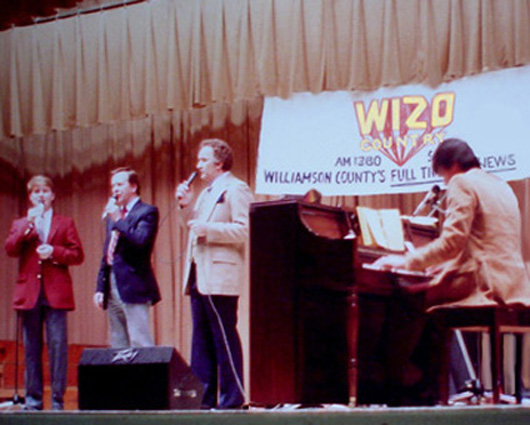
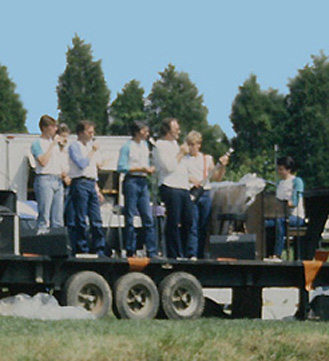
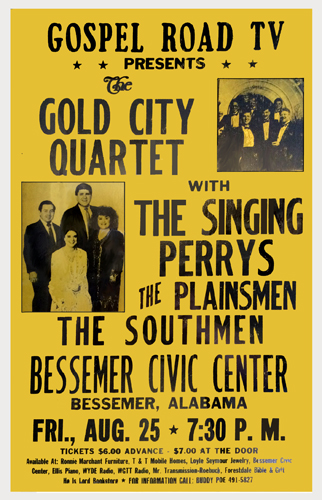
|
Plainsmen radio station promotion concert - (l to r) Phil Romine - Jack Mainord - Ray Silver - Ernie Couch - mid-1980s • East Tennessee Plainsmen radio station promotion concert - (l to r) Phil Romine - unknown head in back - Jack Mainord - James Jacobs - Ray Silver - bass player, Wilson - Ernie Couch - July, 1984 • Mid-1980s concert poster with the Plainsmen in the line-up, sponsered by Jim Romine and Buddy Poe's "Gospel Road" television show
|
|
XXXXOn a somewhat regular schedule we worked a variety country and gospel program that Wally Fowler ran for the tour bus crowd down in the Music Row area. John Wallace “Wally” Fowler, with his often skewed hair piece, was a legend in the gospel music industry. Born in Bartow County, Georgia on February 2, 1917, he joined the John Daniel Quartet in the 1930s, and stayed with the group for fifteen years. During WWII he founded the Oak Ridge Quartet, that eventually evolved into the Oak Ridge Boys. On November 8, 1948, Wally launched one of his most note-worthy ventures, the first All-Night Singing from the Ryman Auditorium in downtown Nashville. Working Wally’s Music Row programs was a lot of fun and at times challenging. You never knew what material you would be playing, or whom you might be backing-up on any given night. With Jim Romine’s sale of WIZO in 1986, things began to slow down for the group, and the Plainsmen went into another semi-dormant phase.
XXXXLate 1988, Jack called again with renewed interest in the group. This time he started basically with a trio format consisting of Jim Romine - baritone, John Briggs - lead, and Jack - tenor. When needed I would sing a bass line, in addition to playing the piano. The obvious should be pointed-out. Jack had a wide baritone to first tenor range, and if needed, could sing bass, but it was that trademark growl he would put in his voice when taking a lead that made his vocals so unique and sold him to his audiences. Jim Romine said that Jack told him on several occasion to always sing a song as if it where the last time you would ever get to sing that song. What a great philosophy. |
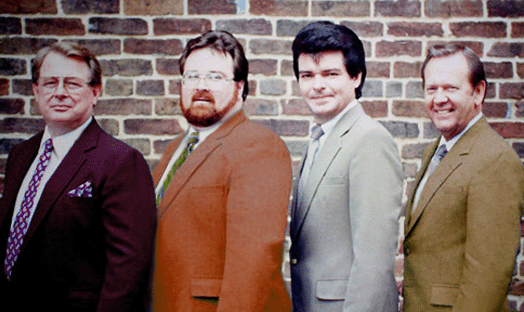
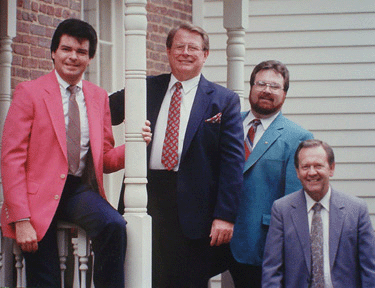
|
The 1988 Plainsmen - (l to r) Jim Romine - Jon Briggs - Ernie Couch - Jack Mainord • Another shot of the 1988 Plainsmen - (l to r) Ernie Couch - Jim Romine - Jon Briggs - Jack Mainord
|
|
XXXXEarly in 1989 my favorite son, Jason, joined the group playing synthesizer, providing the bass guitar and string parts. Jason had always been around music, and had studied piano under his mother’s tutelage, and later added bass guitar and drums to his repertoire. During his high school years, in addition to working with the Plainsmen, he appeared in music videos with such artists as the Kentucky Headhunters and Ronnie Milsap, and went on to aquire a degree in music business from MTSU. Shorty after Jason joined the group, Nic Val (Nick Valovich) became the new bass singer for the Plainsmen. Nic was around twenty-seven when he joined the group. He had spent some of his childhood in Bermuda, his father being stationed there while serving in the military. The family later settled for awhile in Missouri before going to the Sacramento area in California. In addition to singing, Nic became involved in body building and garnered several titles in related competitions. He had originally come to Nashville, a year or two before joining the Plainsmen, to work with Exodus. Some individuals spend years trying to become a bass singer, while other are just naturals. Nic was a natural. Great range and great tone. Later he worked briefly with the Statesmen and with one of the Blackwood groups. A drummer named, Barry Puckett, was also added to the Plainsmen line-up.
XXXXWhen Jim Romine and Jack Mainord separated from Mack Sanders’ broadcasting organization, Mack assigned rights to the Plainsmen name back to Jack. Mack continued to expand his company with one of his new stations being situated in his old midwest stomping grounds. He decided that once again he wanted a Plainsmen-type group to work merchant-sponsored promotional programs. Jack Mainord and Jim Romie being involved in their own broadcasting activities, had their own plans for the Plainsmen, and seemingly were not interested in being drawn back under Mack’s umbrella. Mack’s solution, as had been the case in the formation of the Marksmen, was to create a new group, and he seemed bent on using the Plainsmen title due to its high name recognition. I remember general scuttlebutt around that time of there being “issues” over Mack’s desire to use the Plainsmen name. In that Jack held rights to the name, and in order to avoid litigation, the title of Proud Country Plainsmen was chosen by Mack for his new group. |
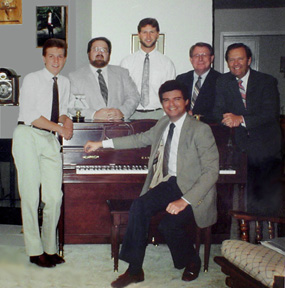
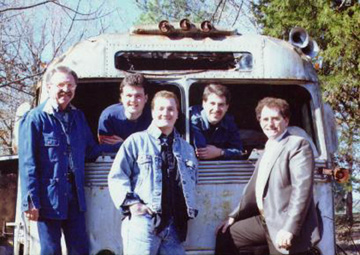
|
1989 Plainsmen with Jason Couch (far left) added to group on keyboard bass and strings, and Barry Puckett (standing in back center) added on drums. Picture taken at Jack and Melba Mainord's home, for an article in the "Singing News" magazine • Fall, 1989 - Proud Country Plainsmen, created by Mack Sanders in Great Bend, Kansas, to work radio station related promotions. Gerald Williams (far left) sang bass with the group, and Newman Miller (far right) played piano.
|
|
XXXXGerald Williams said that in the fall of 1989 he got a call from Jerry Venable, who was working at Mack Sanders radio station in Great Bend, Kansas, informing him of Mack’s plans to pull together a quartet. At that time, Gerald was heading-up The Melody Boys, whom he had reorganized a few years earlier in Little Rock. An arrangement was reached with Mack whereby Gerald and fellow Melody Boys member, Jonathan Sawrie, signed-on with the Proud County Plainsmen, with the understanding that they would be able to continue filling some dates with the Melody Boys. Other members of Proud Country Plainsmen were Jeff Lewis - baritone, Brian Hord - tenor and Newman Miller - piano. The group stayed together for a few months.
XXXXLate 1989, Plainsmen Gold : Volume One and Volume Two were released on cassette tape. Eddie Crook helped Jack Mainord pull the two compilations of previously recorded material together and I designed the J-card inserts for the projects. On November 19th we taped a live concert video and recording at Tusculum Hills Baptist Church in Nashville. The new VHS video, Plainsmen LIVE, and companion audio cassette, released two months later. |
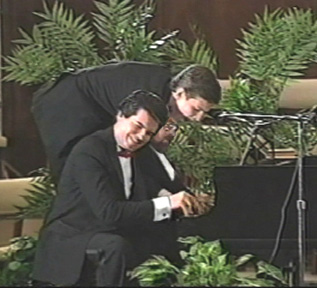

|
Ernie Couch - Jason Couch - John Briggs doing three-man piano routine - November, 1989 • Plainsmen, November, 1989 line-up - (l to r) Ernie Couch - Jack Mainord - Barry Puckett - Jon Briggs - Jason Couch - Jim Romine - Nic Val
|
|
XXXXThe coming of 1990 brought more changes for the Plainsmen. In mid-January Jim Romine decided that his time would be best spent focusing on the syndicated gospel music television program “The Gospel Road,” that he and Buddy Poe had started, and in which Jack Mainord had become involved. Buddy Poe a long-time resident of Birmingham, Alabama suburb of Hueytown, had a lengthy history in gospel music having worked with such groups as the Blackwoods, the Segos, and the Southmen. Howard Welborn was contacted to rejoin the group to replace Jim on baritone. At the time Howard was living back at his home in Woodstock, Georgia, and had been singing with a local group called the Ambassadors Quartet. The group worked primarily in Georgia and ajoining states with an annual extended excursion down into south Texas to sing for the “snowbirds” wintering in the Rio Grande Valley. Howard was easy to work with. His years of experience made him a quick study.
|

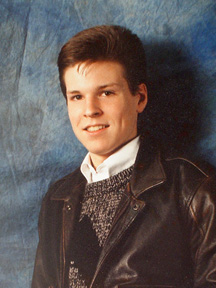
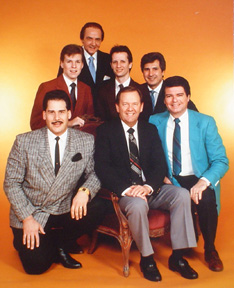
|
The Plainsmen in January, 1990 (standing, l to r) Jack Mainord - Nic Val - Jim Romine - Ernie Couch - Mike LoPrinzi - (kneeling, l to r) Jason Couch - Steve Adams • Jason Couch • Spring, 1990 Plainsmen line-up - (top) Howard Welborn - (middle row, l to r) Jason Couch - Steve Adams - Mike LoPrinzi - (front row) Nic Val - Jack Mainord - Ernie Couch
|
|
XXXXA new drummer, Steve Adams, came to the group. Steve had worked several years with his father and his uncle in a group called the Southern Envoys out of Bogalusa, Louisiana. I recall, about the same time, Jack, Jason, and I meeting with Mike LoPrinze who had been working with Cecil Blackwood and the Blackwood Brothers for quite awhile. Jack and Mike came to some agreement and within a few days, Mike was back with the Plainsmen. Mike has always had one of those classic, full quartet voices, with a wide range. He used to do a killer imitation of James Blackwood singing, “I’ll Meet You In The Morning.” Mike’s second stay with the Plainsmen lasted only a few weeks and Steve Warren came onboard with the group.
XXXXAs a teenager growing-up in Houston,Texas, Steve Warren had been envolved in a quartet with the Gatlin Brothers. At one time, he had worked for Newman Miller at one of Newman’s music stores in Houston. Through the years Steve was a part of such groups as the Stamps, Blackwoods, and Exodus. Steve is one of the most versatile singers and musicians to have ever been a part of the southern gospel music industry, possessing a wide vocal range, and the ability to play a broad spectrum of instruments. Jake Hess told me of Steve being enlisted to fill the tenor position with the Masters V (the Masters Five). The Masters V was comprised of former Statesmen and Blackwood Brothers members. Jake said that in the afternoon, prior to an evening concert, Steve arrived for a semi-audition with his trademark great self-assuredness and announced that he could sing any song the Statemen or Blackwoods had ever recorded, and that he could sing any part on any of those songs! Steve’s brashness was duly noted by the other group members. Jake continued by saying that Steve took the stage that evening, unrehearsed, performed a lineup of Statesmen / Blackwood classics, and that to his knowledge, Steve did not miss a single note, or a single lyric. Jake was impressed. |
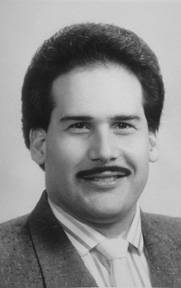
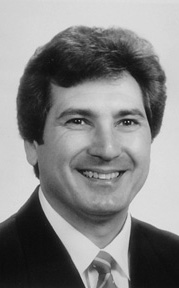
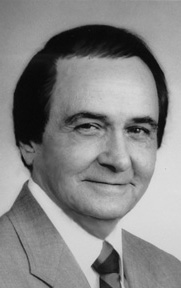
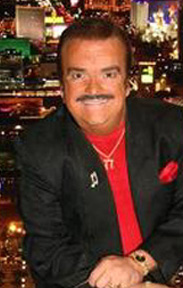
|
Nic Val - Mike LoPrinzi - Howard Welborn - spring, 1990 • Steve Warren during his 1990s Vegas era
|
|
XXXXSometime after Steve came to the group Howard Welborn was unable to do a show, and we enlisted Chris Hess, Jake Hess’ son fill the date. Chris, who was serving as Jason’s youth leader at our home church in Nashville, had worked with his dad and sister in their family group, and for a short time with Jake in a later version of the Statesmen Quartet.
XXXXDuring the spring of 1990 Jack Mainord signed, on the behalf of the group, a recording contract with Eddie Crook to create a new project to be released on Eddie’s Morning Star Legend Series. Recording started at the Oak Ridge Boys’ Rockland Road Studio in Hendersonville, Tennesee. Newman Miller was at the sessions. He had written the title song for the project. As producer, Eddie opted to use himself and studio musicians on the project, and Jason and I opted to leave the organization, as was soon the case with Steve Warren, Nic Val, and Howard Welborn, all having laid-down but partial vocals. Eventually, with the addition of Brad Harris, Buck Clapp and Jim Romine to the recording effort, and with the shifting around of parts, the Caught Up project was completed and released. Jason and I started formulating plans that eventually led to Ernie Couch & Revival being launched. Following some stints with other groups, both Steve and Nic landed in Las Vegas where they worked with Wayne Newton for quite some time. As a side-note, there is a scene in the classic Chevy Chase movie, “Nation Lampoon’s Las Vegas Vacation,” where Steve can be seen seated at the piano behind Wayne Newton. Nic finally developed his own Vegas solo act that had a long run. As for Howard, he returned to his home in Woodstock, Georgia where he again worked some with the Ambassadores Quartet. |
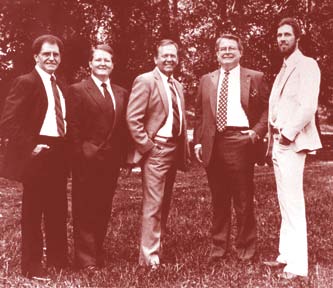
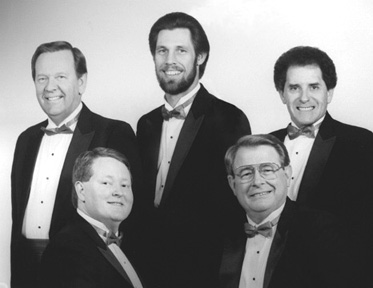
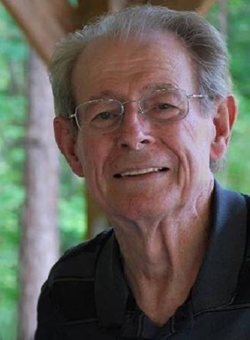
|
The Plainsmen - late summer, 1990 - (l to r) Newman Miller - Brad Harris - Jack Mainord - Jim Romine - Buck Clapp • The Plainsmen - c. late 1990 to early 1991 - (standing, l to r) Jack Mainord - Buck Clapp - Newman Miller - (seated, l to r) Brad Harris - Jim Romine • Jim Romine - c. 2013
|
|
XXXXSettling out of the dust of summer was a Plainsmen roster consisting of Jack Mainord - lead, Jim Romine - baritone, Brad Harris - tenor, Newman Miller - piano, and Buck Clapp - bass. Buck was a nice guy who, at the time, was attending a church where I had served as minister of music. I had auditioned him for the bass position with the group just before Nic Val joined. Tragically, after his time with the Plainsmen Buck was stabbed to death by a mugger while visiting in Washington, D.C.
XXXXThe reorganized group continued to do some dates, and made appearances on the “Gospel Road” television program. Jack Mainord began looking at devesting himself of the headaches associated with trying to maintain a group, and Jim Romine was also looking at possible change with regard to his relationship to the Plainsmen. Jack was approached by his longtime friend, Maxine Harper, about partnering in radio station WKXM located in Winfield, Alabama. Maxine and her husband Ray Harper had been envolved in broadcasting ventures for many years. The opportunity and timing seemed right. In March of 1991, after almost thirty-five years of being the glue that had held the Plainsmen together, Jack Mainord left the group and relocated to Alabama. As a footnote, following his move, Jack put together a local group with former Blue Ridge Quartet member Ed Sprouse, Byron Burgess, along with Maxine Harper, who both sang and played piano. In July, 1995, Jack assumed full ownership of WKXM. Jack’s leaving also marked Jim Romine’s departure from the group. Following the Plainsmen, Jim continue his television program for sometime and went into music ministry, serving as minister of music and worship leader in various central Alabama churches. |
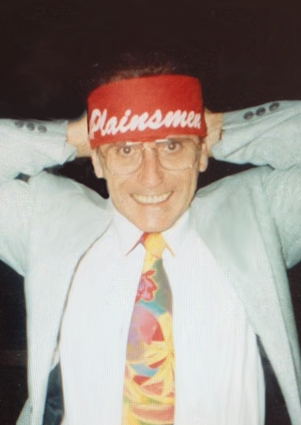
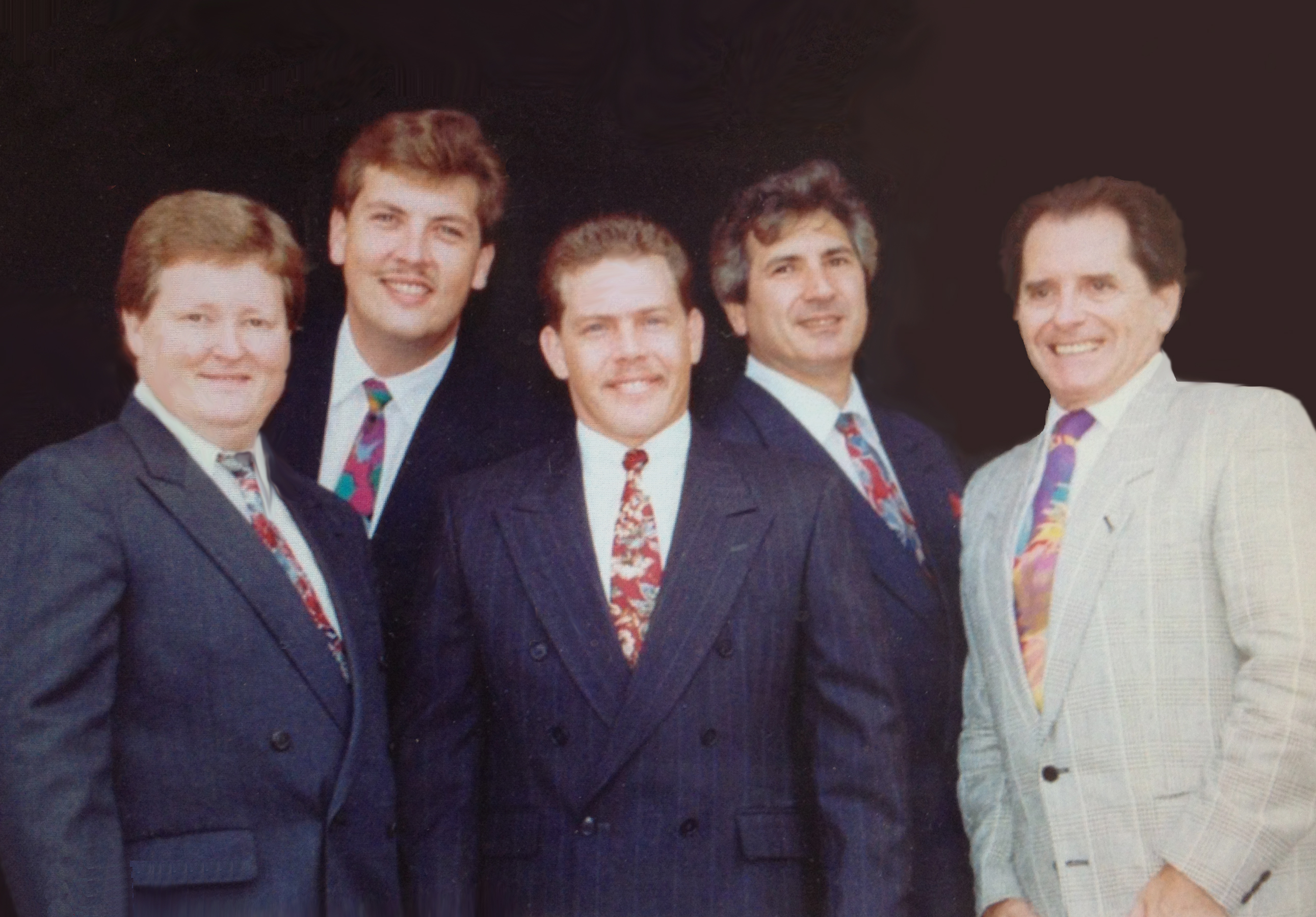

|
Newman Miller modeling some manner of stylish Plainsmen headware • Mike LoPrinzi (second from right) rejoined the Plainsmen briefly during the Newman Miller management era • Plainsmen at National Quartet Convention, Nashville - 1991
|
|
XXXXThe handwriting was on the wall, but the end was not yet. As the new group manager, Newman Miller enlisted Gene McDonald into the ranks. Gene, a native of the “bootheel” region of Missouri started his singing career working in his family’s group. He sang tenor with Jack Campbell and the Ambassadors. After his voice changed he later attend Ben Speer’s Stamps-Baxter School of Music in Nashville. Following his time with the Plainsmen he sang bass with the Florida Boys for a number of years. Later he went solo and became a bus driver. Newman started singing lead in addition to playing the piano. Gene took the baritone position, with Brad Harris being retained on tenor and Buck Clapp on bass. The group continued working programs over the next year-and-a-half, and during that time both Mike LoPrinzi and Jerry Tramell filled a few dates with the group. Through the years, Jerry worked with such groups as the Wonder State Quartet, Florida Boys, Blue Ridge Quartet, Blackwood Brothers, Stamps Quartet, Arkasas Boys, and the Heritage Quartet.
|
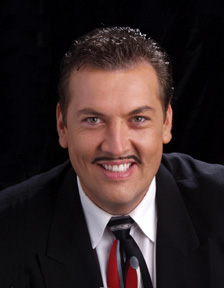

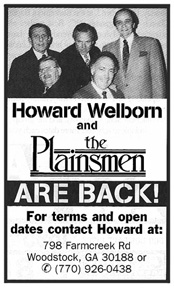
|
Gene McDonald • Gene McDonald (top center) while singing with the Florida Boys Quartet • Ad for Howard Welborn's final group in Georgia under the Plainsmen name - early, 1996
|
|
XXXXIn 1992, the group’s final project, Movin’ Up To Gloryland, was recorded, at what was then, Two Rivers Baptist Church in Nashville. The project was released on Eddie Crook’s, Morning Star Legend Series, as an audio cassette, and as a VHS video. Later that year, Newman pulled the group off the road, and returned to his native Oklahoma. For all practical purposes, this marked the final mile in the long and colorful career of the Plainsmen. However, for the historical record it should be noted that there were two later attempts to revive the group. In late-1995, Howard Welborn once again pulled together a group under the Plainsmen name that stayed together for a few months into early-1996. Two or three small ads were ran in The Singing News magazine announcing the group as, “Howard Wilburn with the Plainsmen,” and seemly the group preformed a few dates before disbanding. One last attempt was made to reform the Plainsmen, by a former member of the group. Newman Miller told me that he started looking into the possibility of reviving the Plainsmen in late-1998. He was working on trying to secure a theater in Branson where the Plainsmen would serve as the regular house group. In the spring of 1999, he started the process of contacting and auditioning individuals for the reformed group. A lineup was determined, but by early summer it became evident that the theater gig was not going to happen. At that point internal problems, as to the future direction and management of the revived group developed, and by early fall there came a parting-of-ways between Newman and those he had enlisted for the Branson project. To avoid litigation over rights to the Plainmen name, the spin-off group chose to continue under a modified name.
|
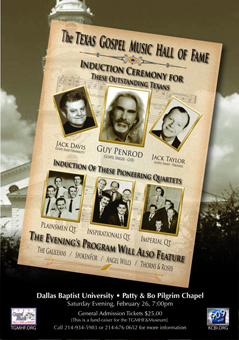
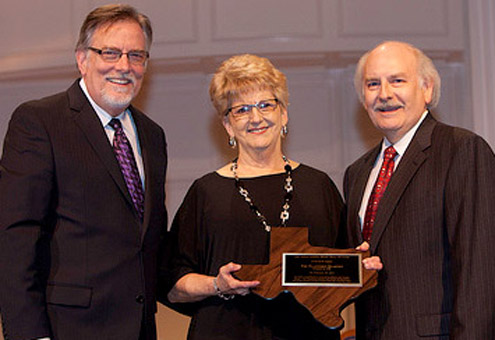
|
Poster advertising 2011 inductees, including the Plainsmen, to the Texas Gospel Music Hall of Fame • Jack Mainord's wife, Melba Mainord, accepting on the behalf of the Plainsmen, the group's induction into the Texas Gospel Music Hall of Fame, February 26, 2011 (l and r ) Hall of Fame officials: Randy Wills and Ben Pegues
|
|
XXXXIn February, 2011, the Plainsmen were inducted into the Texas Gospel Music Hall of Fame. In that the Plainsmen played such a prominent role in the history of gospel music, hopefully in the near future the Louisiana Music Hall of Fame, Kansas Music Hall of Fame, Southern Gospel Music Hall of Fame, and The Gospel Music Hall of Fame (GMA) will likewise give proper recognition to the group and or the group's individual founding members.
XXXXOur thanks to each of those who so graciously assisted us in the creation of this look at the Plainsmen. Jason and I hope that this history will help keep the music and lives that collectively were called the Plainsmen alive in the hearts and minds of generations to come. |
________________________________________________________________________________________DISCOGRAPHY OF THE PLAINSMENCompiled by Ernie Couch & Jason Couch________________________________________________________________________________________ |
THE PLAINSMEN QUARTET |
|
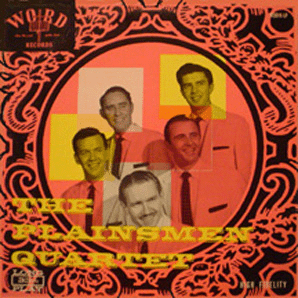 |
WORD Records / W 3016-LP / High Fidelity (1957) |
THE PLAINSMEN QUARTET |
|
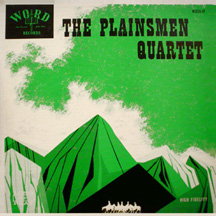 |
WORD Records / W 3035-LP / High Fidelity (1958) |
SONGS AND HYMNS BY THE PLAINSMEN (THE FAMOUS “RED ALBUM”) |
|
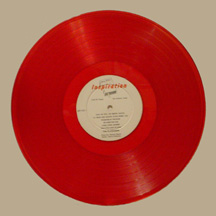 |
Inspiration Records - 1422 W. Poplar, San Antonio,Texas / ILP-151 (c.1960) |
COVER OF THE “RED ALBUM” |
|
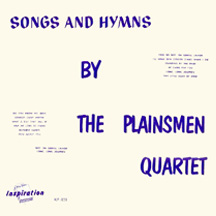 |
Pressed in red transparent vinyl, Piano Acc: Easmon Napier, Guitar: Johnny Patterson |
SOMEONE’S WATCHING OVER YOU - THE PLAINSMEN |
|
 |
Mercury Records / MG 20625 Custom High Fidelty / SR 60625 Stereo |
THE WORLD’S GREATEST GOSPEL SONGS - THE PLAINSMEN |
|
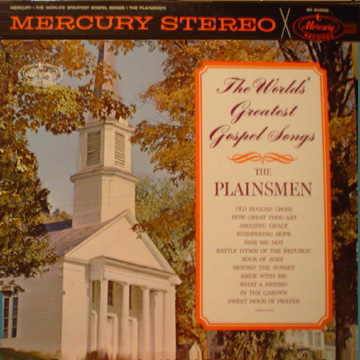 |
Mercury Records / SR 60699 |
THE PLAINSMEN QUARTET - GOSPEL SONGS FOR COUNTRY FOLKS |
|
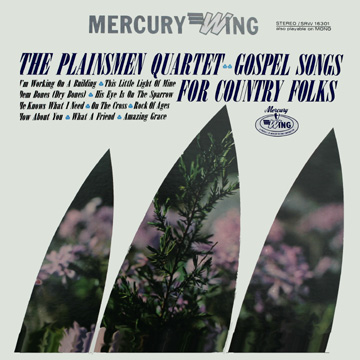 |
Mercury Wing / SRW 16301 (c. late-1962) |
TOUCH THE HAND OF THE LORD - THE PLAINSMEN |
|
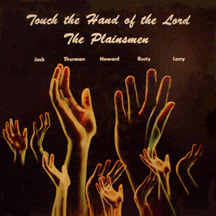 |
Century Records / disk number 15769 (recorded and pressed late 1962) |
LONELY STREET - THE PLAINSMEN |
|
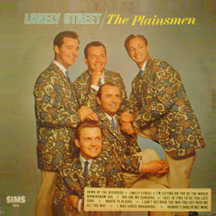 |
SIMS Records / 104 (all country / pop project) |
TOUCH THE HAND OF THE LORD - THE PLAINSMEN |
|
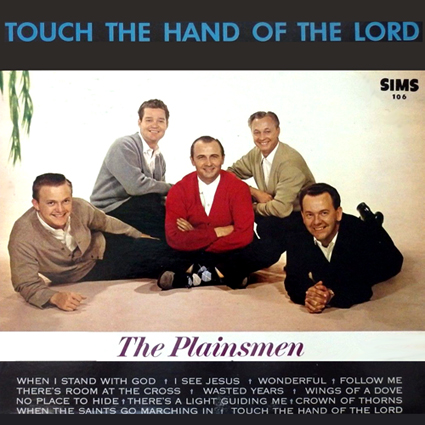 |
SIMS Records / 106 (same song list as the Century Records pressing) |
BIRMINGHAM JAIL - THE PLAINSMEN |
|
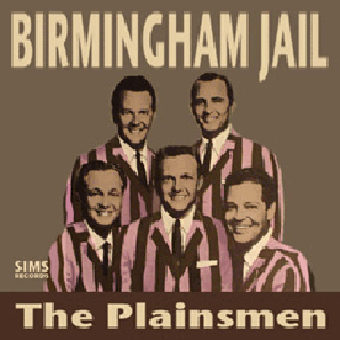 |
SIMS Records / project number? (released 1963?) |
THE PLAINSMEN QUARTET SING SOFTLY AND TENDERLY! |
|
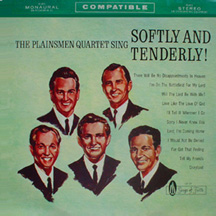 |
Songs of Faith Records / SOF 109 (released c. late-1963?) (Side note... a 45 from this album of "On The Battlefield" was also released on the Songs Of Faith label.) |
CD VERSIONS OF "SOFTLY AND TENDERLY" PROJECT RELEASED POST-GROUP |
|
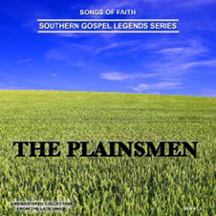 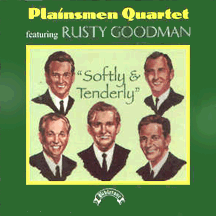 |
----------------------------------------------------------------------------------------------------------------------------------------------------------------------------------------------Song of Faith / SOF 413 (2007) ----------------------------------------------------------------------------------------------------------------------------------------------------------------------------------------------------------------------------------------------------------------------------------------------------------------------------------------------------------------------------------------------------------------------------------------------------------------------------------------------------------------------------------------------------------------------------------------------------------------------------------------------------------------------------------------------------------------------------------------------------------------------------------------------------------------------------------------------------Bibletone Records / National Recording Corporation ------------------------------------------------------------- |
THE PLAINSMEN GO HEART WARMING |
|
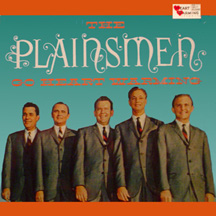 |
Heart Warming Records / LPS 1760 Stereo / LPHF 1761 High Fidelity |
PLAINSMEN QUARTET NEW AND OLD GOSPEL SONGS |
|
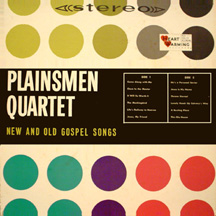 |
Heart Warming / LPS 1792 Stereo / LPHF 1793 High Fidelity |
THE PLAINSMEN - WHEN I STAND WITH GOD |
|
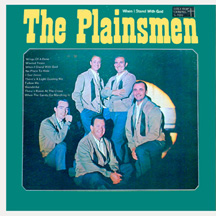 |
Hilltop Gospel Records (a product of Pickwick International, NY) GS-7003 |
ILLUSTRATED COVER VERSION OF THE "WHEN I STAND WITH GOD" ALBUM |
|
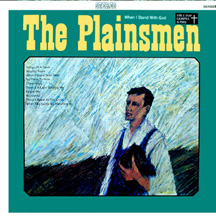 |
Hilltop Gospel Records (a product of Pickwick International, NY) GS-7003 ------------------- |
THE PLAINSMEN QUARTET SINGS SONGS OF INSPIRATION |
|
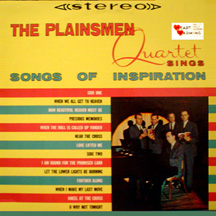 |
Heart Warming / LPS 1798 Stereo / LPHF 1799 High Fidelity |
WONDERFUL TIME UP THERE - PLAINSMEN QUARTET |
|
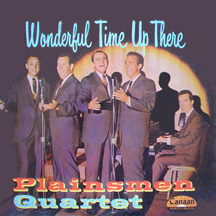 |
Canaan Records / CA-4600-LP / CAS-9600-LP (May,1965) |
THE PLAINSMEN QUARTET - LITTLE IS MUCH |
|
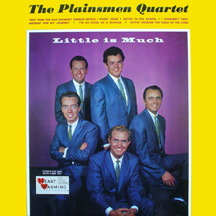 |
Heart Warming / LPS 1836 Stereo / LPHF 1837 High Fidelity |
THE PLAINSMEN - SINGING FRESH AND NEW |
|
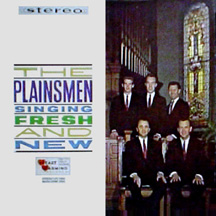 |
Heart Warming / LPS 1864 Stereo / LPHF 1865 High Fidelity |
THE PLAINSMEN QUARTET - VOLUME ONE |
|
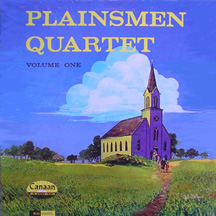 |
Canaan Records / CAS-9611-LP (1966) |
THE PLAINSMEN QUARTET - VOLUME TWO |
|
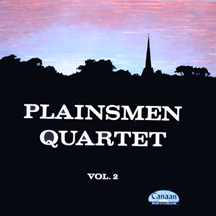 |
Canaan Records / CA-4612-LP (1966) |
THE PLAINSMEN - WILL THE CIRCLE BE UNBROKEN |
|
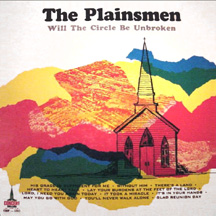 |
Concert (a subsidery of Heart Warming Records) CHF-1211 |
THE MARKSMEN - COWBOY CAMP MEETING IN THE SKY |
|
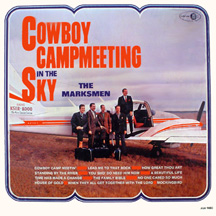 |
Jubilee Records / JG 9001 |
THE MARKSMEN - GOSPEL TODAY |
|
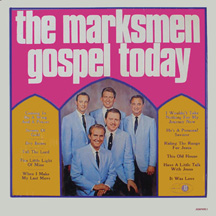 |
Jubilee Records / JG 9003 |
THE PLAINSMEN - JUST A LITTLE TALK WITH JESUS |
|
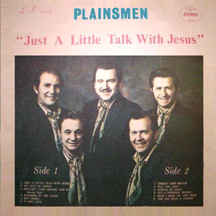 |
Custom pressing / LP-003 |
THE PLAINSMEN SING INSPIRATIONAL SONGS |
|
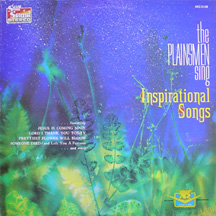 |
Altair Records / AKC-S108 (c.1969) |
RE-RELEASE OF "THE PLAINSMEN SING INSPIRATIONAL SONGS" - CHANGED COVER |
|
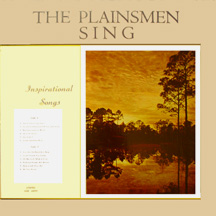 |
USR 4899 - STEREO - Produced by Gene Humphrey - Remix Engineer, Dale Davis NOTE: this version released shorty after Thurman Bunch's return to the group in December, 1971. The front of the album jacket is found in two forms. One version has no song titles listed , and the other version has a separate white piece of paper, with printed titles, affixed as shown. ------------------- |
PLAINSMEN - HE’S THE LILLY OF THE VALLEY |
|
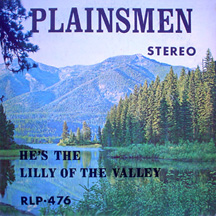 |
Rimrock Records (Wayne Raney’s label in Concord, AR) RLP-476 Stereo (c.1970-71) |
THE PLAINSMEN |
|
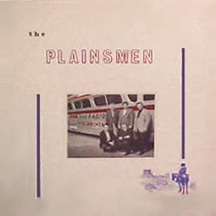 |
Lee Mac Records / LP-002 (all-country project - back cover b&w photo of the Plainsmen gathered around Mack Sanders who is seated, holding a guitar) |
SECOND COVER VERSION OF Lee Mac Records / LP-002 |
|
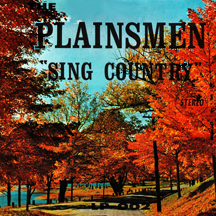 |
This issue includes different copy on cover... PLAINSMEN "SING COUNTRY" and features a b&w photo of the group, sans Mack Sanders, on back cover, with backliner notes by Harry "Hap" Peeples, director of the Country Music Association (CMA)------------------- |
THE PLAINSMEN IN GOSPEL COUNTRY |
|
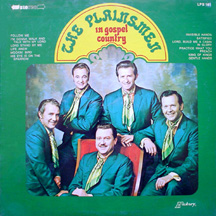 |
Hickory Records / LPS 161 (recorded December, 1971 Acuff-Rose Sound Studio, Nashville, TN released in 1972) |
THE PLAINSMEN - BOTH SIDES OF THE PLAINSMEN |
|
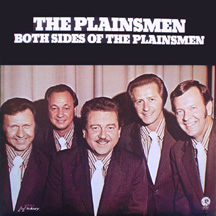 |
Hickory Records (manufactured and distributed by MGM Records) H3G4513 |
PLAINSMEN SING YOUR REQUEST |
|
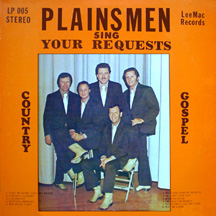 |
Lee Mac Records / LP-005 (country & gospel) |
THE PLAINSMEN SING ALL TIME HITS |
|
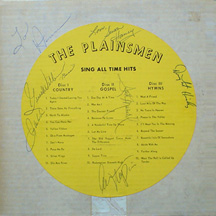 |
Lee Mac Records (three record set) |
THE PLAINSMEN |
|
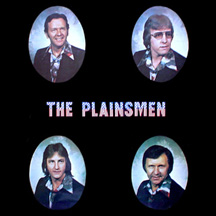 |
Custom project - NR7226 (country & gospel - c.1976 - Las Vegas era, post-Easmon Napier, pre-Nashville relocation) c/o Mac Sanders Productions / Wichita, KS Medley: Rinestone Cowboy • Crazy Arms • I’m So Lonesome I Could Cry • Behind Closed Doors • I’m Movin’ On • Every Time I Feel the Spirit • His Hand in Mine • Scars in the Hands of Jesus • Till the Last Leaf Shall Fall • Sunrise |
THE PLAINSMEN - GOOD OLE BOYS |
|
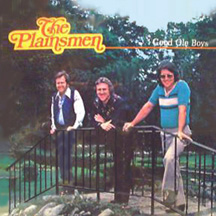 |
Pilot Records (in-house label) - NR10795 - c. late 1979 |
COUNTRY ROADS - THE PLAINSMEN |
|
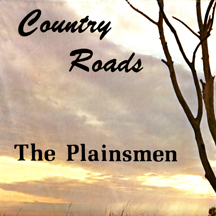 |
Pilot Records - 12153 - c. early 1980 |
PLAINSMEN GOLD - VOLUME ONE |
|
 --------------- --------------- |
(collection of previously recorded material) |
PLAINSMEN GOLD - VOLUME TWO |
|
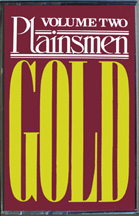 --------------- --------------- |
(collection of previously recorded material) |
THE PLAINSMEN LIVE! |
|
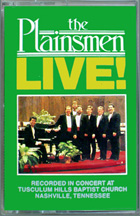 --------------- --------------- |
(recorded November 19, 1989 at Tusculum Hills Baptist Church, Nashville, Tennessee - released January, 1990) |
THE PLAINSMEN - CAUGHT UP |
|
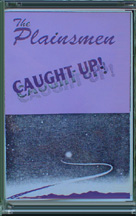 --------------- --------------- |
(recorded mid-1990 at the Oak Ridge Boys studio on Rockland Road in Hendersonville, TN sessions started by one group line-up, and finished by another line-up of members) |
THE PLAINSMEN - MOVIN’ UP TO GLORYLAND |
|
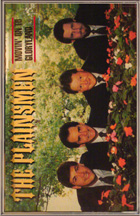 --------------- --------------- |
Morning Star Legend Series / MCS-4147 (1992) |
THE PLAINSMEN SING GOLDEN GOSPEL CLASSICS |
|
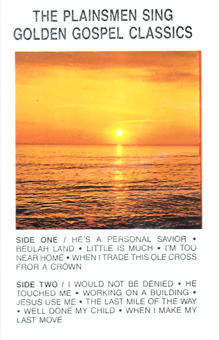 --------------- --------------- |
In-house produced cassette tape created after Jack Mainod relocated to Alabama (released 1994) |
THE PLAINSMEN QUARTET - GOSPEL SOUNDS - CD |
|
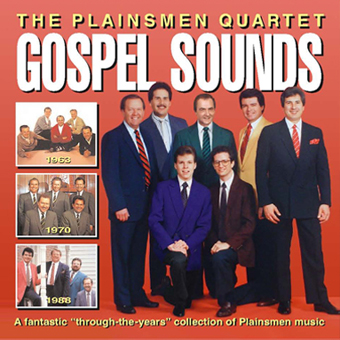 |
NURI Records - N3928CD - November, 2013 |
THE PLAINSMEN QUARTET - COUNTRY SOUNDS - CD |
|
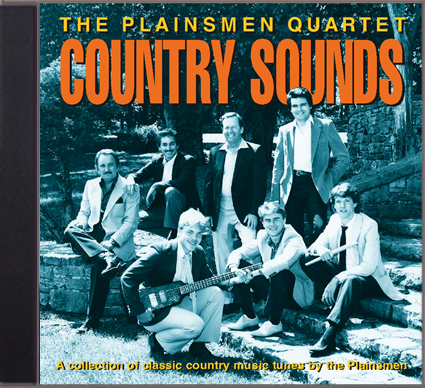 |
NURI Records - N3930CD - November, 2013 |
78s & 45sSTAMPS QUARTET MUSIC CO., INC. |
|
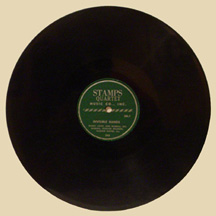
|
"Green Label" pre-Plainsmen series (Note: some of the records in this "green label" series were not only pressed with the dark green label, but were also re-pressed with a brighter kelly green label featuring a different font, and some of the 78 rpm singles, in the series were also were pressed in a 45 rpm version with an off-white label) Harley Lester - Don Randall - Bill Randall - Howard Welborn - Easmon Napier, Acc. SM-1 You Ain't Got Faith - I Believe in The Man |
THE PLAINSMEN |
|
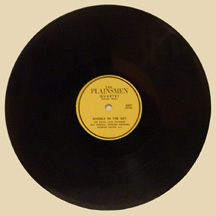 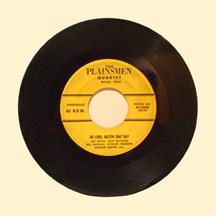 |
"Yellow Label" series (Note: this series of custom pressed singles are found in both 78 rpm and 45 rpm formats and date from c. late 1956 - 1957. It has not been confirmed that every single in the series was released in both formats, but some examples do exist.) Joe Davis - Jack Mainord - Bill Randall - Howard Welborn - Easmon Napier, Acc. 3001 (78 rpm) He's A Personal Savior - I've Been With JesusPlainsmen----3002 (78 rpm)Heavenly Love - Tell My Friends |
INSPIRED MELODIES BY THE PLAINSMEN |
|
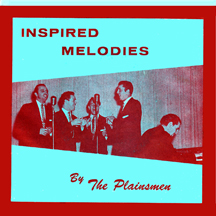 |
Plainsmen label - 812 N. Marsalis Dallas, TX - c. Dec. 1957 to early 1958 Howard Welborn, Jack Mainord, Rusty Goodman, Joe B. Davis, Easmon Napier Tp 502 “Inspired Melodies” (an ep - extended play) Tp 501 (45 rpm single) I'm Bound for That City - Up Above My Head |
THE PLAINSMEN - FRIENDSHIP ALBUM |
|
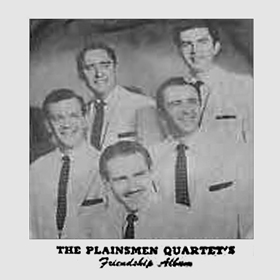 |
(Not a standard long play album, but rather a 45 rpm EP - extended play) |
THE PLAINSMEN |
|
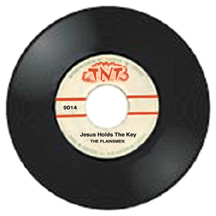 |
(45 rpm) |
|
||||
THE PLAINSMEN |
|
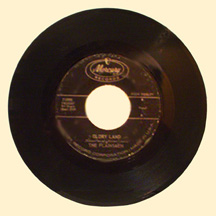 |
(45 rpm) Note: also pressed with black type and Mercury logo on white label with record number 71999 YW23381 - promotional record--------------------------------------------------- |
THE PLAINSMEN |
|
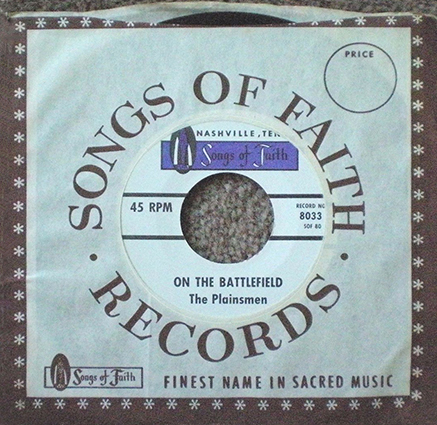 |
(45 rpm) |
THE PLAINSMEN |
|
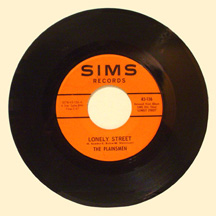 |
(45 rpm) |
THE PLAINSMEN |
|
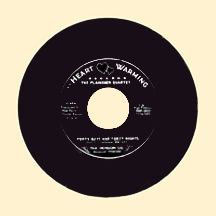 |
(45 rpm) |
THE PLAINSMEN |
|
 |
(45 rpm) |
THE MARKSMEN |
|
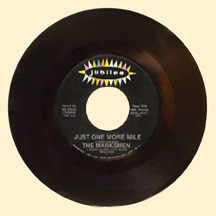 |
(45 rpm) Note: also pressed with black type and Jubilee logo on white label with record number 45-9017 - advance release disc-jockey record, not for sale |
THE PLAINSMEN |
|
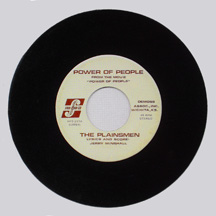 |
(45 rpm) |
THE PLAINSMEN |
|
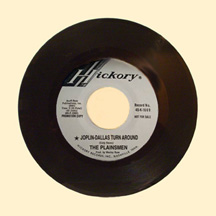 |
(45 rpm) |
THE PLAINSMEN |
|
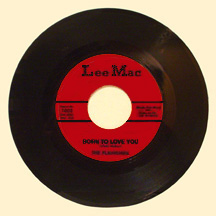 |
(45 rpm) |
THE PLAINSMEN |
|
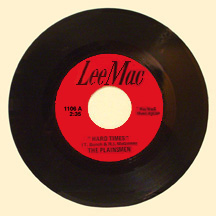 |
(45 rpm) |
THE PLAINSMEN |
|
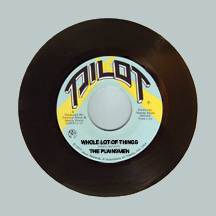 |
(45 rpm) |
THE PLAINSMEN |
|
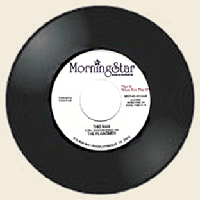 |
(45 rpm) |
THE PLAINSMEN |
|
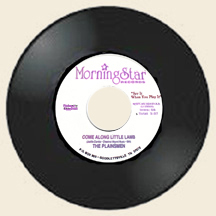 |
(45 rpm) |
COMPILATIONS WITH PLAINSMEN CUTSWALLY FOWLER PRESENTS - ALL-NIGHT SINGING
|
|
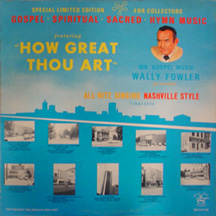 |
(various artists comp.) |
WALLY FOWLER PRESENTS - ALL-NIGHT SINGING
|
|
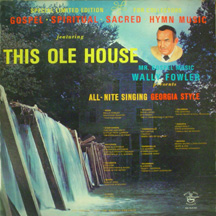 |
(various artists comp.) |
15TH ANNIVERSARY - WALLY FOWLER’S
|
|
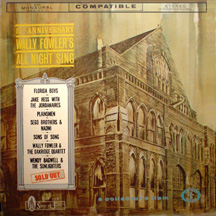 |
(various artists compilation) |
HAP PEEBLES PRESENTS COUNTY MUSIC U.S.A. |
|
 |
(various artists compilation) |
SING ALL NIGHT |
|
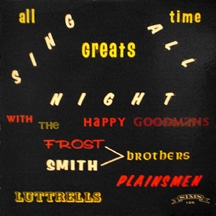 |
(various artists compilation) |
SINGING THE GOSPEL |
|
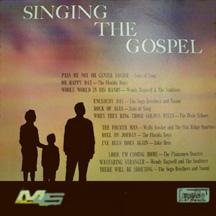 |
(various artists compilation) |
GOSPEL AND SACRED FAVORITES |
|
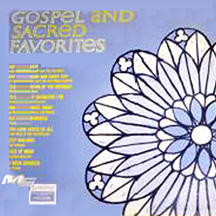 |
(various artists compilation) |
FAVORITE GOSPEL QUARTETS |
|
|
(various artists compilation) |
|
GOSPEL HARVEST |
|
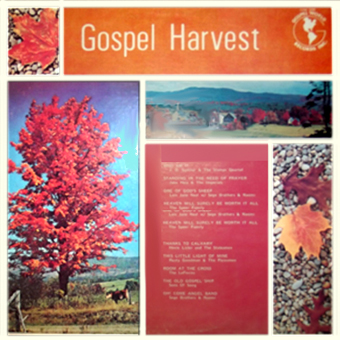 |
(various artists compilation) |
BELOVED HYMNS |
|
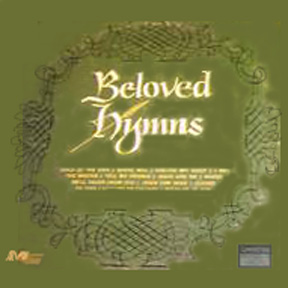 |
(various artists compilation) --------------------------------------------------------- |
PRECIOUS MEMORIES OF SACRED HYMNS |
|
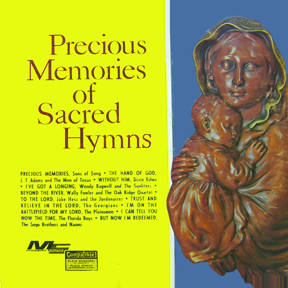 |
(various artists compilation) --------------------------------------------------------- |
THE OLD RUGGED CROSS |
|
|
(various artists compilation) |
|
HYMNS YOU LOVE |
|
|
(various artists compilation) |
|
GREAT GOSPEL QUARTETS |
|
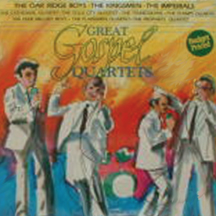 |
(various artists compilation) |
MORE GREAT GOSPEL QUARTETS |
|
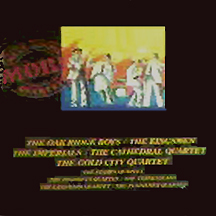 |
(various artists compilation) |
14 ALL-TIME FAVORITE SPIRITUALS |
|
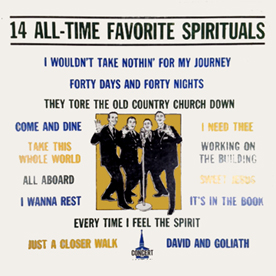 |
(various artists compilation) |
GOSPEL CONCERT - VOL 1 |
 |
(various artists compilation) |
THE GREAT QUARTETS SING THE GOSPEL - VOL. 2 |
|
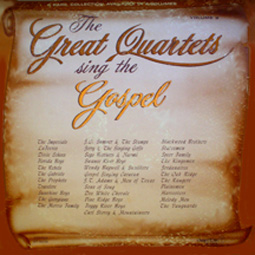 |
Gospel Time - GT 5036 |
GOSPEL SUNG BY THE GREAT QUARTETS - VOL. 2 |
|
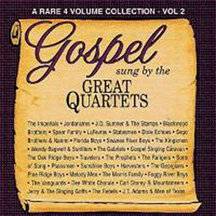 |
CD format (GTCD-5036) re-issue of earlier project with title modification, volume two of Gospel Time four volume set. It should be noted that the series was also offed in audio cassette format (GTC-5036) |
LATER COVER VERSION |
|
 |
Gospel Time ----------------------------------------------------------------------------------------- |
200 YEARS OF GOSPEL MUSIC - VOL. 1 |
|
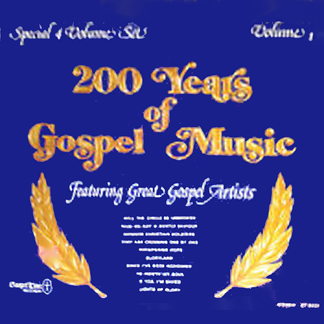 |
Gospel Time Records - GT5031 |
LOUISIANA HAYRIDE - VOL. 1 & 2 |
|
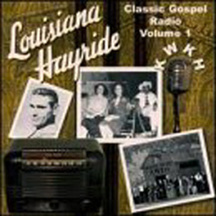 |
Music Mill (released in 2 cover styles - most recent 2006) |
2006 COVER VERSION |
|
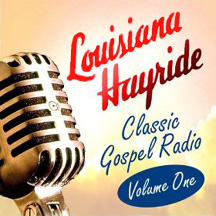 |
Music Mill ----------------------------------------------------------------------------------------- |
WORLD’S MOST BELOVED HYMNS - VOL. 1 |
|
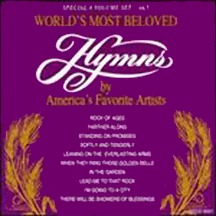 |
(various artists compilation) |
ALTERNATE COVER DESIGN |
|
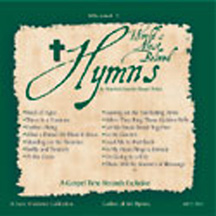 |
Music Incorporated -------------------------------------------------------------------------------- |
WORLD’S MOST BELOVED HYMNS - VOL. 1 Gospel Time Records version |
|
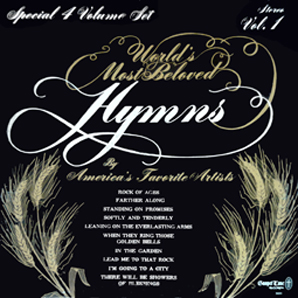 |
(various artists compilation) |
WORLD’S MOST BELOVED HYMNS - VOL. 3 Gospel Time Records version |
|
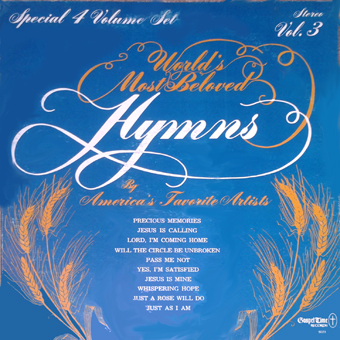 |
(various artists compilation) |
200 GOLDEN YEARS OF GOSPEL MUSIC - VOL. 1 |
|
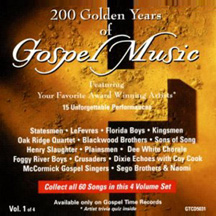 |
(various artists compilation) |
GREAT MOMENTS OF GOSPEL MUSIC |
|
 |
(various artists compilation) |
GOSPEL’S GREATEST MOMENTS Classic Gospel version |
|
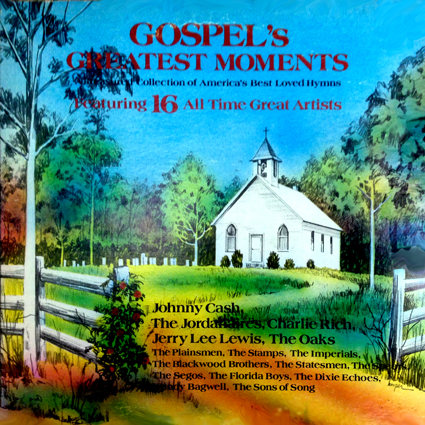 |
(various artists compilation) |
GOSPEL’S GREATEST MOMENTS Gospel Time Records version |
|
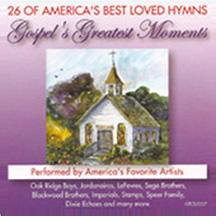 |
(various artists compilation) |
DADDY SANG BASS |
 |
(various artists compilation) |
GOSPEL MUSIC HALL OF FAME - VOL II (no cover pic available)---------------------------------------------(various artists comp.) Big Gospel / 200 - Amazing Grace |
TRIBUTE TO HANK WILLIAMS Compact Disc format |
|
 |
(various artists compilation) |
WORLD’S MOST BELOVED HYMNS - VOL. 1 8 Track version |
|
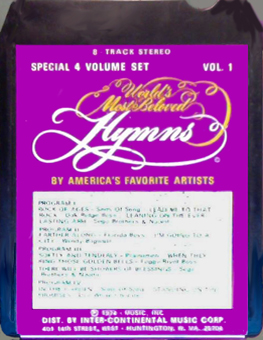 |
(various artists compilation) |
Please note that the above listing may not be all inclusive. Additional compilations may be encountered. |
MISCELLANEOUS BACKUP & GUEST PROJECTSSOMEONE WATCHING OVER YOU -
|
|
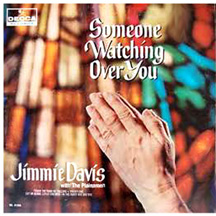 |
DECCA Records / SL 4186 |
SHIP AHOY - TOMMY DREWETT -
|
|
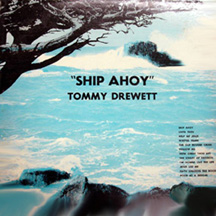 |
Custom project (1964) |
BACK OF ALBUM JACKET |
|
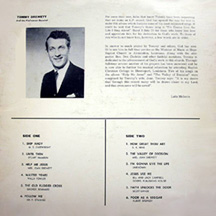 |
Reference to the Plainsmen only appears on the back panel. -------------------- (Side note... Tommy Drewett actually filled-in on tenor with the Plainsmen for two or three dates.) |
RIDING THE RANGE FOR JESUS - LEO CASTLEBERRY -
|
|
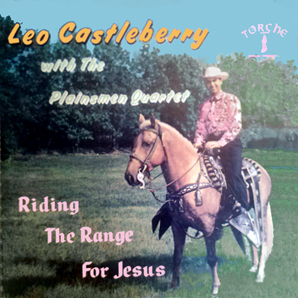 |
Torche Records - Hot Springs, AR (mid-60s) - 90325 (Side note... a four song 45 EP from this album was also released on the Torche label.) |
MACK SANDERS AND HIS FRIENDS |
|
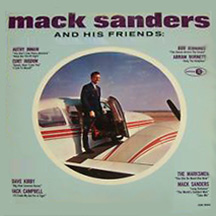 |
Jubilee Records / JGM-9002 (1966) (Side note... Mack Sanders owned and flew his own twin-engine plane for many years.)------- |
BIG COUNTRY - PLAINSMEN & MACK SANDERS |
|
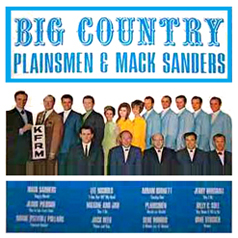 |
Custom project for KFRM radio road shows (Side note... this project also contains Jerry Minshall Trio material.)-------------- |
JOHNNY HORTON - NORTH TO ALASKA -
|
|
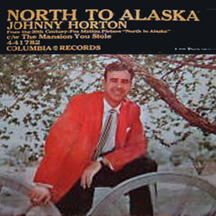 |
From the 1960 Twentieth Century-Fox Motion Picture, JOHNNY HORTON - (single) JOHNNY HORTON - (single) JOHNNY HORTON’S GREATEST HITS - (collection) JOHNNY HORTON ON STAGE THE LEGENDARY JOHNNY HORTON - (collection) THE WORLD OF JOHNNY HORTON - (various artists compilation) THE JOHNNY HORTON COLLECTION 24 MILLIONEN ERFOLGE 3 - (various artists compilation) AMERICA REMEMBERS JOHNNY HORTON - (collection) AMERICAN ORIGINALS - JOHNNY HORTON - (collection) JOHNNY HORTON 1956 - 1960 - (collection) THE JOHNNY HORTON LEGEND - (collection) GRAND OLD COUNTRY - (various artists compilation) TOP STARS & HITS VOL. 2 - (various artists compilation) THE GOLDEN AGE OF COUNTRY MUSIC - (various artists compilation box set) COLUMBIA COUNTRY CLASSICS VOL. 1 - (various artists compilation) CHARTBREAKER CD MUSIC LIBRARY - (various artists compilation CD) COUNTY STARS - (various artists compilation CD) |
DVD & VHS RELATED PRODUCTSTHE PLAINSMEN LIVE! |
|
 ------------- ------------- |
(recorded November 19, 1989 at Tusculum Hills Baptist Church, Nashville, Tennessee - released January, 1990 as a VHS) |
THE PLAINSMEN - MOVIN’ UP TO GLORYLAND |
|
 ------------- ------------- |
Morning Star Legend Series (1992) Eddie Crook Company |
RUSTY GOODMAN & THE PLAINSMEN |
|
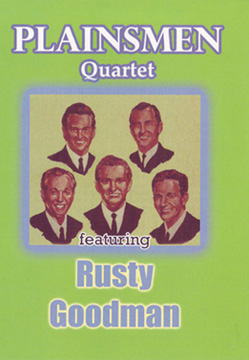 ------------- ------------- |
The Gospel Music Hall of Fame Video Library Series - Volume 4 |
RUSTY GOODMAN & THE PLAINSMEN |
|
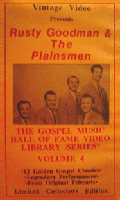 ------------- ------------- |
Vintage Video - Limited Collectors Edition - Volume 4 |
YESTERDAY IN GOSPEL MUSIC - PLAINSMEN |
|
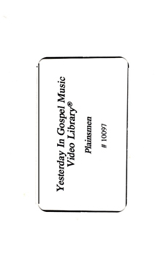 ------------- ------------- |
Video Library Series - #10097 - Wally Fowler Shows Thurman Bunch, Jack Mainord, Howard Welborn, Rusty Goodman, & Larry Denim Cowboy Camp Meeting - Wonderful - No Place to Hide - Love Like The Love of God - Crown of Thorns - He Knows What I Need - I'll Tell It - Follow Me - I Would Not Be Denied - Beyond the Sunset - On the Battlefield |
GRAND OLE GOSPEL - REUNION 1993 |
|
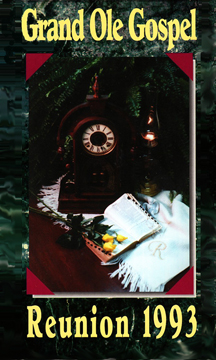 ------------- ------------- |
A video compilation of various groups, including the Plainsmen, comprised of former members. Mike LoPrenzi, Jack Mainord, Howard Welborn, Jay Simmons, Eddie Crook Standing by the River Sweet Jesus (Jerry Redd solo) |
GRAND OLE GOSPEL - REUNION 1994 |
|
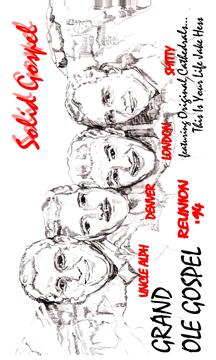 ------------- ------------- |
A video compilation of various groups, including the Plainsmen, comprised of former members. Jerry Redd, Jack Mainord, Howard Welborn, Jay Simmons, Eddie Crook I'm Poor as a Beggar They Tore the Old Country Church Down |
GRAND OLE GOSPEL - REUNION 1995 |
|
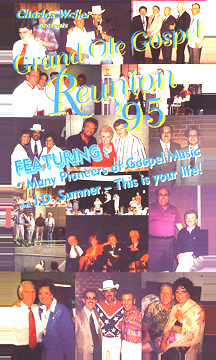 ------------- ------------- |
A video compilation of various groups, including the Plainsmen, comprised of former members. Jerry Redd, Jack Mainord, Howard Welborn, (bass fill-in, Charlie Gilmore), with Eddie Crook on piano No Place to Hide You Can Have Him |
GOSPEL VIDEO CLASSICS |
|
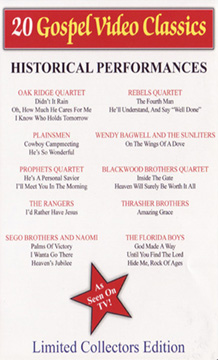 ------------- ------------- |
(series of compilations by various artists) |
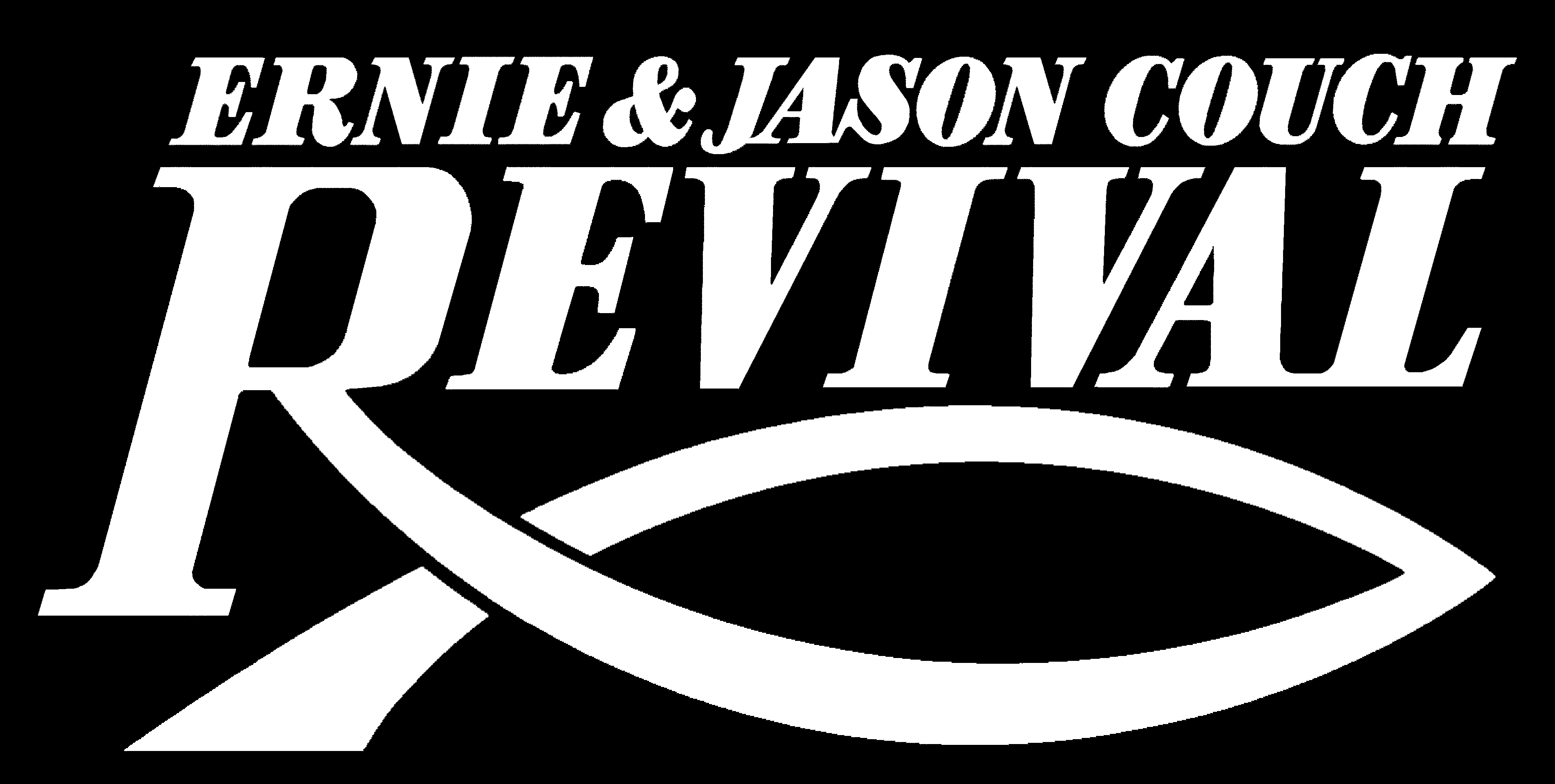
|
Keep-up with Ernie and Jason on the Ernie Couch & Revival Facebook page
E-mail: revival@erniecouchandrevival.com |
© Copyright 2011, 2013, 2015, 2017 by Ernie Couch & Jason Couch, Nashville, TN |
